
2015 Abha mosque bombing
The 2015 Abha mosque bombing occurred on 6 August 2015, when a suicide bomb attack killed 17 people at a mosque in the south-western Saudi Arabian city of Abha.
A suicide bomb attack kills at least 15 people at a mosque in the Saudi city of Abha.

The 2015 Abha mosque bombing occurred on 6 August 2015, when a suicide bomb attack killed 17 people at a mosque in the south-western Saudi Arabian city of Abha.

Abha is the capital of 'Asir Region in Saudi Arabia, with a population of 1,093,705 as of 2021. It is situated 2,270 metres above sea level in the fertile Asir Mountains of south-western Saudi Arabia, near Asir National Park. Abha's mild climate makes it a popular tourist destination for Saudis. Saudis also call the city the Bride of Mountain due to its position above the sea.
An explosion in Rosario, Argentina, caused by a large gas leak collapsed a nearby building and led to the deaths of 22 people.

A gas explosion caused by a large gas leak occurred in a residential area of Rosario, the third-largest city in Argentina, on August 6, 2013. A nearby building collapsed, and others were at high risk of structural failure. Twenty-two people died, and sixty were injured. Several organizations helped secure the area, search for survivors and aid people who lost their homes. Shortly after the explosion, the time needed for reconstruction was estimated at six months.

Rosario is the largest city in the central Argentine province of Santa Fe. The city is located 300 km (186 mi) northwest of Buenos Aires, on the west bank of the Paraná River. Rosario is the third-most populous city in the country, and is also the most populous city in Argentina that is not a capital. With a growing and important metropolitan area, Greater Rosario has an estimated population of 1,750,000 as of 2020. One of its main attractions includes the neoclassical, Art Nouveau, and Art Deco architecture that has been retained over the centuries in hundreds of residences, houses and public buildings.
NASA's Curiosity rover lands on the surface of Mars.

The National Aeronautics and Space Administration is an independent agency of the US federal government responsible for the civil space program, aeronautics research, and space research.

Curiosity is a car-sized Mars rover designed to explore the Gale crater on Mars as part of NASA's Mars Science Laboratory (MSL) mission. Curiosity was launched from Cape Canaveral (CCAFS) on November 26, 2011, at 15:02:00 UTC and landed on Aeolis Palus inside Gale crater on Mars on August 6, 2012, 05:17:57 UTC. The Bradbury Landing site was less than 2.4 km (1.5 mi) from the center of the rover's touchdown target after a 560 million km (350 million mi) journey.

Mars Science Laboratory (MSL) is a robotic space probe mission to Mars launched by NASA on November 26, 2011, which successfully landed Curiosity, a Mars rover, in Gale Crater on August 6, 2012. The overall objectives include investigating Mars' habitability, studying its climate and geology, and collecting data for a human mission to Mars. The rover carries a variety of scientific instruments designed by an international team.

Mars is the fourth planet from the Sun and the second-smallest planet in the Solar System, only being larger than Mercury. In the English language, Mars is named for the Roman god of war. Mars is a terrestrial planet with a thin atmosphere, and has a crust primarily composed of elements similar to Earth's crust, as well as a core made of iron and nickel. Mars has surface features such as impact craters, valleys, dunes and polar ice caps. It has two small and irregularly shaped moons, Phobos and Deimos.
A series of riots broke out in several London boroughs and in cities and towns across England in response to the shooting of Mark Duggan by Metropolitan Police officers.

The 2011 England riots, more widely known as the London riots, were a series of riots between 6 and 11 August 2011. Thousands of people rioted in cities and towns across England, which saw looting, arson, as well as mass deployment of police and the deaths of five people.
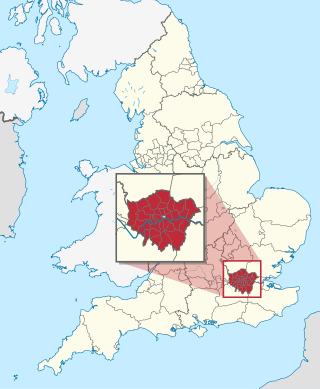
The London boroughs are the 32 local authority districts that together with the City of London make up the administrative area of Greater London; each is governed by a London borough council. The present London boroughs were all created at the same time as Greater London on 1 April 1965 by the London Government Act 1963 and are a type of local government district. Twelve were designated as Inner London boroughs and twenty as Outer London boroughs. The City of London, the historic centre, is a separate ceremonial county and sui generis local government district that functions quite differently from a London borough. However, the two counties together comprise the administrative area of Greater London as well as the London Region, all of which is also governed by the Greater London Authority.

Mark Duggan, a 29-year-old black British man, was shot dead by police in Tottenham, North London on 4 August 2011. The Metropolitan Police stated that officers were attempting to arrest Duggan on suspicion of planning an attack and that he was in possession of a handgun. Duggan died from a gunshot wound to the chest. The circumstances of Duggan's death resulted in public protests in Tottenham, which led to conflict with police and escalated into riots across London and other English cities.

The Metropolitan Police Service (MPS), formerly and still commonly known as the Metropolitan Police, is the territorial police force responsible for law enforcement and the prevention of crime in Greater London. In addition, the Metropolitan Police is also responsible for some specialised matters throughout the United Kingdom; these responsibilities include co-ordinating and leading national counter-terrorism measures and the personal safety of specific individuals, such as the Monarch and other members of the Royal Family, members of the Government, and other officials.
War in Afghanistan: A United States military helicopter is shot down, killing 30 American special forces members and a working dog, seven Afghan soldiers, and one Afghan civilian. It was the deadliest single event for the United States in the War in Afghanistan.

The War in Afghanistan (2001-2021) was an armed conflict that began when an international military coalition led by the United States launched an invasion of Afghanistan, toppling the Taliban-ruled Islamic Emirate and establishing the internationally recognized Islamic Republic three years later. The conflict ultimately ended with the 2021 Taliban offensive, which overthrew the Islamic Republic, and re-established the Islamic Emirate. It was the longest war in the military history of the United States, surpassing the length of the Vietnam War (1955–1975) by approximately six months.

On 6 August 2011, a U.S. CH-47D Chinook military helicopter operating with the call sign Extortion 17 was shot down while transporting a Quick Reaction Force attempting to reinforce a Joint Special Operations Command unit of the 75th Ranger Regiment in the Tangi Valley in Maidan Wardak province, southwest of Kabul, Afghanistan.
Flash floods, mudslides, and debris flows across the Ladakh region of Indian-administered Kashmir left at least 255 people dead.

The 2010 Ladakh floods occurred on 6 August 2010 across a large part of Ladakh, then part of the state of Jammu and Kashmir. 71 towns and villages were damaged, including the main town in the area, Leh. At least 255 people are reported to have died, six of whom were foreign tourists, after a cloudburst and heavy overnight rains triggered flash floods, mudflows, and debris flows. 200 people were reported missing in the initial aftermath of the storm, and thousands more were rendered homeless after the flooding caused extensive damage to property and infrastructure. Overall, 9000 people were directly affected by the event.

A mudflow or mud flow is a form of mass wasting involving fast-moving flow of debris that has become liquified by the addition of water. Such flows can move at speeds ranging from 3 meters/minute to 5 meters/second. Mudflows contain a significant proportion of clay, which makes them more fluid than debris flows, allowing them to travel farther and across lower slope angles. Both types of flow are generally mixtures of particles with a wide range of sizes, which typically become sorted by size upon deposition.

Debris flows are geological phenomena in which water-laden masses of soil and fragmented rock rush down mountainsides, funnel into stream channels, entrain objects in their paths, and form thick, muddy deposits on valley floors. They generally have bulk densities comparable to those of rock avalanches and other types of landslides, but owing to widespread sediment liquefaction caused by high pore-fluid pressures, they can flow almost as fluidly as water. Debris flows descending steep channels commonly attain speeds that surpass 10 m/s (36 km/h), although some large flows can reach speeds that are much greater. Debris flows with volumes ranging up to about 100,000 cubic meters occur frequently in mountainous regions worldwide. The largest prehistoric flows have had volumes exceeding 1 billion cubic meters. As a result of their high sediment concentrations and mobility, debris flows can be very destructive.

Ladakh is a region administered by India as a union territory which constitutes a part of the larger Kashmir region and has been the subject of dispute between India, Pakistan, and China since 1947. Ladakh is bordered by the Tibet Autonomous Region to the east, the Indian state of Himachal Pradesh to the south, both the Indian-administered union territory of Jammu and Kashmir and the Pakistan-administered Gilgit-Baltistan to the west, and the southwest corner of Xinjiang across the Karakoram Pass in the far north. It extends from the Siachen Glacier in the Karakoram range to the north to the main Great Himalayas to the south. The eastern end, consisting of the uninhabited Aksai Chin plains, is claimed by the Indian Government as part of Ladakh, and has been under Chinese control since 1962.
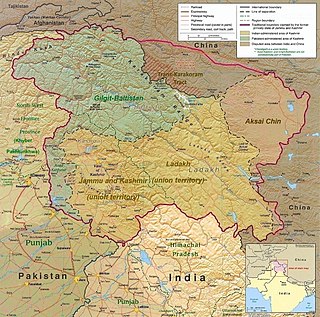
Kashmir is the northernmost geographical region of the Indian subcontinent. Until the mid-19th century, the term "Kashmir" denoted only the Kashmir Valley between the Great Himalayas and the Pir Panjal Range. Today, the term encompasses a larger area that includes the Indian-administered territories of Jammu and Kashmir and Ladakh, the Pakistani-administered territories of Azad Kashmir and Gilgit-Baltistan, and the Chinese-administered territories of Aksai Chin and the Trans-Karakoram Tract.
Flash floods across a large part of Jammu and Kashmir, India, damages 71 towns and kills at least 255 people.

The 2010 Ladakh floods occurred on 6 August 2010 across a large part of Ladakh, then part of the state of Jammu and Kashmir. 71 towns and villages were damaged, including the main town in the area, Leh. At least 255 people are reported to have died, six of whom were foreign tourists, after a cloudburst and heavy overnight rains triggered flash floods, mudflows, and debris flows. 200 people were reported missing in the initial aftermath of the storm, and thousands more were rendered homeless after the flooding caused extensive damage to property and infrastructure. Overall, 9000 people were directly affected by the event.

Jammu and Kashmir was a region formerly administered by India as a state from 1952 to 2019, constituting the southern and southeastern portion of the larger Kashmir region, which has been the subject of a dispute between India, Pakistan and China since the mid-20th century. The underlying region of this state were parts of the former princely state of Jammu and Kashmir, whose western districts, now known as Azad Kashmir, and northern territories, now known as Gilgit-Baltistan, are administered by Pakistan. The Aksai Chin region in the east, bordering Tibet, has been under Chinese control since 1962.
Mauritanian President Sidi Mohamed Ould Cheikh Abdallahi was ousted from power by a group of high-ranking generals that he had dismissed from office several hours earlier.
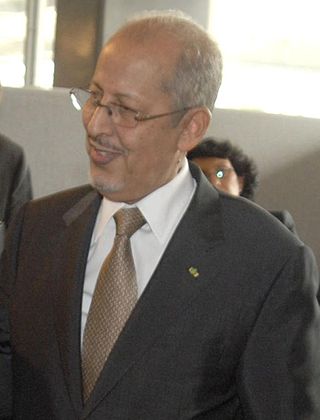
Sidi Mohamed Ould Cheikh Abdallahi was a Mauritanian politician who was President of Mauritania from 2007 to 2008. He served in the government during the 1970s, and after a long period of absence from politics he won the March 2007 presidential election, taking office on 19 April 2007. He was deposed in a military coup d'état on 6 August 2008.
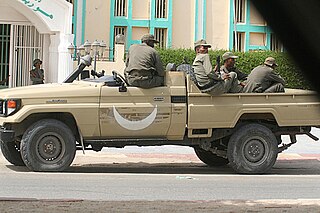
The 2008 Mauritanian coup d'état was a military coup that took place in Mauritania on August 6, 2008, when President Sidi Ould Cheikh Abdallahi was ousted from power by the Armed Forces of Mauritania, led by a group of high-ranking generals he had dismissed from office earlier that day.
A military junta led by Mohamed Ould Abdel Aziz stages a coup d'état in Mauritania, overthrowing president Sidi Ould Cheikh Abdallahi.

Mohamed Ould Abdel Aziz is a former Mauritanian politician who was the 8th President of Mauritania, in office from 2009 to 2019. A career soldier and high-ranking officer, he was a leading figure in the August 2005 coup that deposed President Maaouya Ould Sid'Ahmed Taya, and in August 2008 he led another coup, which toppled President Sidi Ould Cheikh Abdallahi. Following the 2008 coup, Abdel Aziz became President of the High Council of State as part of what was described as a political transition leading to a new election. He resigned from that post in April 2009 in order to stand as a candidate in the July 2009 presidential election, which he won. He was sworn in on 5 August 2009. He was subsequently re-elected in 2014, then did not seek re-election in 2019. He was succeeded by Mohamed Ould Ghazouani, who assumed office on 1 August 2019.

The 2008 Mauritanian coup d'état was a military coup that took place in Mauritania on August 6, 2008, when President Sidi Ould Cheikh Abdallahi was ousted from power by the Armed Forces of Mauritania, led by a group of high-ranking generals he had dismissed from office earlier that day.

Mauritania, officially the Islamic Republic of Mauritania, is a sovereign country in West Africa. It is bordered by the Atlantic Ocean to the west, Western Sahara to the north and northwest, Algeria to the northeast, Mali to the east and southeast, and Senegal to the southwest. Mauritania is the 11th-largest country in Africa and the 28th-largest in the world, and 90% of its territory is situated in the Sahara. Most of its population of 4.4 million lives in the temperate south of the country, with roughly one-third concentrated in the capital and largest city, Nouakchott, located on the Atlantic coast.

Sidi Mohamed Ould Cheikh Abdallahi was a Mauritanian politician who was President of Mauritania from 2007 to 2008. He served in the government during the 1970s, and after a long period of absence from politics he won the March 2007 presidential election, taking office on 19 April 2007. He was deposed in a military coup d'état on 6 August 2008.
Erwadi fire incident: Twenty-eight mentally ill persons tied to a chain are burnt to death at a faith based institution at Erwadi, Tamil Nadu.

The 2001 Erwadi fire incident was an accident that occurred on 6 August 2001, when 28 inmates of a faith-based mental asylum died in the fire. All these inmates were bound by chains at the Moideen Badusha Mental Home in Erwadi village in Tamil Nadu, India.

Erwadi is a village in Ramanathapuram District, Tamil Nadu, a state in South India. It belongs to Kilakarai Taluk and town panchayat. The village is the location of the grave and shrine of Qutbus Sultan Syed Ibrahim Shaheed Badusha, the previous ruler of Medina. Erwadi also belongs to Kadaladi assembly constituency, which is a part of Ramanathapuram. However, after the delimitations in 2009, Erwadi has been joined to the Ramanathapuram assembly constituency. Although a small town, Erwadi is the second largest contributor for the revenue of Ramanthapuram District.

Tamil Nadu is a state in southern India. It is the tenth largest Indian state by area and the sixth largest by population. Its capital and largest city is Chennai. Tamil Nadu is the home of the Tamil people, whose Tamil language—one of the longest surviving classical languages in the world—is widely spoken in the state and serves as its official language.
On approach to Antonio B. Won Pat International Airport in Guam, Korean Air Flight 801 crashed into a hill, killing 228 of the 254 people aboard.

Antonio B. Won Pat International Airport, also known as Guam International Airport, is an airport located in Tamuning and Barrigada, three miles (4.8 km) east of the capital city of Hagåtña in the United States territory of Guam. The airport is a hub for Asia Pacific Airlines and for United Airlines, serving as the latter's Pacific Ocean hub. It is also the home of the former Naval Air Station Agana, and is the only international airport in the territory. The airport is named after Antonio Borja Won Pat, the first delegate from Guam to the United States House of Representatives, and is operated by the A.B. Won Pat International Airport Authority, Guam, an agency of the Government of Guam.

Guam is an organized, unincorporated territory of the United States in the Micronesia subregion of the western Pacific Ocean. It is the westernmost point and territory of the United States ; its capital Hagåtña (144°45'00"E) lies further west than Melbourne, Australia (144°57'47"E). In Oceania, Guam is the largest and southernmost of the Mariana Islands and the largest island in Micronesia. Guam's capital is Hagåtña, and the most populous village is Dededo.

Korean Air Flight 801 was a scheduled international passenger flight operated by Korean Air. The flight crashed on August 6, 1997, on approach to Antonio B. Won Pat International Airport, in the United States territory of Guam, killing 229 of the 254 people aboard. The aircraft crashed on Bijia Peak, south of Nimitz Hill, in Asan-Maina, Guam, while on approach to the airport. The National Transportation Safety Board cites poor communication between the flight crew as probable cause for the air crash, along with the captain's poor decision-making on the non-precision approach. It remains the deadliest aviation disaster in the United States and its territories to have survivors.
Korean Air Flight 801 crashed at Nimitz Hill, Guam killing 228 of 254 people on board.

Korean Air Flight 801 was a scheduled international passenger flight operated by Korean Air. The flight crashed on August 6, 1997, on approach to Antonio B. Won Pat International Airport, in the United States territory of Guam, killing 229 of the 254 people aboard. The aircraft crashed on Bijia Peak, south of Nimitz Hill, in Asan-Maina, Guam, while on approach to the airport. The National Transportation Safety Board cites poor communication between the flight crew as probable cause for the air crash, along with the captain's poor decision-making on the non-precision approach. It remains the deadliest aviation disaster in the United States and its territories to have survivors.

Nimitz Hill is a hill in Asan-Maina, Guam. It lies within the Nimitz Hill Annex CDP. The US Navy headquarters for Guam lie near the crest of the hill. The hill is named after American admiral Chester W. Nimitz who was Commander in Chief of the Pacific Ocean Areas during World War 2 with his headquarters in Guam.

Guam is an organized, unincorporated territory of the United States in the Micronesia subregion of the western Pacific Ocean. It is the westernmost point and territory of the United States ; its capital Hagåtña (144°45'00"E) lies further west than Melbourne, Australia (144°57'47"E). In Oceania, Guam is the largest and southernmost of the Mariana Islands and the largest island in Micronesia. Guam's capital is Hagåtña, and the most populous village is Dededo.
A team of researchers announced that the meteorite ALH84001, discovered in the Allan Hills of Antarctica, may contain evidence of life on Mars, but further tests were inconclusive.

A meteorite is a solid piece of debris from an object, such as a comet, asteroid, or meteoroid, that originates in outer space and survives its passage through the atmosphere to reach the surface of a planet or moon. When the original object enters the atmosphere, various factors such as friction, pressure, and chemical interactions with the atmospheric gases cause it to heat up and radiate energy. It then becomes a meteor and forms a fireball, also known as a shooting star; astronomers call the brightest examples "bolides". Once it settles on the larger body's surface, the meteor becomes a meteorite. Meteorites vary greatly in size. For geologists, a bolide is a meteorite large enough to create an impact crater.
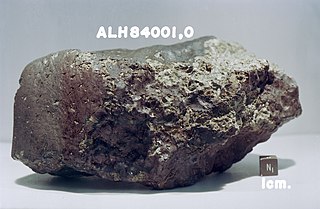
Allan Hills 84001 (ALH84001) is a fragment of a Martian meteorite that was found in the Allan Hills in Antarctica on December 27, 1984, by a team of American meteorite hunters from the ANSMET project. Like other members of the shergottite–nakhlite–chassignite (SNC) group of meteorites, ALH84001 is thought to have originated on Mars. However, it does not fit into any of the previously discovered SNC groups. Its mass upon discovery was 1.93 kilograms (4.3 lb).
The Allan Hills are a group of hills at the end of the Transantarctic Mountains System, located in Oates Land and Victoria Land regions of Antarctica.

The possibilities of life on Mars is a subject of interest in astrobiology due to the planet's proximity and similarities to Earth. To date, no proof of past or present life has been found on Mars. Cumulative evidence suggests that during the ancient Noachian time period, the surface environment of Mars had liquid water and may have been habitable for microorganisms, but habitable conditions do not necessarily indicate life.
The Ramones played their farewell concert at The Palace, Los Angeles, CA.

The Ramones were an American punk rock band that formed in the New York City neighborhood of Forest Hills, Queens, in 1974. They are often cited as the first true punk rock group. Despite achieving a limited commercial appeal in the United States during their time together, the band saw more success in England and Brazil, and are today seen as highly influential.
NASA announces that the ALH 84001 meteorite, thought to originate from Mars, contains evidence of primitive life-forms.

The National Aeronautics and Space Administration is an independent agency of the US federal government responsible for the civil space program, aeronautics research, and space research.

Allan Hills 84001 (ALH84001) is a fragment of a Martian meteorite that was found in the Allan Hills in Antarctica on December 27, 1984, by a team of American meteorite hunters from the ANSMET project. Like other members of the shergottite–nakhlite–chassignite (SNC) group of meteorites, ALH84001 is thought to have originated on Mars. However, it does not fit into any of the previously discovered SNC groups. Its mass upon discovery was 1.93 kilograms (4.3 lb).

Mars is the fourth planet from the Sun and the second-smallest planet in the Solar System, only being larger than Mercury. In the English language, Mars is named for the Roman god of war. Mars is a terrestrial planet with a thin atmosphere, and has a crust primarily composed of elements similar to Earth's crust, as well as a core made of iron and nickel. Mars has surface features such as impact craters, valleys, dunes and polar ice caps. It has two small and irregularly shaped moons, Phobos and Deimos.
British computer programmer Tim Berners-Lee posted a public invitation to collaborate on a system of interlinked, hypertext documents accessible via the Internet, known as the World Wide Web.

A computer programmer, sometimes referred to as a software developer, a software engineer, a programmer or a coder, is a person who creates computer programs — often for larger computer software.
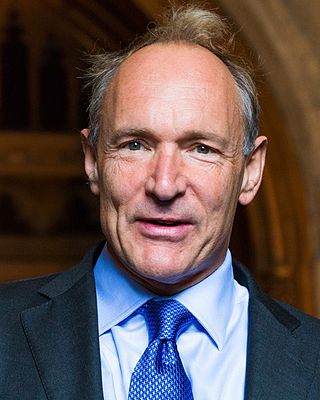
Sir Timothy John Berners-Lee, also known as TimBL, is an English computer scientist best known as the inventor of the World Wide Web. He is a Professorial Fellow of Computer Science at the University of Oxford and a professor at the Massachusetts Institute of Technology (MIT). Berners-Lee proposed an information management system on 12 March 1989, then implemented the first successful communication between a Hypertext Transfer Protocol (HTTP) client and server via the Internet in mid-November.

Hypertext is text displayed on a computer display or other electronic devices with references (hyperlinks) to other text that the reader can immediately access. Hypertext documents are interconnected by hyperlinks, which are typically activated by a mouse click, keypress set, or screen touch. Apart from text, the term "hypertext" is also sometimes used to describe tables, images, and other presentational content formats with integrated hyperlinks. Hypertext is one of the key underlying concepts of the World Wide Web, where Web pages are often written in the Hypertext Markup Language (HTML). As implemented on the Web, hypertext enables the easy-to-use publication of information over the Internet.

The Internet is the global system of interconnected computer networks that uses the Internet protocol suite (TCP/IP) to communicate between networks and devices. It is a network of networks that consists of private, public, academic, business, and government networks of local to global scope, linked by a broad array of electronic, wireless, and optical networking technologies. The Internet carries a vast range of information resources and services, such as the inter-linked hypertext documents and applications of the World Wide Web (WWW), electronic mail, telephony, and file sharing.

The World Wide Web (WWW), commonly known as the Web, is an information system enabling documents and other web resources to be accessed over the Internet.
Tim Berners-Lee releases files describing his idea for the World Wide Web. WWW makes its first appearance as a publicly available service on the Internet.

Sir Timothy John Berners-Lee, also known as TimBL, is an English computer scientist best known as the inventor of the World Wide Web. He is a Professorial Fellow of Computer Science at the University of Oxford and a professor at the Massachusetts Institute of Technology (MIT). Berners-Lee proposed an information management system on 12 March 1989, then implemented the first successful communication between a Hypertext Transfer Protocol (HTTP) client and server via the Internet in mid-November.

The World Wide Web (WWW), commonly known as the Web, is an information system enabling documents and other web resources to be accessed over the Internet.

The Internet is the global system of interconnected computer networks that uses the Internet protocol suite (TCP/IP) to communicate between networks and devices. It is a network of networks that consists of private, public, academic, business, and government networks of local to global scope, linked by a broad array of electronic, wireless, and optical networking technologies. The Internet carries a vast range of information resources and services, such as the inter-linked hypertext documents and applications of the World Wide Web (WWW), electronic mail, telephony, and file sharing.
Takako Doi, chair of the Social Democratic Party, becomes Japan's first female speaker of the House of Representatives.

Takako Doi was a prominent Japanese politician from 1980 until her retirement in 2005. She was the first female Lower House Speaker in Japan, the highest position a female politician has ever held in the country's modern history, as well as the country's first female Opposition Leader.

The Social Democratic Party is a political party in Japan that was established in 1996. Since its reformation and name change in 1996, it has advocated pacifism and defined itself as a social-democratic party. It was previously known as the Japan Socialist Party .

The House of Representatives is the lower house of the National Diet of Japan. The House of Councillors is the upper house. The composition of the House is established by Article 41 and Article 42 of the Constitution of Japan. The House of Representatives has 465 members, elected for a four-year term. Of these, 176 members are elected from 11 multi-member constituencies by a party-list system of proportional representation, and 289 are elected from single-member constituencies.
Gulf War: The United Nations Security Council orders a global trade embargo against Iraq in response to Iraq's invasion of Kuwait.

The Gulf War was a 1990–1991 armed campaign waged by a 35-country military coalition in response to the Iraqi invasion of Kuwait. Spearheaded by the United States, the coalition's efforts against Iraq were carried out in two key phases: Operation Desert Shield, which marked the military buildup from August 1990 to January 1991; and Operation Desert Storm, which began with the aerial bombing campaign against Iraq on 17 January 1991 and came to a close with the American-led Liberation of Kuwait on 28 February 1991.

The United Nations Security Council (UNSC) is one of the six principal organs of the United Nations (UN) and is charged with ensuring international peace and security, recommending the admission of new UN members to the General Assembly, and approving any changes to the UN Charter. Its powers include establishing peacekeeping operations, enacting international sanctions, and authorizing military action. The UNSC is the only UN body with the authority to issue binding resolutions on member states.

Economic sanctions are commercial and financial penalties applied by one or more countries against a targeted self-governing state, group, or individual. Economic sanctions are not necessarily imposed because of economic circumstances—they may also be imposed for a variety of political, military, and social issues. Economic sanctions can be used for achieving domestic and international purposes.

Iraq, officially the Republic of Iraq, is a country in Western Asia. It is bordered by Turkey to the north, Iran to the east, the Persian Gulf and Kuwait to the southeast, Saudi Arabia to the south, Jordan to the southwest and Syria to the west. The capital and largest city is Baghdad. Iraq is home to diverse ethnic groups including Iraqi Arabs, Kurds, Turkmens, Assyrians, Armenians, Yazidis, Mandaeans, Persians and Shabakis with similarly diverse geography and wildlife. The vast majority of the country's 44 million residents are Muslims – the notable other faiths are Christianity, Yazidism, Mandaeism, Yarsanism and Zoroastrianism. The official languages of Iraq are Arabic and Kurdish; others also recognised in specific regions are Neo-Aramaic, Turkish and Armenian.

Kuwait, officially the State of Kuwait, is a country in Western Asia. It is situated in the northern edge of Eastern Arabia at the tip of the Persian Gulf, bordering Iraq to the north and Saudi Arabia to the south. Kuwait also shares maritime borders with Iran. Kuwait has a coastal length of approximately 500 km (311 mi). Most of the country's population reside in the urban agglomeration of the capital city Kuwait City. As of 2022, Kuwait has a population of 4.67 million people of which 1.45 million are Kuwaiti citizens while the remaining 2.8 million are foreign nationals from over 100 countries.
A low-pressure system that redeveloped off the New South Wales coast dumps a record 328 millimeters (13 inches) of rain in a day on Sydney, New South Wales, Australia.

New South Wales is a state on the east coast of Australia. It borders Queensland to the north, Victoria to the south, and South Australia to the west. Its coast borders the Coral and Tasman Seas to the east. The Australian Capital Territory and Jervis Bay Territory are enclaves within the state. New South Wales' state capital is Sydney, which is also Australia's most populous city. In December 2021, the population of New South Wales was over 8 million, making it Australia's most populous state. Just under two-thirds of the state's population, 5.3 million, live in the Greater Sydney area.

Sydney is the capital city of the state of New South Wales, and the most populous city in both Australia and Oceania. Located on Australia's east coast, the metropolis surrounds Sydney Harbour and extends about 70 km (43.5 mi) towards the Blue Mountains to the west, Hawkesbury to the north, the Royal National Park to the south and Macarthur to the south-west. Sydney is made up of 658 suburbs, spread across 33 local government areas. Residents of the city are known as "Sydneysiders". The 2021 census recorded the population of Greater Sydney as 5,231,150, meaning the city is home to approximately 66% of the state's population. Nicknames of the city include the 'Emerald City' and the 'Harbour City'.
U.S. president Lyndon B. Johnson signed the Voting Rights Act into law, outlawing literacy tests and other discriminatory voting practices that had been responsible for the widespread disfranchisement of African Americans.

Lyndon Baines Johnson, often referred to by his initials LBJ, was an American politician who served as the 36th president of the United States from 1963 to 1969. He had previously served as the 37th vice president from 1961 to 1963 under President John F. Kennedy, and was sworn in shortly after Kennedy's assassination. A Democrat from Texas, Johnson also served as a U.S. representative, U.S. senator and the Senate's majority leader. He holds the distinction of being one of the few presidents who served in all elected offices at the federal level.

The Voting Rights Act of 1965 is a landmark piece of federal legislation in the United States that prohibits racial discrimination in voting. It was signed into law by President Lyndon B. Johnson during the height of the civil rights movement on August 6, 1965, and Congress later amended the Act five times to expand its protections. Designed to enforce the voting rights guaranteed by the Fourteenth and Fifteenth Amendments to the United States Constitution, the Act sought to secure the right to vote for racial minorities throughout the country, especially in the South. According to the U.S. Department of Justice, the Act is considered to be the most effective piece of federal civil rights legislation ever enacted in the country. It is also "one of the most far-reaching pieces of civil rights legislation in U.S. history."

A literacy test assesses a person's literacy skills: their ability to read and write have been administered by various governments, particularly to immigrants. In the United States, between the 1850s and 1960s, literacy tests were administered to prospective voters, and this had the effect of disenfranchising African Americans and others with diminished access to education. Other countries, notably Australia, as part of its White Australia policy, and South Africa adopted literacy tests either to exclude certain racialized groups from voting or to prevent them from immigrating.
Disfranchisement, also called disenfranchisement, or voter disqualification is the restriction of suffrage of a person or group of people, or a practice that has the effect of preventing a person exercising the right to vote. Disfranchisement can also refer to the revocation of power or control of a particular individual, community or being to the natural amenity they have; that is to deprive of a franchise, of a legal right, of some privilege or inherent immunity. Disfranchisement may be accomplished explicitly by law or implicitly through requirements applied in a discriminatory fashion, through intimidation, or by placing unreasonable requirements on voters for registration or voting.

African Americans are an ethnic group consisting of Americans with partial or total ancestry from sub-Saharan Africa. The term "African American" generally denotes descendants of enslaved Africans who are from the United States. While some Black immigrants or their children may also come to identify as African-American, the majority of first generation immigrants do not, preferring to identify with their nation of origin.
US President Lyndon B. Johnson signs the Voting Rights Act of 1965 into law.

Lyndon Baines Johnson, often referred to by his initials LBJ, was an American politician who served as the 36th president of the United States from 1963 to 1969. He had previously served as the 37th vice president from 1961 to 1963 under President John F. Kennedy, and was sworn in shortly after Kennedy's assassination. A Democrat from Texas, Johnson also served as a U.S. representative, U.S. senator and the Senate's majority leader. He holds the distinction of being one of the few presidents who served in all elected offices at the federal level.

The Voting Rights Act of 1965 is a landmark piece of federal legislation in the United States that prohibits racial discrimination in voting. It was signed into law by President Lyndon B. Johnson during the height of the civil rights movement on August 6, 1965, and Congress later amended the Act five times to expand its protections. Designed to enforce the voting rights guaranteed by the Fourteenth and Fifteenth Amendments to the United States Constitution, the Act sought to secure the right to vote for racial minorities throughout the country, especially in the South. According to the U.S. Department of Justice, the Act is considered to be the most effective piece of federal civil rights legislation ever enacted in the country. It is also "one of the most far-reaching pieces of civil rights legislation in U.S. history."
Jamaica becomes independent from the United Kingdom.
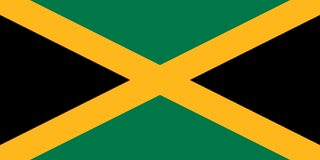
Jamaica is an island country situated in the Caribbean Sea. Spanning 10,990 square kilometres (4,240 sq mi) in area, it is the third-largest island of the Greater Antilles and the Caribbean. Jamaica lies about 145 kilometres (90 mi) south of Cuba, and 191 kilometres (119 mi) west of Hispaniola ; the British Overseas Territory of the Cayman Islands lies some 215 kilometres (134 mi) to the north-west.
Cuban Revolution: Cuba nationalizes American and foreign-owned property in the nation.

The Cuban Revolution was carried out after the 1952 Cuban coup d'état which placed Fulgencio Batista as head of state and the failed mass strike in opposition that followed. After failing to contest Batista in court, Fidel Castro organized an armed attack on the Cuban military's Moncada Barracks. The rebels were arrested and while in prison formed the 26th of July Movement. After gaining amnesty the M-26-7 rebels organized an expedition from Mexico on the Granma yacht to invade Cuba. In the following years the M-26-7 rebel army would slowly defeat the Cuban army in the countryside, while its urban wing would engage in sabotage and rebel army recruitment. Over time the originally critical and ambivalent Popular Socialist Party would come to support the 26th of July Movement in late 1958. By the time the rebels were to oust Batista the revolution was being driven by the Popular Socialist Party, 26th of July Movement, and the Directorio Revolucionario Estudiantil.

Cuba, officially the Republic of Cuba, is an island country comprising the island of Cuba, as well as Isla de la Juventud and several minor archipelagos. Cuba is located where the northern Caribbean Sea, Gulf of Mexico, and Atlantic Ocean meet. Cuba is located east of the Yucatán Peninsula (Mexico), south of both the American state of Florida and the Bahamas, west of Hispaniola, and north of both Jamaica and the Cayman Islands. Havana is the largest city and capital; other major cities include Santiago de Cuba and Camagüey. The official area of the Republic of Cuba is 109,884 km2 (42,426 sq mi) but a total of 350,730 km² including the exclusive economic zone. Cuba is the second-most populous country in the Caribbean after Haiti, with over 11 million inhabitants.
Law of Permanent Defense of Democracy, outlawing the Communist Party of Chile and banning 26,650 persons from the electoral lists, is repealed in Chile.
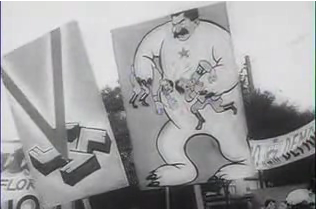
In 1948, on the initiative of Chilean President Gabriel González Videla, the Chilean National Congress enacted the Permanent Defense of Democracy Law, referred to by many as the Damned Law, which outlawed the Communist Party of Chile and banned 26,650 persons from the electoral lists.

The Communist Party of Chile is a communist party in Chile. It was founded in 1912 as the Socialist Workers' Party and adopted its current name in 1922. The party established a youth wing, the Communist Youth of Chile, in 1932.
After going bankrupt in 1955, the American broadcaster DuMont Television Network makes its final broadcast, a boxing match from St. Nicholas Arena in New York in the Boxing from St. Nicholas Arena series.
1955 (MCMLV) was a common year starting on Saturday of the Gregorian calendar, the 1955th year of the Common Era (CE) and Anno Domini (AD) designations, the 955th year of the 2nd millennium, the 55th year of the 20th century, and the 6th year of the 1950s decade.

The DuMont Television Network was one of America's pioneer commercial television networks, rivaling NBC and CBS for the distinction of being first overall in the United States. It was owned by Allen B. DuMont Laboratories, a television equipment and set manufacturer, and began operation on June 28, 1942.

The St. Nicholas Rink, also called the St. Nicholas Arena, was an indoor ice rink, and later a boxing arena in New York City from 1896 until 1962. The rink was one of the earliest indoor ice rinks made of mechanically frozen ice in North America, enabling a longer season for skating sports. It was demolished in the 1980s.
Boxing from St. Nicholas Arena was an American sports program originally broadcast on NBC from 1946 to 1948, and later on the now-defunct DuMont Television Network from 1954 to 1956.
World War II: The U.S. Army Air Force bomber Enola Gay (pictured with crew) dropped the Little Boy atomic bomb on Hiroshima, Japan, killing about 70,000 people instantly.

World War II or the Second World War, often abbreviated as WWII or WW2, was a world war that lasted from 1939 to 1945. It involved the vast majority of the world's countries—including all of the great powers—forming two opposing military alliances: the Allies and the Axis powers. World War II was a total war that directly involved more than 100 million personnel from more than 30 countries.

The United States Army Air Forces was the major land-based aerial warfare service component of the United States Army and de facto aerial warfare service branch of the United States during and immediately after World War II (1941–1945). It was created on 20 June 1941 as successor to the previous United States Army Air Corps and is the direct predecessor of the United States Air Force, today one of the six armed forces of the United States. The AAF was a component of the United States Army, which on 2 March 1942 was divided functionally by executive order into three autonomous forces: the Army Ground Forces, the United States Army Services of Supply, and the Army Air Forces. Each of these forces had a commanding general who reported directly to the Army Chief of Staff.
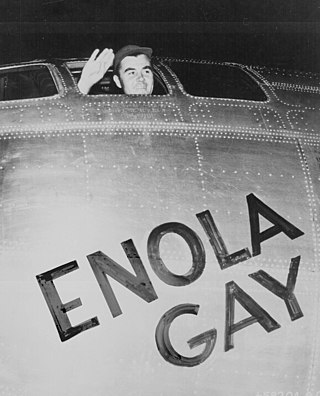
The Enola Gay is a Boeing B-29 Superfortress bomber, named after Enola Gay Tibbets, the mother of the pilot, Colonel Paul Tibbets. On 6 August 1945, piloted by Tibbets and Robert A. Lewis during the final stages of World War II, it became the first aircraft to drop an atomic bomb in warfare. The bomb, code-named "Little Boy", was targeted at the city of Hiroshima, Japan, and caused the destruction of about three quarters of the city. Enola Gay participated in the second nuclear attack as the weather reconnaissance aircraft for the primary target of Kokura. Clouds and drifting smoke resulted in a secondary target, Nagasaki, being bombed instead.

"Little Boy" was the type of atomic bomb dropped on the Japanese city of Hiroshima on 6 August 1945 during World War II. It was the first nuclear weapon used in warfare. The bomb was dropped by the Boeing B-29 Superfortress Enola Gay piloted by Colonel Paul W. Tibbets, Jr., commander of the 509th Composite Group of the United States Army Air Forces and Captain Robert A. Lewis. It exploded with an energy of approximately 15 kilotons of TNT (63 TJ) and caused widespread death and destruction throughout the city. The Hiroshima bombing was the second man-made nuclear explosion in history, after the Trinity nuclear test.

A nuclear weapon is an explosive device that derives its destructive force from nuclear reactions, either fission or a combination of fission and fusion reactions, producing a nuclear explosion. Both bomb types release large quantities of energy from relatively small amounts of matter.

Hiroshima is the capital of Hiroshima Prefecture in Japan. As of June 1, 2019, the city had an estimated population of 1,199,391. The gross domestic product (GDP) in Greater Hiroshima, Hiroshima Urban Employment Area, was US$61.3 billion as of 2010. Kazumi Matsui has been the city's mayor since April 2011.

The United States detonated two atomic bombs over the Japanese cities of Hiroshima and Nagasaki on 6 and 9 August 1945, respectively. The two bombings killed between 129,000 and 226,000 people, most of whom were civilians, and remain the only use of nuclear weapons in armed conflict.
World War II: Hiroshima, Japan is devastated when the atomic bomb "Little Boy" is dropped by the United States B-29 Enola Gay. Around 70,000 people are killed instantly, and some tens of thousands die in subsequent years from burns and radiation poisoning.

World War II or the Second World War, often abbreviated as WWII or WW2, was a world war that lasted from 1939 to 1945. It involved the vast majority of the world's countries—including all of the great powers—forming two opposing military alliances: the Allies and the Axis powers. World War II was a total war that directly involved more than 100 million personnel from more than 30 countries.

Hiroshima is the capital of Hiroshima Prefecture in Japan. As of June 1, 2019, the city had an estimated population of 1,199,391. The gross domestic product (GDP) in Greater Hiroshima, Hiroshima Urban Employment Area, was US$61.3 billion as of 2010. Kazumi Matsui has been the city's mayor since April 2011.

The United States detonated two atomic bombs over the Japanese cities of Hiroshima and Nagasaki on 6 and 9 August 1945, respectively. The two bombings killed between 129,000 and 226,000 people, most of whom were civilians, and remain the only use of nuclear weapons in armed conflict.

A nuclear weapon is an explosive device that derives its destructive force from nuclear reactions, either fission or a combination of fission and fusion reactions, producing a nuclear explosion. Both bomb types release large quantities of energy from relatively small amounts of matter.

"Little Boy" was the type of atomic bomb dropped on the Japanese city of Hiroshima on 6 August 1945 during World War II. It was the first nuclear weapon used in warfare. The bomb was dropped by the Boeing B-29 Superfortress Enola Gay piloted by Colonel Paul W. Tibbets, Jr., commander of the 509th Composite Group of the United States Army Air Forces and Captain Robert A. Lewis. It exploded with an energy of approximately 15 kilotons of TNT (63 TJ) and caused widespread death and destruction throughout the city. The Hiroshima bombing was the second man-made nuclear explosion in history, after the Trinity nuclear test.

The Boeing B-29 Superfortress is an American four-engined propeller-driven heavy bomber, designed by Boeing and flown primarily by the United States during World War II and the Korean War. Named in allusion to its predecessor, the B-17 Flying Fortress, the Superfortress was designed for high-altitude strategic bombing, but also excelled in low-altitude night incendiary bombing, and in dropping naval mines to blockade Japan. B-29s dropped the atomic bombs on Hiroshima and Nagasaki, the only aircraft ever to drop nuclear weapons in combat.

The Enola Gay is a Boeing B-29 Superfortress bomber, named after Enola Gay Tibbets, the mother of the pilot, Colonel Paul Tibbets. On 6 August 1945, piloted by Tibbets and Robert A. Lewis during the final stages of World War II, it became the first aircraft to drop an atomic bomb in warfare. The bomb, code-named "Little Boy", was targeted at the city of Hiroshima, Japan, and caused the destruction of about three quarters of the city. Enola Gay participated in the second nuclear attack as the weather reconnaissance aircraft for the primary target of Kokura. Clouds and drifting smoke resulted in a secondary target, Nagasaki, being bombed instead.

Acute radiation syndrome (ARS), also known as radiation sickness or radiation poisoning, is a collection of health effects that are caused by being exposed to high amounts of ionizing radiation in a short period of time. Symptoms can start within an hour of exposure, and can last for several months. Early symptoms are usually nausea, vomiting and loss of appetite. In the following hours or weeks, initial symptoms may appear to improve, before the development of additional symptoms, after which either recovery or death follow.
The Warsaw Uprising occurs on August 1. It is brutally suppressed and all able-bodied men in Kraków are detained afterwards to prevent a similar uprising, the Kraków Uprising, that was planned but never carried out.

The Warsaw Uprising was a major World War II operation by the Polish underground resistance to liberate Warsaw from German occupation. It occurred in the summer of 1944, and it was led by the Polish resistance Home Army. The uprising was timed to coincide with the retreat of the German forces from Poland ahead of the Soviet advance. While approaching the eastern suburbs of the city, the Red Army temporarily halted combat operations, enabling the Germans to regroup and defeat the Polish resistance and to destroy the city in retaliation. The Uprising was fought for 63 days with little outside support. It was the single largest military effort taken by any European resistance movement during World War II.
The Kraków Uprising was a planned but never realized uprising of the Polish Resistance against the German occupation in the city of Kraków during World War II.
Queen Wilhelmina of the Netherlands becomes the first reigning queen to address a joint session of the United States Congress.

Wilhelmina was Queen of the Netherlands from 1890 until her abdication in 1948. She reigned for nearly 58 years, longer than any other Dutch monarch. Her reign saw World War I, the Dutch economic crisis of 1933 and World War II.

The United States Congress is the legislature of the federal government of the United States. It is bicameral, composed of a lower body, the House of Representatives, and an upper body, the Senate. It meets in the United States Capitol in Washington, D.C. Senators and representatives are chosen through direct election, though vacancies in the Senate may be filled by a governor's appointment. Congress has 535 voting members: 100 senators and 435 representatives. The vice president of the United States has a vote in the Senate only when senators are evenly divided. The House of Representatives has six non-voting members.
Estonia becomes part of the Soviet Union.

Estonia, formally the Republic of Estonia, is a country by the Baltic Sea in Northern Europe. It is bordered to the north by the Gulf of Finland across from Finland, to the west by the sea across from Sweden, to the south by Latvia, and to the east by Lake Peipus and Russia. The territory of Estonia consists of the mainland, the larger islands of Saaremaa and Hiiumaa, and over 2,200 other islands and islets on the eastern coast of the Baltic Sea, covering a total area of 45,339 square kilometres (17,505 sq mi). The capital city Tallinn and Tartu are the two largest urban areas of the country. The Estonian language is the autochthonous and the official language of Estonia; it is the first language of the majority of its population, as well as the world's second most spoken Finnic language.

The Soviet Union, officially the Union of Soviet Socialist Republics (USSR), was a transcontinental country that spanned much of Eurasia from 1922 to 1991. A flagship communist state, it was nominally a federal union of fifteen national republics; in practice, both its government and its economy were highly centralized until its final years. It was a one-party state governed by the Communist Party of the Soviet Union, with the city of Moscow serving as its capital as well as that of its largest and most populous republic: the Russian SFSR. Other major cities included Leningrad, Kiev, Minsk, Tashkent, Alma-Ata, and Novosibirsk. It was the largest country in the world, covering over 22,402,200 square kilometres (8,649,500 sq mi) and spanning eleven time zones.
New York City judge Joseph Force Crater mysteriously disappeared, eventually earning him the nickname of the "missingest" man in New York.
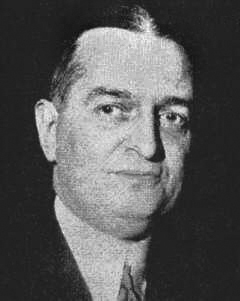
Joseph Force Crater was a New York State Supreme Court Justice who went missing amid a political scandal. He was last seen leaving a restaurant on West 45th Street in Manhattan and entered popular culture as one of the most mysterious missing persons cases of the 20th century. Despite massive publicity, the case was never solved and was officially closed forty years after he disappeared.
Gertrude Ederle becomes the first woman to swim across the English Channel.

Gertrude Caroline Ederle was an American competition swimmer, Olympic champion, and world record-holder in five events. On August 6, 1926, she became the first woman to swim across the English Channel. Among other nicknames, the press sometimes called her "Queen of the Waves".
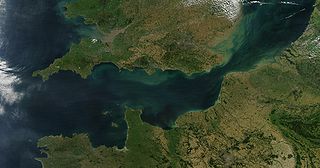
The English Channel is an arm of the Atlantic Ocean that separates Southern England from northern France. It links to the southern part of the North Sea by the Strait of Dover at its northeastern end. It is the busiest shipping area in the world.
In New York City, the Warner Bros.' Vitaphone system premieres with the movie Don Juan starring John Barrymore.

Warner Bros. Entertainment Inc. is an American film and entertainment studio headquartered at the Warner Bros. Studios complex in Burbank, California, and a subsidiary of Warner Bros. Discovery. Founded in 1923 by four brothers, Harry, Albert, Sam, and Jack Warner, the company established itself as a leader in the American film industry before diversifying into animation, television, and video games and is one of the "Big Five" major American film studios, as well as a member of the Motion Picture Association (MPA).

Vitaphone was a sound film system used for feature films and nearly 1,000 short subjects made by Warner Bros. and its sister studio First National from 1926 to 1931. Vitaphone was the last major analog sound-on-disc system and the only one that was widely used and commercially successful. The soundtrack was not printed on the film itself, but issued separately on phonograph records. The discs, recorded at 33+1⁄3 rpm and typically 16 inches (41 cm) in diameter, would be played on a turntable physically coupled to the projector motor while the film was being projected. It had a frequency response of 4300 Hz. Many early talkies, such as The Jazz Singer (1927), used the Vitaphone system. The name "Vitaphone" derived from the Latin and Greek words, respectively, for "living" and "sound".

Don Juan is a 1926 American romantic adventure film directed by Alan Crosland. It is the first feature-length film to utilize the Vitaphone sound-on-disc sound system with a synchronized musical score and sound effects, though it has no spoken dialogue. The film is inspired by Lord Byron's 1821 epic poem of the same name. The screenplay was written by Bess Meredyth with intertitles by Maude Fulton and Walter Anthony.

John Barrymore was an American actor on stage, screen and radio. A member of the Drew and Barrymore theatrical families, he initially tried to avoid the stage, and briefly attempted a career as an artist, but appeared on stage together with his father Maurice in 1900, and then his sister Ethel the following year. He began his career in 1903 and first gained attention as a stage actor in light comedy, then high drama, culminating in productions of Justice (1916), Richard III (1920) and Hamlet (1922); his portrayal of Hamlet led to him being called the "greatest living American tragedian".
World War I: Battle of Mărășești between the Romanian and German armies begins.

The Battle of Mărășești was the last major battle between the German Empire and the Kingdom of Romania on the Romanian front during World War I. Romania was mostly occupied by the Central Powers, but the Battle of Mărășești kept the northern region of the country free from occupation.

Romania is a country located at the crossroads of Central, Eastern, and Southeast Europe. It borders Bulgaria to the south, Ukraine to the north, Hungary to the west, Serbia to the southwest, Moldova to the east, and the Black Sea to the southeast. It has a predominantly temperate-continental climate, and an area of 238,397 km2 (92,046 sq mi), with a population of around 19 million. Romania is the twelfth-largest country in Europe and the sixth-most populous member state of the European Union. Its capital and largest city is Bucharest, followed by Iași, Cluj-Napoca, Timișoara, Constanța, Craiova, Brașov, and Galați.
World War I: Battle of Sari Bair: The Allies mount a diversionary attack timed to coincide with a major Allied landing of reinforcements at Suvla Bay.
The Battle of Sari Bair, also known as the August Offensive, represented the final attempt made by the British in August 1915 to seize control of the Gallipoli peninsula from the Ottoman Empire during the First World War.

The Allies of World War I, Entente Powers, or Allied Powers were a coalition of countries led by France, the United Kingdom, Russia, Italy, Japan, and the United States against the Central Powers of Germany, Austria-Hungary, the Ottoman Empire, Bulgaria, and their colonies during the First World War (1914–1918).

Suvla is a bay on the Aegean coast of the Gallipoli peninsula in European Turkey, south of the Gulf of Saros.
World War I: U-boat campaign: Two days after the United Kingdom had declared war on Germany over the German invasion of Belgium, ten German U-boats leave their base in Heligoland to attack Royal Navy warships in the North Sea.
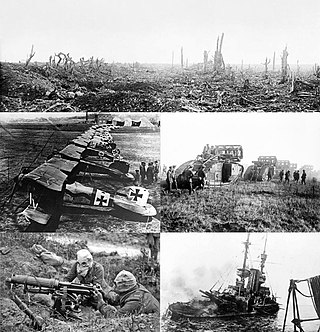
World War I or the First World War, often abbreviated as WWI or WW1, and referred to by some Anglophone authors as the "Great War" or the "War to End All Wars", was a global conflict which lasted from 1914 to 1918, and is considered one of the deadliest conflicts in history. Belligerents included much of Europe, the Russian Empire, the United States, and the Ottoman Empire, with fighting occurring throughout Europe, the Middle East, Africa, the Pacific, and parts of Asia. An estimated 9 million soldiers were killed in combat, plus another 23 million wounded, while 5 million civilians died as a result of military action, hunger, and disease. Millions more died in genocides within the Ottoman Empire and in the 1918 influenza pandemic, which was exacerbated by the movement of combatants during the war.

The U-boat Campaign from 1914 to 1918 was the World War I naval campaign fought by German U-boats against the trade routes of the Allies. It took place largely in the seas around the British Isles and in the Mediterranean. The German Empire relied on imports for food and domestic food production and the United Kingdom relied heavily on imports to feed its population, and both required raw materials to supply their war industry; the powers aimed, therefore, to blockade one another. The British had the Royal Navy which was superior in numbers and could operate on most of the world's oceans because of the British Empire, whereas the Imperial German Navy surface fleet was mainly restricted to the German Bight, and used commerce raiders and unrestricted submarine warfare to operate elsewhere.

U-boats were naval submarines operated by Germany, particularly in the First and Second World Wars. Although at times they were efficient fleet weapons against enemy naval warships, they were most effectively used in an economic warfare role and enforcing a naval blockade against enemy shipping. The primary targets of the U-boat campaigns in both wars were the merchant convoys bringing supplies from Canada and other parts of the British Empire, and from the United States, to the United Kingdom and to the Soviet Union and the Allied territories in the Mediterranean. German submarines also destroyed Brazilian merchant ships during World War II, causing Brazil to declare war on both Germany and Italy on 22 August 1942.

Heligoland is a small archipelago in the North Sea. A part of the German state of Schleswig-Holstein since 1890, the islands were historically possessions of Denmark, then became the possessions of the United Kingdom from 1807 to 1890, and briefly managed as a war prize from 1945 to 1952.

The Royal Navy (RN) is the United Kingdom's naval warfare force. Although warships were used by English and Scottish kings from the early medieval period, the first major maritime engagements were fought in the Hundred Years' War against France. The modern Royal Navy traces its origins to the early 16th century; the oldest of the UK's armed services, it is consequently known as the Senior Service.

The North Sea lies between Great Britain, Norway, Denmark, Germany, the Netherlands and Belgium. An epeiric sea on the European continental shelf, it connects to the Atlantic Ocean through the English Channel in the south and the Norwegian Sea in the north. It is more than 970 kilometres (600 mi) long and 580 kilometres (360 mi) wide, covering 570,000 square kilometres (220,000 sq mi).
World War I: Serbia declares war on Germany; Austria declares war on Russia.

Serbia, officially the Republic of Serbia, is a landlocked country in Southeastern and Central Europe, situated at the crossroads of the Pannonian Basin and the Balkans. It shares land borders with Hungary to the north, Romania to the northeast, Bulgaria to the southeast, North Macedonia to the south, Croatia and Bosnia and Herzegovina to the west, and Montenegro to the southwest, and claims a border with Albania through the disputed territory of Kosovo. Serbia with Kosovo has about 8.6 million inhabitants. Its capital Belgrade is also the largest city.
Kiowa land in Oklahoma is opened for white settlement, effectively dissolving the contiguous reservation.
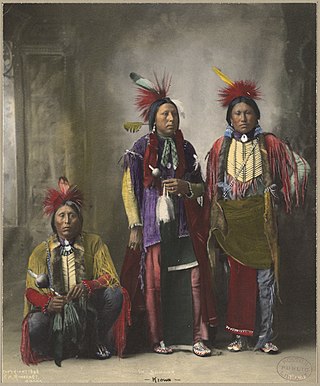
Kiowa people are a Native American tribe and an indigenous people of the Great Plains of the United States. They migrated southward from western Montana into the Rocky Mountains in Colorado in the 17th and 18th centuries, and eventually into the Southern Plains by the early 19th century. In 1867, the Kiowa were moved to a reservation in southwestern Oklahoma.

Oklahoma is a state in the South Central region of the United States, bordered by Texas on the south and west, Kansas on the north, Missouri on the northeast, Arkansas on the east, New Mexico on the west, and Colorado on the northwest. Partially in the western extreme of the Upland South, it is the 20th-most extensive and the 28th-most populous of the 50 United States. Its residents are known as Oklahomans, and its capital and largest city is Oklahoma City.

An Indian reservation is an area of land held and governed by a federally recognized Native American tribal nation whose government is accountable to the United States Bureau of Indian Affairs and not to the state government in which it is located. Some of the country's 574 federally recognized tribes govern more than one of the 326 Indian reservations in the United States, while some share reservations, and others have no reservation at all. Historical piecemeal land allocations under the Dawes Act facilitated sales to non–Native Americans, resulting in some reservations becoming severely fragmented, with pieces of tribal and privately held land being treated as separate enclaves. This jumble of private and public real estate creates significant administrative, political and legal difficulties.
At Auburn Prison in New York, murderer William Kemmler becomes the first person to be executed by electric chair.
Auburn Correctional Facility is a state prison on State Street in Auburn, New York, United States. It was built on land that was once a Cayuga village. It is classified as a maximum security facility.

William Francis Kemmler was an American peddler, alcoholic, and murderer, who, in 1890, became the first person in the world to be executed by electric chair. He was convicted of murdering Matilda "Tillie" Ziegler, his common-law wife, a year earlier. Although electrocution had previously been successfully used to kill a horse, Kemmler's execution did not go smoothly.
Capital punishment, also known as the death penalty, is a state-sanctioned practice of deliberately executing a person as a punishment for an actual or supposed crime, and following an authorized, rule-governed process to conclude that the person is responsible for violating norms that warrant execution. The sentence ordering that an offender is to be punished in such a manner is known as a death sentence, and the act of carrying out the sentence is known as an execution. A prisoner who has been sentenced to death and awaits execution is condemned and is commonly referred to as being "on death row".

An electric chair is a device used to execute an individual by electrocution. When used, the condemned person is strapped to a specially built wooden chair and electrocuted through electrodes fastened on the head and leg. This execution method, conceived in 1881 by a Buffalo, New York dentist named Alfred P. Southwick, was developed throughout the 1880s as a supposed humane alternative to hanging, and first used in 1890. This execution method has been used in the United States and, for several decades, in the Philippines. While death was originally theorized to result from damage to the brain, it was shown in 1899 that it primarily results from ventricular fibrillation and eventual cardiac arrest.
Franco-Prussian War: The Battle of Spicheren is fought, resulting in a German victory.
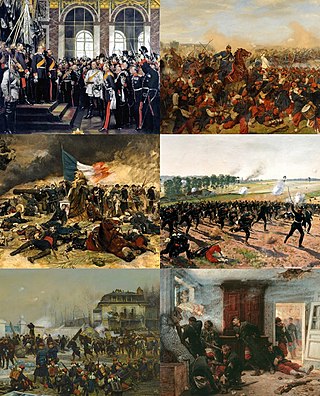
The Franco-Prussian War or Franco-German War, often referred to in France as the War of 1870, was a conflict between the Second French Empire and the North German Confederation led by the Kingdom of Prussia. Lasting from 19 July 1870 to 28 January 1871, the conflict was caused primarily by France's determination to reassert its dominant position in continental Europe, which appeared in question following the decisive Prussian victory over Austria in 1866. According to some historians, Prussian chancellor Otto von Bismarck deliberately provoked the French into declaring war on Prussia in order to induce four independent southern German states—Baden, Württemberg, Bavaria and Hesse-Darmstadt—to join the North German Confederation; other historians contend that Bismarck exploited the circumstances as they unfolded. All agree that Bismarck recognized the potential for new German alliances, given the situation as a whole.

The Battle of Spicheren, also known as the Battle of Forbach, was a battle during the Franco-Prussian War. The German victory compelled the French to withdraw to the defenses of Metz. The Battle of Spicheren, on 6 August, was the second of three critical French defeats. Moltke had originally planned to keep Bazaine's army on the Saar river until he could attack it with the 2nd Army in front and the 1st Army on its left flank, while the 3rd Army closed towards the rear. The aging General von Steinmetz made an overzealous, unplanned move, leading the 1st Army south from his position on the Moselle. He moved straight toward the town of Spicheren, cutting off Prince Frederick Charles from his forward cavalry units in the process.
Franco-Prussian War: The Battle of Wörth results in a decisive German victory.
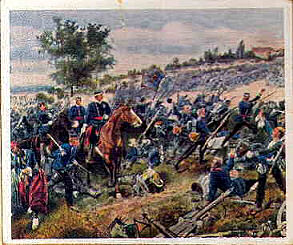
The Battle of Wörth, also known as the Battle of Reichshoffen or as the Battle of Frœschwiller, refers to the second battle of Wörth, which took place on 6 August 1870 in the opening stages of the Franco-Prussian War. In the second battle, troops from Germany commanded by Crown Prince Frederick William and directed by his chief of staff, General Leonhard Graf von Blumenthal, defeated the French under Marshal MacMahon near the village of Wœrth in Alsace, on the Sauer River, 10 kilometres (6.2 mi) north of Haguenau.
American Civil War: The Confederate ironclad CSS Arkansas is scuttled on the Mississippi River after suffering catastrophic engine failure near Baton Rouge, Louisiana.

The American Civil War was a civil war in the United States. It was fought between the Union and the Confederacy, the latter formed by states that had seceded. The central cause of the war was the dispute over whether slavery would be permitted to expand into the western territories, leading to more slave states, or be prevented from doing so, which was widely believed would place slavery on a course of ultimate extinction.

The Confederate States of America (CSA), commonly referred to as the Confederate States, the Confederacy, or "the South", was an unrecognized breakaway republic in North America that existed from February 8, 1861, to May 9, 1865. The Confederacy comprised U.S. states that declared secession and warred against the United States during the American Civil War. Eleven U.S. states, nicknamed Dixie, declared secession and formed the main part of the CSA. They were South Carolina, Mississippi, Florida, Alabama, Georgia, Louisiana, Texas, Virginia, Arkansas, Tennessee, and North Carolina. Kentucky, and Missouri also had declarations of secession and full representation in the Confederate Congress during their Union army occupation.

An ironclad is a steam-propelled warship protected by iron or steel armor plates, constructed from 1859 to the early 1890s. The ironclad was developed as a result of the vulnerability of wooden warships to explosive or incendiary shells. The first ironclad battleship, Gloire, was launched by the French Navy in November 1859 - narrowly pre-empting the British Royal Navy.

CSS Arkansas was the lead ship of her class of two casemate ironclads built for the Confederate States Navy during the American Civil War. Completed in 1862, she saw combat in the Western Theater when she steamed through a United States Navy fleet at Vicksburg in July. Arkansas was set on fire and destroyed by her crew after her engines broke down several weeks later. Her remains lie under a levee above Baton Rouge, Louisiana at 30°29′14″N 91°12′5″W.

The Mississippi River is the second-longest river and chief river of the second-largest drainage system in North America, second only to the Hudson Bay drainage system. From its traditional source of Lake Itasca in northern Minnesota, it flows generally south for 2,340 miles (3,770 km) to the Mississippi River Delta in the Gulf of Mexico. With its many tributaries, the Mississippi's watershed drains all or parts of 32 U.S. states and two Canadian provinces between the Rocky and Appalachian mountains. The main stem is entirely within the United States; the total drainage basin is 1,151,000 sq mi (2,980,000 km2), of which only about one percent is in Canada. The Mississippi ranks as the thirteenth-largest river by discharge in the world. The river either borders or passes through the states of Minnesota, Wisconsin, Iowa, Illinois, Missouri, Kentucky, Tennessee, Arkansas, Mississippi, and Louisiana.

Baton Rouge is a city in and the capital of the U.S. state of Louisiana. On the eastern bank of the Mississippi River, it is the parish seat of East Baton Rouge Parish, Louisiana's most populous parish. Since 2020, it has been the 99th-most-populous city in the United States and the second-largest city in Louisiana, after New Orleans. It is the 18th-most-populous state capital. At the U.S. Census Bureau's 2020 tabulation, it had a population of 227,470; its consolidated population was 456,781 in 2020. It is the center of the Greater Baton Rouge area, Louisiana's second-largest metropolitan area, with a population of 870,569 as of 2020, up from 802,484 in 2010.
Under the threat of military bombardment, Dosunmu, Oba of Lagos, ceded the island of Lagos to British forces.
Dosunmu, referred to in British documents as Docemo, reigned as Oba of Lagos from 1853, when he succeeded his father Oba Akitoye, until his own death in 1885. He was forced to run away to Britain under the threat of force in August 1861.

The Oba of Lagos, also known as the Eleko of Eko, is the traditional ruler (Oba) of Lagos.
The Treaty of Cession, 6 August 1861 or the Lagos Treaty of Cession was a treaty between the British Empire and Oba Dosunmu of Lagos wherein Dosunmu, under the threat of military bombardment, ceded Lagos Island to Britain, whilst retaining the title and powers of Oba, subject to English laws.
Britain imposes the Lagos Treaty of Cession to suppress slavery in what is now Nigeria.
The Treaty of Cession, 6 August 1861 or the Lagos Treaty of Cession was a treaty between the British Empire and Oba Dosunmu of Lagos wherein Dosunmu, under the threat of military bombardment, ceded Lagos Island to Britain, whilst retaining the title and powers of Oba, subject to English laws.
The Bolivian Declaration of Independence is proclaimed.

Bolivia's independence was definitively proclaimed on 6 August 1825 at a congress held in Chuquisaca.
Peruvian War of Independence: The Battle of Junín.

The Peruvian War of Independence consisted in a series of military conflicts in Peru beginning with viceroy Abascal military victories in the south frontier in 1809, in La Paz revolution and 1811 in the Battle of Guaqui, continuing with the definitive defeat of the Spanish Army in 1824 in the Battle of Ayacucho, and culminating in 1826 with the Siege of Callao. The wars of independence took place with the background of the 1780–1781 uprising by indigenous leader Túpac Amaru II and the earlier removal of Upper Peru and the Río de la Plata regions from the Viceroyalty of Peru. Because of this the viceroy often had the support of the "Lima Oligarchy", who saw their elite interests threatened by popular rebellion and were opposed to the new commercial class in Buenos Aires. During the first decade of the 1800s Peru had been a stronghold for royalists, who fought those in favor of independence in Peru, Bolivia, Quito and Chile. Among the most important events during the war was the proclamation of independence of Peru by José de San Martín on 28 July 1821.
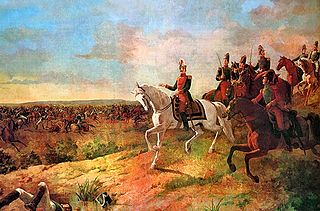
The Battle of Junín was a military engagement of the Peruvian War of Independence, fought in the highlands of the Junín Region on 6 August 1824. The preceding February the royalists had regained control of Lima, and having regrouped in Trujillo, Simón Bolívar in June led his rebel forces south to confront the Spanish under Field Marshal José de Canterac. The two armies met on the Plain of Junín in the Bombon Plateau, northwest of the Jauja Valley.
Norwich University is founded in Vermont as the first private military school in the United States.

Norwich University – The Military College of Vermont is a private senior military college in Northfield, Vermont. It is the oldest private and senior military college in the United States and offers bachelor's and master's degrees on-campus and online. The university was founded in 1819 in Norwich, Vermont, as the American Literary, Scientific and Military Academy. It is the oldest of six senior military colleges and is recognized by the United States Department of Defense as the "Birthplace of ROTC".

Vermont is a state in the northeast New England region of the United States. Vermont is bordered by the states of Massachusetts to the south, New Hampshire to the east, and New York to the west, and the Canadian province of Quebec to the north. Admitted to the union in 1791 as the 14th state, it is the only state in New England not bordered by the Atlantic Ocean. According to the 2020 U.S. census, the state has a population of 643,503, ranking it the second least-populated in the U.S. after Wyoming. It is also the nation's sixth-smallest state in area. The state's capital Montpelier is the least-populous state capital in the U.S., while its most-populous city, Burlington, is the least-populous to be a state's largest.
Francis II, Holy Roman Emperor, declares the moribund empire to be dissolved, although he retains power in the Austrian Empire.
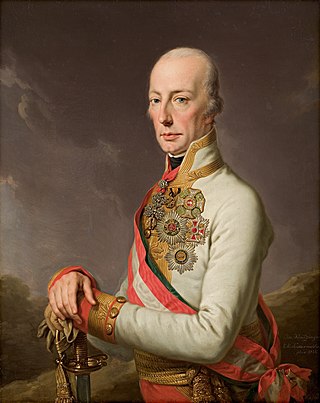
Francis II was the last Holy Roman Emperor and the founder and Emperor of the Austrian Empire, from 1804 to 1835. He assumed the title of Emperor of Austria in response to the coronation of Napoleon as Emperor of the French. Soon after Napoleon created the Confederation of the Rhine, Francis abdicated as Holy Roman Emperor. He was King of Hungary, Croatia and Bohemia. He also served as the first president of the German Confederation following its establishment in 1815.

The Austrian Empire was a Central-Eastern European multinational great power from 1804 to 1867, created by proclamation out of the realms of the Habsburgs. During its existence, it was the third most populous monarchy in Europe after the Russian Empire and the United Kingdom. Along with Prussia, it was one of the two major powers of the German Confederation. Geographically, it was the third-largest empire in Europe after the Russian Empire and the First French Empire.
Sixty proof sheets of the Constitution of the United States are delivered to the Constitutional Convention in Philadelphia, Pennsylvania.
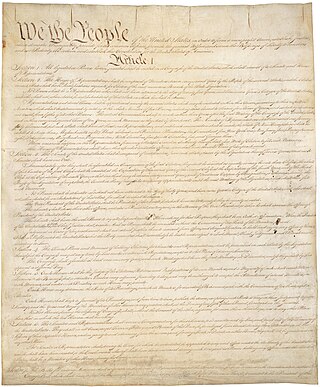
The Constitution of the United States is the supreme law of the United States of America. It superseded the Articles of Confederation, the nation's first constitution, in 1789. Originally comprising seven articles, it delineates the national frame of government. Its first three articles embody the doctrine of the separation of powers, whereby the federal government is divided into three branches: the legislative, consisting of the bicameral Congress ; the executive, consisting of the president and subordinate officers ; and the judicial, consisting of the Supreme Court and other federal courts. Article IV, Article V, and Article VI embody concepts of federalism, describing the rights and responsibilities of state governments, the states in relationship to the federal government, and the shared process of constitutional amendment. Article VII establishes the procedure subsequently used by the 13 states to ratify it. It is regarded as the oldest written and codified national constitution in force.

The Constitutional Convention took place in Philadelphia from May 25 to September 17, 1787. Although the convention was intended to revise the league of states and first system of government under the Articles of Confederation, the intention from the outset of many of its proponents, chief among them James Madison of Virginia and Alexander Hamilton of New York, was to create a new Frame of Government rather than fix the existing one. The delegates elected George Washington of Virginia, former commanding general of the Continental Army in the late American Revolutionary War (1775–1783) and proponent of a stronger national government, to become President of the convention. The result of the convention was the creation of the Constitution of the United States, placing the Convention among the most significant events in American history.
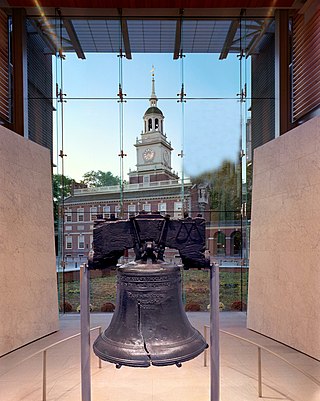
Philadelphia, often called Philly, is the largest city in the Commonwealth of Pennsylvania, the sixth-largest city in the U.S., the second-largest city in both the Northeast megalopolis and Mid-Atlantic regions after New York City. Since 1854, the city has been coextensive with Philadelphia County, the most populous county in Pennsylvania and the urban core of the Delaware Valley, the nation's seventh-largest and one of world's largest metropolitan regions, with 6.245 million residents as of 2020. The city's population as of the 2020 census was 1,603,797, and over 56 million people live within 250 mi (400 km) of Philadelphia.
The Battle of Oriskany, one of the bloodiest battles of the American Revolutionary War, was fought about 6 mi (10 km) east of Fort Stanwix, New York.

The Battle of Oriskany was a significant engagement of the Saratoga campaign of the American Revolutionary War, and one of the bloodiest battles in the conflict between the Americans and Great Britain. On August 6, 1777, a party of Loyalists and several hundred Indian allies from different tribes ambushed an American military party that was marching to relieve the siege of Fort Stanwix. This was one of the few battles in which the majority of the participants were Americans; Patriots and allied Oneidas fought against Loyalists and allied Iroquois in the absence of British regular soldiers. There was also a detachment of Hessians in the British force, as well as Western Indians including members of the Mississaugas.

The American Revolutionary War, also known as the Revolutionary War or American War of Independence, was a major war of the American Revolution. Widely considered as the war that secured the independence of the United States, fighting began on April 19, 1775, followed by the Lee Resolution on July 2, 1776, and the Declaration of Independence on July 4, 1776. The American Patriots were supported by the Kingdom of France and, to a lesser extent, the Dutch Republic and the Spanish Empire, in a conflict taking place in North America, the Caribbean, and the Atlantic Ocean.
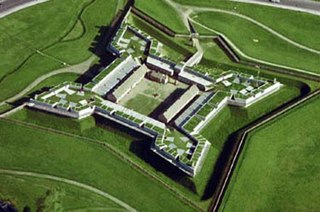
Fort Stanwix was a colonial fort whose construction commenced on August 26, 1758, under the direction of British General John Stanwix, at the location of present-day Rome, New York, but was not completed until about 1762. The bastion fort was built to guard a portage known as the Oneida Carry during the French and Indian War. Fort Stanwix National Monument, a reconstructed structure built by the National Park Service, now occupies the site.

New York, officially the State of New York, is a state in the Northeastern United States. It is often called New York State to distinguish it from its largest city, New York City. With a total area of 54,556 square miles (141,300 km2), New York is the 27th-largest U.S. state by area. With 20.2 million people, it is the fourth-most-populous state in the United States as of 2021, with approximately 44% living in New York City, including 25% of the state's population within Brooklyn and Queens, and another 15% on the remainder of Long Island, the most populous island in the United States. The state is bordered by New Jersey and Pennsylvania to the south, and Connecticut, Massachusetts, and Vermont to the east; it has a maritime border with Rhode Island, east of Long Island, as well as an international border with the Canadian provinces of Quebec to the north and Ontario to the northwest.
American Revolutionary War: The bloody Battle of Oriskany prevents American relief of the Siege of Fort Stanwix.

The American Revolutionary War, also known as the Revolutionary War or American War of Independence, was a major war of the American Revolution. Widely considered as the war that secured the independence of the United States, fighting began on April 19, 1775, followed by the Lee Resolution on July 2, 1776, and the Declaration of Independence on July 4, 1776. The American Patriots were supported by the Kingdom of France and, to a lesser extent, the Dutch Republic and the Spanish Empire, in a conflict taking place in North America, the Caribbean, and the Atlantic Ocean.

The Battle of Oriskany was a significant engagement of the Saratoga campaign of the American Revolutionary War, and one of the bloodiest battles in the conflict between the Americans and Great Britain. On August 6, 1777, a party of Loyalists and several hundred Indian allies from different tribes ambushed an American military party that was marching to relieve the siege of Fort Stanwix. This was one of the few battles in which the majority of the participants were Americans; Patriots and allied Oneidas fought against Loyalists and allied Iroquois in the absence of British regular soldiers. There was also a detachment of Hessians in the British force, as well as Western Indians including members of the Mississaugas.

The siege of Fort Stanwix in 1777 began on August 2 and ended August 22. Fort Stanwix, in the western part of the Mohawk River Valley, was then the primary defense point for the Continental Army against British and Indian forces aligned against them in the American Revolutionary War. The fort was occupied by Continental Army forces from New York and Massachusetts under the command of Colonel Peter Gansevoort. The besieging force was composed of British regulars, American Loyalists, Hessian soldiers from Hesse-Hanau, and Indians, under the command of British Brigadier General Barry St. Leger and the Iroquois leader Joseph Brant. St. Leger's expedition was a diversion in support of General John Burgoyne's campaign to gain control of the Hudson River Valley to the east.
The Treaty of The Hague is signed by Portugal and the Dutch Republic.
The Treaty of The Hague was signed on 6 August 1661 between representatives of the Dutch Empire and the Portuguese Empire. Based on the terms of the treaty, the Dutch Republic recognized Portuguese imperial sovereignty over New Holland in exchange for an indemnity of 4 million reis, conversion from 2 million caroli guilders, over the span of 16 years.

The United Provinces of the Netherlands, also known as the (Seven) United Provinces, officially as the Republic of the Seven United Netherlands, and commonly referred to in historiography as the Dutch Republic, was a federal republic that existed from 1579, during the Dutch Revolt, to 1795. It was a predecessor state of the Netherlands and the first fully independent Dutch nation state.
Bogotá, Colombia, is founded by Gonzalo Jiménez de Quesada.

Bogotá, officially Bogotá, Distrito Capital, abbreviated Bogotá, D.C., and formerly known as Santa Fe de Bogotá during the Spanish period and between 1991 and 2000, is the capital city of Colombia, and one of the largest cities in the world. The city is administered as the Capital District, as well as the capital of, though not part of, the surrounding department of Cundinamarca. Bogotá is a territorial entity of the first order, with the same administrative status as the departments of Colombia. It is the political, economic, administrative, and industrial center of the country.

Colombia, officially the Republic of Colombia, is a country in South America with an insular region in North America. It is bordered by the Caribbean Sea to the north, Venezuela to the east, Brazil to the southeast, Ecuador and Peru to the south, the Pacific Ocean to the west and Panama to the northwest. Colombia comprises 32 departments and the Capital District of Bogotá, the country's largest city. It covers an area of 1,141,748 square kilometers (440,831 sq mi), with a population of 50 million. Colombia's cultural heritage reflects influences by various Amerindian civilizations, European settlement, enslaved Africans, as well as immigration from Europe and the Middle East. Spanish is the nation's official language, besides which over 70 languages are spoken.

Gonzalo Jiménez de Quesada y Rivera, also spelled as Ximénez and De Quezada, was a Spanish explorer and conquistador in northern South America, territories currently known as Colombia. He explored the territory named by him New Kingdom of Granada, and founded its capital, Santafé de Bogotá. As a well-educated lawyer he was one of the intellectuals of the Spanish conquest. He was an effective organizer and leader, designed the first legislation for the government of the area, and was its historian. He was governor of Cartagena between 1556 and 1557, and after 1569 he undertook explorations toward the east, searching for the elusive El Dorado. The campaign didn't succeed and Jiménez then returned to New Granada in 1573. He has been suggested as a possible model for Cervantes' Don Quixote.
The Republic of Pisa is defeated in the Battle of Meloria by the Republic of Genoa, thus losing its naval dominance in the Mediterranean.

The Republic of Pisa was an independent state centered on the Tuscan city of Pisa, which existed from the 11th to the 15th century. It rose to become an economic powerhouse, a commercial center whose merchants dominated Mediterranean and Italian trade for a century, before being surpassed and superseded by the Republic of Genoa.

The Battle of Meloria was fought near the islet of Meloria in the Ligurian Sea on 5 and 6 August 1284 between the fleets of the Republics of Genoa and Pisa as part of the Genoese-Pisan War. The victory of Genoa and the destruction of the Pisan fleet marked the decline of the Republic of Pisa.

The Republic of Genoa was a medieval and early modern maritime republic from the 11th century to 1797 in Liguria on the northwestern Italian coast. During the Late Middle Ages, it was a major commercial power in both the Mediterranean Sea and the Black Sea. Between the 16th and 17th centuries it was one of the major financial centers in Europe.
Joël Robuchon, French Chef (b. 1945) deaths

Joël Robuchon was a French chef and restaurateur. He was named "Chef of the Century" by the guide Gault Millau in 1989, and awarded the Meilleur Ouvrier de France in cuisine in 1976. He published several cookbooks, two of which have been translated into English, chaired the committee for the Larousse Gastronomique, and hosted culinary television shows in France. He operated more than a dozen restaurants across Bangkok, Bordeaux, Hong Kong, Las Vegas, London, Macau, Monaco, Montreal, Paris, Shanghai, Singapore, Taipei, Tokyo, and New York City. His restaurants have been acclaimed, and in 2016 he held 32 Michelin Guide stars among them, the most any restaurateur has ever held.
Margaret Heckler, American politician (b. 1931) deaths

Margaret Mary Heckler was an American politician and diplomat who represented Massachusetts's 10th congressional district in the United States House of Representatives from 1967 until 1983. A member of the Republican Party, she also served as the 15th United States Secretary of Health and Human Services from 1983 to 1985, as well as United States ambassador to Ireland from 1986 to 1989.
Anya Krugovoy Silver, American poet (b. 1968) deaths
Anya Krugovoy Silver was an American poet. She won a Guggenheim fellowship, and a Georgia Author of the Year Award.
Betty Cuthbert, Australian sprinter (b. 1938) deaths

Elizabeth Alyse Cuthbert, was an Australian athlete and a four-time Olympic champion. She was nicknamed Australia's "Golden Girl". During her career, she set world records for 60 metres, 100 yards, 200 metres, 220 yards and 440 yards. Cuthbert also contributed to Australian relay teams completing a win in the 4 × 100 metres, 4 × 110 yards, 4 × 200 metres and 4 × 220 yards. Cuthbert had a distinctive running style, with a high knee lift and mouth wide open. She was named in 1998 an Australian National Treasure and was inducted as a Legend in the Sport Australia Hall of Fame in 1994 and the Athletics Australia Hall of Fame in 2000.
Darren Daulton, American baseball player (b. 1962) deaths

Darren Arthur Daulton, nicknamed "Dutch", was an American professional baseball catcher who played in Major League Baseball (MLB) for the Philadelphia Phillies and Florida Marlins (1997). While with the Phillies, Daulton was a three-time MLB All-Star and won the 1992 Silver Slugger Award. He won the 1997 World Series with the Marlins.
Ray Hill, American football player (b. 1975) deaths
Raymond Millous Hill was a college and professional American football player. He was a defensive back at Michigan State, and played four seasons in the National Football League (NFL), splitting three seasons between the Miami Dolphins and the Buffalo Bills. He was signed by the New England Patriots as a free agent in 2001, and was part of their Super Bowl XXXVI championship season. He suffered a leg injury during the 2001 preseason, and was placed on injured reserve for the entire season. His younger brother Renaldo Hill, also played in the NFL.
Orna Porat, German-Israeli actress (b. 1924) deaths
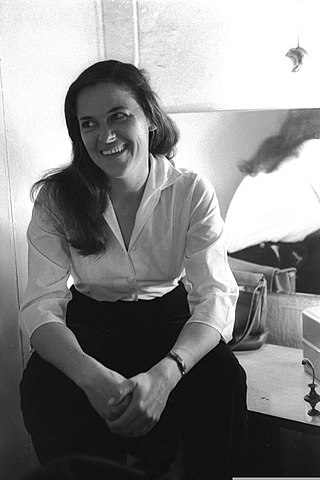
Orna Porat was a German-born Israeli theater actress.
Ralph Bryans, Northern Irish motorcycle racer (b. 1941) deaths

Ralph Bryans was a Grand Prix motorcycle road racer from Northern Ireland. Bryans was Ireland's only Grand Prix world champion, winning the 50 cc title in 1965.
Ananda W.P. Guruge, Sri Lankan scholar and diplomat (b. 1928) deaths

Ananda Wahihana Palliya Guruge, known as Ananda W.P. Guruge, was a Sri Lankan diplomat, Buddhist scholar and writer. Guruge was the former Ambassador Extraordinary and Plenipotentiary of Sri Lanka to UNESCO, France, and United States during the period from 1985 to 1994. Guruge was adjunct professor of Religious Studies at Cal State Fullerton and was the dean of academic affairs at University of the West.
John Woodland Hastings, American biochemist and academic (b. 1927) deaths
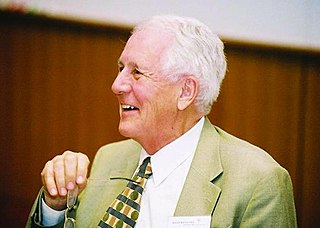
John Woodland "Woody" Hastings, was a leader in the field of photobiology, especially bioluminescence, and was one of the founders of the field of circadian biology. He was the Paul C. Mangelsdorf Professor of Natural Sciences and Professor of Molecular and Cellular Biology at Harvard University. He published over 400 papers and co-edited three books.
Stan Lynde, American author and illustrator (b. 1931) deaths

Myron Stanford Lynde was an American comic strip artist, painter and novelist.
Mava Lee Thomas, American baseball player (b. 1929) deaths
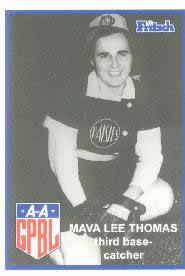
Mava Lee Thomas [′′Tommie′′] was an infielder and catcher who played in the All-American Girls Professional Baseball League. She was a switch-hitter and threw right-handed.
Jerry Wolman, American businessman (b. 1927) deaths

Jerry Wolman was an American developer in Washington, D.C. and owned the Philadelphia Eagles of the National Football League in the 1960s.
Richard Cragun, American-Brazilian ballet dancer and choreographer (b. 1944) deaths

Richard Cragun was an American ballet dancer, teacher and ballet director who performed with the Stuttgart Ballet in Germany from 1965 to 1996.
Marvin Hamlisch, American pianist, composer, and conductor (b. 1944) deaths

Marvin Frederick Hamlisch was an American composer and conductor. Hamlisch was one of only seventeen people to win Emmy, Grammy, Oscar and Tony awards. This collection of all four is referred to as an "EGOT". He is one of only two people to have won those four prizes and a Pulitzer Prize ("PEGOT").
Robert Hughes, Australian-American author and critic (b. 1938) deaths
Robert Studley Forrest Hughes AO was an Australian-born art critic, writer, and producer of television documentaries. He was described in 1997 by Robert Boynton of The New York Times as "the most famous art critic in the world."
Bernard Lovell, English physicist and astronomer (b. 1913) deaths

Sir Alfred Charles Bernard Lovell was an English physicist and radio astronomer. He was the first director of Jodrell Bank Observatory, from 1945 to 1980.
Mark O'Donnell, American playwright (b. 1954) deaths
Mark O’Donnell was an American writer and humorist.
Ruggiero Ricci, American violinist and educator (b. 1918) deaths

Ruggiero Ricci was an American violinist known for performances and recordings of the works of Paganini.
Dan Roundfield, American basketball player (b. 1953) deaths

Danny Thomas Roundfield was an American professional basketball player. The 6'8" forward/center graduated from Detroit's Chadsey Senior High School in 1971. On the collegiate scene, Roundfield was twice selected to the All-Mid-American Conference Team for Central Michigan University; he was also the 1975 MAC Player of the Year.
Fe del Mundo, Filipino pediatrician and educator (b. 1911) deaths

Fe Villanueva del Mundo,, was a Filipina pediatrician. She founded the first pediatric hospital in the Philippines and is known for shaping the modern child healthcare system in the Philippines. Her pioneering work in pediatrics in the Philippines while in active medical practice spanned eight decades. She gained international recognition, including the Ramon Magsaysay Award for Public Service in 1977. In 1980, she was conferred the rank and title of National Scientist of the Philippines, and in 2010, she was conferred the Order of Lakandula. She was the first female president of the Philippine Pediatric Society and the first woman to be named National Scientist of the Philippines in 1980. She was also the founder and the first president of the Philippine Pediatric Society, the first Asian to be elected president of the Philippine Medical Association in its 65-years existence, and the first Asian to be voted president of the Medical Woman's International Association.
Riccardo Cassin, Italian mountaineer and author (b. 1909) deaths
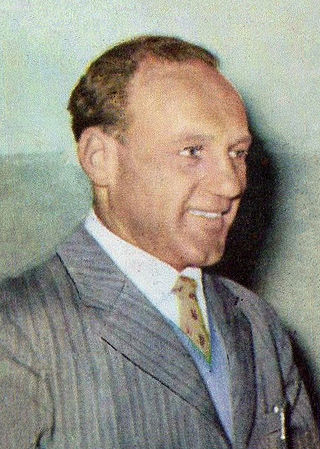
Riccardo Cassin was an Italian mountaineer, developer of mountaineering equipment and author.
Willy DeVille, American singer-songwriter and guitarist (b. 1950) deaths

Willy DeVille was an American singer and songwriter. During his thirty-five-year career, first with his band Mink DeVille (1974–1986) and later on his own, DeVille created original songs rooted in traditional American musical styles. He worked with collaborators from across the spectrum of contemporary music, including Jack Nitzsche, Doc Pomus, Dr. John, Mark Knopfler, Allen Toussaint, and Eddie Bo. Latin rhythms, blues riffs, doo-wop, Cajun music, strains of French cabaret, and echoes of early-1960s uptown soul can be heard in DeVille's work.
John Hughes, American director, producer, and screenwriter (b. 1950) deaths
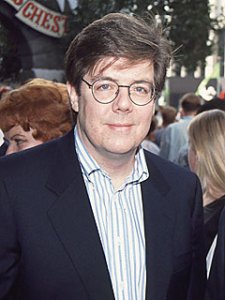
John Wilden Hughes Jr. was an American filmmaker. Hughes began his career in 1970 as an author of humorous essays and stories for the National Lampoon magazine. He went on to Hollywood to write, produce and sometimes direct some of the most successful live-action comedy films of the 1980s and 1990s such as National Lampoon's Vacation; Mr. Mom; Sixteen Candles; Weird Science; The Breakfast Club; Ferris Bueller's Day Off; Pretty in Pink; Some Kind of Wonderful; Planes, Trains and Automobiles; She's Having a Baby; Uncle Buck; Home Alone; Dutch; Beethoven ; Dennis the Menace; and Baby's Day Out.
Angelos Kitsos, Greek lawyer and author (b. 1934) deaths
Angelos Kitsos was the president of Rizarios Foundation .He was a Greek from Monodendri, Zagori. He was member of the Councils of the Foundation for the Restoration of Greeks from Albania and the Foundation of Research of the Ionian and Adriatic space. He was a towering figure for Zagori and the rest of Epirus and Western Greece. Kitsos was a lawyer, but he also worked on script-writing for a number of documentaries, and wrote a number of books.
Zsolt Daczi, Hungarian guitarist (b. 1969) deaths
Zsolt Daczi was a Hungarian guitarist. He was born in Kiskunhalas, Hungary.
Robin Cook, Scottish educator and politician, Secretary of State for Foreign and Commonwealth Affairs (b. 1946) deaths

Robert Finlayson "Robin" Cook was a British Labour politician who served as a Member of Parliament (MP) from 1974 until his death in 2005 and served in the Cabinet as Foreign Secretary from 1997 until 2001 when he was replaced by Jack Straw. He then served as Leader of the House of Commons from 2001 until 2003.

The secretary of state for foreign, Commonwealth and development affairs, known as the foreign secretary, is a minister of the Crown of the Government of the United Kingdom and head of the Foreign, Commonwealth and Development Office. Seen as one of the most senior ministers in the government and a Great Office of State, the incumbent is a member of the Cabinet of the United Kingdom, fourth in the ministerial ranking.
Rick James, American singer-songwriter and producer (b. 1948) deaths

James Ambrose Johnson Jr., better known by his stage name Rick James, was an American singer-songwriter, musician and record producer. Born and raised in Buffalo, New York, James began his musical career in his teenage years. He was in various bands before entering the U.S. Navy Reserve to avoid being drafted into the army. In 1964, James deserted to Toronto, Canada, where he formed the rock band the Mynah Birds, who eventually signed a recording deal with Motown Records in 1966. James's career with the group halted after military authorities discovered his whereabouts and eventually convicted him of desertion related charges. He served several months in jail. After being released, James moved to California, where he started a variety of rock and funk groups in the late 1960s and early 1970s.
Donald Justice, American poet and academic (b. 1925) deaths

Donald Rodney Justice was an American teacher of writing and poet who won the Pulitzer Prize for Poetry in 1980.
Julius Baker, American flute player and educator (b. 1915) deaths
Julius Baker was one of the foremost American orchestral flute players. During the course of five decades he concertized with several of America's premier orchestral ensembles including the Chicago Symphony and the New York Philharmonic Orchestra.
Edsger W. Dijkstra, Dutch physicist, computer scientist, and academic (b. 1930) deaths
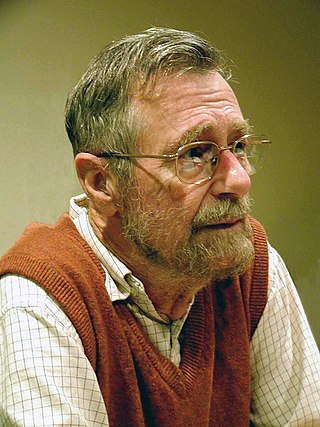
Edsger Wybe Dijkstra was a Dutch computer scientist, programmer, software engineer, systems scientist, and science essayist. He received the 1972 Turing Award for fundamental contributions to developing programming languages, and was the Schlumberger Centennial Chair of Computer Sciences at The University of Texas at Austin from 1984 until 2000.
Jorge Amado, Brazilian novelist and poet (b. 1912) deaths

Jorge Leal Amado de Faria was a Brazilian writer of the modernist school. He remains the best known of modern Brazilian writers, with his work having been translated into some 49 languages and popularized in film, notably Dona Flor and Her Two Husbands in 1976. His work reflects the image of a Mestiço Brazil and is marked by religious syncretism. He depicted a cheerful and optimistic country that was beset, at the same time, with deep social and economic differences.
Adhar Kumar Chatterji, Indian Naval officer (b. 1914) deaths

Admiral Adhar Kumar Chatterji was an Admiral in the Indian Navy. He served as the 6th Chief of the Naval Staff, from 4 March 1966, until 28 February 1970. He was the first Indian officer of the navy to hold the rank of full Admiral. He is credited with the transformation of the Indian Navy. He made sweeping changes and restructured the navy, creating the Western and Eastern Naval Commands and the Western Fleet. Under him, the Indian Navy also entered the submarine age, with the commissioning of INS Kalvari (S23) in 1967.
Wilhelm Mohnke, German general (b. 1911) deaths
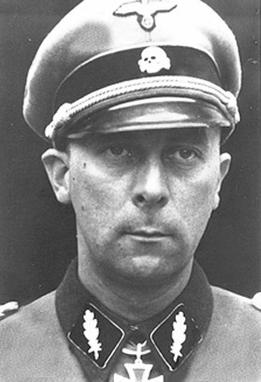
Wilhelm Mohnke was one of the original members of the SS-Staff Guard (Stabswache) "Berlin" formed in March 1933. From those ranks, Mohnke rose to become one of Adolf Hitler's last remaining generals. He joined the Nazi Party in September 1931.
Shan Ratnam, Sri Lankan physician and academic (b. 1928) deaths
Emeritus Professor Sittampalam Shanmugaratnam, also known as Shan Ratnam, was a Singaporean obstetrician and gynaecologist.
Dorothy Tutin, English actress (b. 1930) deaths

Dame Dorothy Tutin, was an English actress of stage, film and television. For her work in the theatre, she won two Olivier Awards and two Evening Standard Awards for Best Actress. She was made a CBE in 1967 and a Dame (DBE) in 2000.
Rebeka Masarova, Spanish-Swiss tennis player births

Rebeka Masarova is a Spanish–Swiss tennis player. She has career-high WTA rankings of 121 in singles and 170 in doubles. The 2016 French Open junior champion started representing Spain in January 2018.
André Weil, French-American mathematician and academic (b. 1906) deaths

André Weil was a French mathematician, known for his foundational work in number theory and algebraic geometry. He was a founding member and the de facto early leader of the mathematical Bourbaki group. The philosopher Simone Weil was his sister. The writer Sylvie Weil is his daughter.
Shin Ki-ha, South Korean lawyer and politician (b. 1941) deaths
Shin Ki-ha, was a South Korean politician. A four-term lawmaker, he was a former parliamentary leader of the South Korean political party National Congress for New Politics.
Rebecca Peterson, Swedish tennis player births

Rebecca Peterson is a Swedish tennis player. She has been ranked as high as 43 in singles and 95 in doubles by the Women's Tennis Association (WTA). Peterson has reached two singles finals on the WTA Tour in 2019, winning both of them. She has also reached one WTA Tour doubles final in 2015, in which she also succeeded to win the title. She also owns a doubles title on the WTA Challenger Tour. On the ITF Women's Circuit, she won 12 singles and six doubles titles.
Domenico Modugno, Italian singer-songwriter and politician (b. 1928) deaths

Domenico Modugno was an Italian singer, actor and, later in life, a member of the Italian Parliament. He is known for his 1958 international hit song "Nel blu dipinto di blu", for which he received Grammy Awards for Record of the Year and Song of the Year. He is considered the first Italian cantautore.
Tex Hughson, American baseball player (b. 1916) deaths

Cecil Carlton Hughson, was a Major League Baseball starting pitcher who played his entire career in the American League with the Boston Red Sox. He batted and threw right-handed.
Leszek Błażyński, Polish boxer (b. 1949) deaths
Leszek Błażyński Polish pronunciation: [ˈlɛʂɛk ˈbwaʐɨj̃skʲi] was a Polish boxer who twice won the bronze medal in the men's flyweight division at the Summer Olympics. He first did so in 1972, when Munich hosted the Games. Four years later in Montreal, he once again captured the bronze, after a loss in the semifinals against eventual winner Leo Randolph of the United States. He
Jiao Liuyang, Chinese swimmer births
Jiao Liuyang is a female Chinese swimmer, who specializes in the 200-metre butterfly.
Shapour Bakhtiar, Iranian soldier and politician, 74th Prime Minister of Iran (b. 1915) deaths

Shapour Bakhtiar was an Iranian politician who served as the last Prime Minister of Iran under the Mohammad Reza Shah Pahlavi. In the words of historian Abbas Milani: "more than once in the tone of a jeremiad he reminded the nation of the dangers of clerical despotism, and of how the fascism of the mullahs would be darker than any military junta". In 1991, he and his secretary were murdered in his home in Suresnes, France, by agents of the Islamic Republic.

The Prime Minister of Iran was a political post that had existed in Iran (Persia) during much of the 20th century. It began in 1906 during the Qajar dynasty and into the start of the Pahlavi dynasty in 1923 and into the 1979 Iranian Revolution before being abolished in 1989.
Roland Michener, Canadian lawyer and politician, 20th Governor General of Canada (b. 1900) deaths

Daniel Roland Michener was a Canadian lawyer, politician, and diplomat who served as Governor General of Canada, the 20th since Canadian Confederation.

The governor general of Canada is the federal viceregal representative of the Canadian monarch, currently King Charles III. The King is head of state of Canada and the 14 other Commonwealth realms, but he resides in his oldest and most populous realm, the United Kingdom. The King, on the advice of his Canadian prime minister, appoints a governor general to carry on the Government of Canada in the King's name, performing most of his constitutional and ceremonial duties. The commission is for an indefinite period—known as serving at His Majesty's pleasure—though five years is the usual length of time. Since 1959, it has also been traditional to alternate between francophone and anglophone officeholders—although many recent governors general have been bilingual.
Harry Reasoner, American journalist, co-created 60 Minutes (b. 1923) deaths
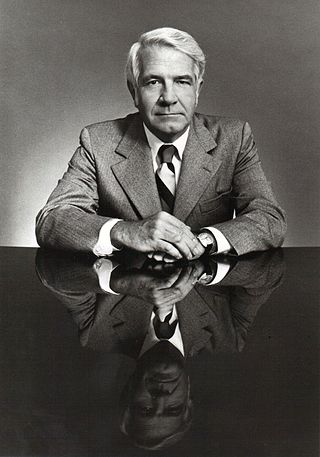
Harry Truman Reasoner was an American journalist for CBS and ABC News, known for his adroit use of language as a television commentator, and as a founder of the long-running 60 Minutes program.

60 Minutes is an American television news magazine broadcast on the CBS television network. Debuting in 1968, the program was created by Don Hewitt and Bill Leonard, who chose to set it apart from other news programs by using a unique style of reporter-centered investigation. In 2002, 60 Minutes was ranked number six on TV Guide's list of the "50 Greatest TV Shows of All Time", and in 2013, it was ranked number 24 on the magazine's list of the "60 Best Series of All Time". The New York Times has called it "one of the most esteemed news magazines on American television".
Jacques Soustelle, French anthropologist and politician (b. 1912) deaths

Jacques Soustelle was an important and early figure of the Free French Forces, a politician who served in the French National Assembly and at one time served as Governor General of Algeria, an anthropologist specializing in Pre-Columbian civilizations, and vice-director of the Musée de l'Homme in Paris in 1939. Soustelle and his followers opposed any compromise with anticolonial activists in Algeria in the Algerian War.
Leanne Crichton, Scottish footballer births

Leanne Crichton is a Scottish international footballer who plays as a midfielder for Motherwell and the Scotland national team. She has previously played for Notts County in the FA WSL as well as Hibernian, Celtic, Whitehill Welfare/Edinburgh Ladies and Glasgow City. She is also a coach, and a media pundit for BBC Scotland's football coverage on radio and television.
Ira C. Eaker, American general (b. 1896) deaths

General Ira Clarence Eaker was a general of the United States Army Air Forces during World War II. Eaker, as second-in-command of the prospective Eighth Air Force, was sent to England to form and organize its bomber command. While he struggled to build up airpower in England, the organization of the Army Air Forces evolved and he was named commander of the Eighth Air Force on December 1, 1942.
Raphael Pyrasch, German rugby player births

Rafael Pyrasch is a German international rugby union player, playing for the Heidelberger RK in the Rugby-Bundesliga and the German national rugby union team.
Emilio Fernández, Mexican actor, director, and screenwriter (b. 1904) deaths

Emilio "El Indio" Fernández Romo was a Mexican film director, actor and screenwriter. He was one of the most prolific film directors of the Golden Age of Mexican cinema in the 1940s and 1950s. He is best known for his work as director of the film María Candelaria (1944), which won the Palme d'Or award at the 1946 Cannes Film Festival. As an actor, he worked in numerous film productions in Mexico and in Hollywood.
Mickaël Delage, French cyclist births

Mickaël Delage is a French former professional road and track cyclist, who last rode for UCI WorldTeam Groupama–FDJ.
Bafétimbi Gomis, French footballer births

Bafétimbi Gomis is a French professional footballer who plays as a striker for Süper Lig club Galatasaray.
Garrett Weber-Gale, American swimmer births

Garrett Weber-Gale is an American competition swimmer, two-time Olympic gold medalist, and world record-holder in two events.
Forbes Burnham, Guyanese politician, 2nd President of Guyana (b. 1923) deaths

Linden Forbes Sampson Burnham was a Guyanese politician and the leader of the Co-operative Republic of Guyana from 1964 until his death in 1985. He served as Prime Minister from 1964 to 1980 and then as its first Executive President from 1980 to 1985. He is often regarded as a strongman who embraced his own version of communism. Throughout his presidency, he encouraged Guyanese to produce and export more local goods, especially through the use of state-run corporations and agricultural cooperatives. Despite being widely regarded as one of the principal architects of the postcolonial Guyanese state, his presidency was nonetheless marred by repeated accusations of Afro-supremacy, state-sanctioned violence, economic collapse, electoral fraud and corruption.
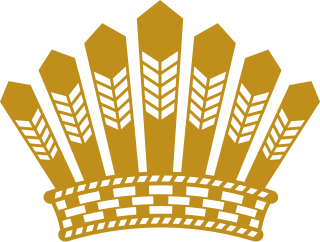
The president of Guyana is the head of state and the head of government of Guyana, as well as the commander-in-chief of the armed forces of the Republic, according to the Constitution of Guyana. The president is also the chancellor of the Orders of Guyana. Concurrent with their constitutional role as Commander-in-Chief of the Armed Forces, the President does not appoint a separate Minister of Defence. That portfolio is held by the President who fulfils all responsibilities designated to a minister of defence under the Defence Act.
Vedad Ibišević, Bosnian footballer births

Vedad Ibišević is a Bosnian former professional footballer who played as a forward. He is currently a member of the coaching staff of Hertha BSC.
Maja Ognjenović, Serbian volleyball player births

Maja Ognjenović is a Serbian volleyball player and the captain of the Serbia women's national volleyball team. With the national team, she won the gold medal at the 2011 European Championship, silver medal at the 2007 European Championship, bronze medal at the 2006 World Championship. She won the silver medal at the 2016 Rio Olympics. In 2018, she has won the gold medal at the 2018 FIVB Volleyball Women's World Championship. During the 2020 Tokyo Olympics, she has won the bronze medal.
Jesse Ryder, New Zealand cricketer births
Jesse Daniel Ryder is a former international New Zealand cricketer, who played all forms of the game. He is a middle-order batsman for Tests and is an opening batsman in ODIs. Ryder also bowls useful medium-pace.
Robin van Persie, Dutch footballer births

Robin van Persie is a Dutch football coach and former professional footballer who played as a striker. Regarded as one of the best strikers of his generation, Van Persie was known for his excellent technique and ball control, intelligent positioning, and vision. He is the all-time top scorer for the Netherlands national team. He is currently an assistant manager at boyhood club Feyenoord in his first managerial role.
Klaus Nomi, German singer-songwriter and actor (b. 1944) deaths

Klaus Sperber, known professionally as Klaus Nomi, was a German countertenor noted for his wide vocal range and an unusual, otherworldly stage persona.
Diána Póth, Hungarian figure skater births

Diána Póth is a Hungarian former competitive figure skater. She is a two-time Karl Schäfer Memorial silver medalist and a two-time Hungarian national champion. She also competed briefly for Austria.
Francesco Bellotti, Italian cyclist births

Francesco Bellotti is an Italian former professional road bicycle racer, who last rode for UCI ProTour team Liquigas–Cannondale.
Jaime Correa, Mexican footballer births

Jaime Correa Córdoba also known as "El Alacran" or "El Motor", is a Mexican former professional footballer who played as a midfielder. He made his debut for the Mexico national team in the 2007 Copa América against Brazil.
Travis Reed, American basketball player births

Travis Reed is an American retired professional basketball player. Reed played college basketball for UCLA and Long Beach State. He played professionally in the Netherlands, Estonia, Romania, Australia and Germany.
Feodor Felix Konrad Lynen, German biochemist and academic, Nobel Prize laureate (b. 1911) deaths

Feodor Felix Konrad Lynen was a German biochemist. In 1964 he won the Nobel Prize in Physiology or Medicine together with Konrad Bloch for their discoveries concerning the mechanism and regulation of cholesterol and fatty acid metabolism while he was director of the Max-Planck Institute for Cellular Chemistry in Munich.

The Nobel Prize in Physiology or Medicine is awarded yearly by the Nobel Assembly at the Karolinska Institute for outstanding discoveries in physiology or medicine. The Nobel Prize is not a single prize, but five separate prizes that, according to Alfred Nobel's 1895 will, are awarded "to those who, during the preceding year, have conferred the greatest benefit to humankind". Nobel Prizes are awarded in the fields of Physics, Chemistry, Physiology or Medicine, Literature, and Peace.
Marvel Smith, American football player births

Marvel Amos Smith is a former American football offensive tackle who played nine seasons in the National Football League (NFL). He played college football for Arizona State University. He was drafted by the Pittsburgh Steelers in the second round of the 2000 NFL Draft, and also was a member of the San Francisco 49ers. A one-time Pro Bowl selection, Smith earned two Super Bowl rings with the Steelers.
Pope Paul VI (b. 1897) deaths

Pope Paul VI was head of the Catholic Church and sovereign of the Vatican City State from 21 June 1963 to his death in August 1978. Succeeding John XXIII, he continued the Second Vatican Council, which he closed in 1965, implementing its numerous reforms. He fostered improved ecumenical relations with Eastern Orthodox and Protestant churches, which resulted in many historic meetings and agreements.
Edward Durell Stone, American architect, designed Radio City Music Hall and the Kennedy Center (b. 1902) deaths
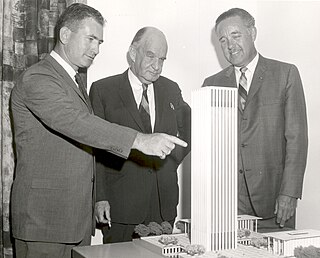
Edward Durell Stone was an American architect known for the formal, highly decorative buildings he designed in the 1950s and 1960s. His works include the Museum of Modern Art, in New York City, the Museo de Arte de Ponce in Ponce, Puerto Rico, the United States Embassy in New Delhi, India, The Keller Center at the University of Chicago, and the John F. Kennedy Center for the Performing Arts in Washington, D.C.

Radio City Music Hall is an entertainment venue and theater at 1260 Avenue of the Americas, within Rockefeller Center, in the Midtown Manhattan neighborhood of New York City. Nicknamed "The Showplace of the Nation", it is the headquarters for the Rockettes. Radio City Music Hall was designed by Edward Durell Stone and Donald Deskey in the Art Deco style.

The John F. Kennedy Center for the Performing Arts is the United States National Cultural Center, located on the Potomac River in Washington, D.C. It was named in 1964 as a memorial to assassinated President John F. Kennedy. Opened on September 8, 1971, the center hosts many different genres of performance art, such as theater, dance, orchestras, jazz, pop, psychedelic, and folk music.
Leandro Amaral, Brazilian footballer births
Leandro Câmara do Amaral, is a Brazilian former footballer who played as a striker.
Jimmy Nielsen, Danish footballer and manager births

Jimmy Nielsen is a Danish-American retired footballer who played as a goalkeeper.
Luciano Zavagno, Argentinian footballer births
Luciano Germán Zavagno is an Argentine retired footballer.
Melissa George, Australian-American actress births

Melissa George is an Australian-American actress and entrepreneur. A former national artistic rollerskating champion and model, George began her acting career playing Angel Parrish in the Australian soap opera Home and Away (1993–1996). After moving to the United States, George made her feature film debut in Dark City (1998). She later had supporting roles in Steven Soderbergh's The Limey (1999), David Lynch's Mulholland Drive (2001), Sugar & Spice (2001), and Down with Love (2003).
Gregor Piatigorsky, Russian-American cellist and educator (b. 1903) deaths

Gregor Piatigorsky was a Russian Empire-born American cellist.
Jason Crump, English-Australian motorcycle racer births
Jason Philip Crump is an Australian international motorcycle speedway rider. He is a three-time Speedway World Champion, a World Cup winner and a former World Under-21 Champion.
Renate Götschl, Austrian skier births

Renate Götschl is a former champion alpine ski racer. She is a two-time individual World Champion in the combined (1997) and downhill (1999), and has won a total of 9 World Championships medals. She also won two Olympic medals in 2002, the bronze medal in downhill and the silver medal in the combined.
Víctor Zambrano, Venezuelan baseball player births

Víctor Manuel Zambrano is a Venezuelan former professional baseball pitcher. He played all or parts of seven seasons in Major League Baseball (MLB) from 2001-07.
Bobby Petta, Dutch footballer births

Alfred Manuel "Bobby" Petta is a Dutch footballer who played as a left winger.
Luis Vizcaíno, Dominican baseball player births

Luis Vizcaíno Árias is a Dominican Republic former professional baseball pitcher. He played for the Oakland Athletics, Milwaukee Brewers, Chicago White Sox, Arizona Diamondbacks, New York Yankees, Colorado Rockies, Chicago Cubs, and Cleveland Indians in his career.
Alvin Williams, American basketball player and coach births

Alvin Leon Williams Jr. is an American retired professional basketball player who played for Villanova University and in the National Basketball Association (NBA) from 1997 to 2007.
Vera Farmiga, American actress births

Vera Ann Farmiga is an American actress who is best known for portraying paranormal investigator Lorraine Warren in the Conjuring Universe films The Conjuring (2013), The Conjuring 2 (2016), Annabelle Comes Home (2019) and The Conjuring: The Devil Made Me Do It (2021).
Stuart O'Grady, Australian cyclist births

Stuart O'Grady is a retired Australian professional road bicycle racer, who rode as a professional between 1995 and 2013. A former track cyclist, O'Grady and Graeme Brown won a gold medal in the Men's Madison at the 2004 Summer Olympics. O'Grady also won Paris–Roubaix in 2007. O'Grady competed in the Tour de France from 1997 and contended for the points classification in the Tour de France known as the green jersey, finishing second in the 1998, 1999, 2001 and 2005 races. He wore the yellow jersey of general classification leader in 1998 and 2001.
Fulgencio Batista, Cuban colonel and politician, 9th President of Cuba (b. 1901) deaths

Fulgencio Batista y Zaldívar was a Cuban military officer and politician who served as the elected president of Cuba from 1940 to 1944 and as its U.S.-backed military dictator from 1952 to 1959, when he was overthrown by the Cuban Revolution.

This article lists the heads of state of Cuba from 1902 until the present day.
Geri Halliwell, English singer-songwriter, dancer, and actress births

Geraldine Estelle Horner is an English singer, songwriter, author, and actress. She rose to prominence in the 1990s as Ginger Spice, a member of the girl group the Spice Girls. With over 100 million records sold worldwide, the Spice Girls are the best-selling female group of all time. Their slogan "girl power" was most closely associated with Halliwell, and her Union Jack dress from the 1997 Brit Awards also became an enduring symbol. Halliwell left the Spice Girls in 1998, citing exhaustion and creative differences, but rejoined when they reunited in 2007.
Ray Lucas, American football player and sportscaster births
Ray Lucas is a former American football quarterback in the National Football League. He played for three teams, the New England Patriots, New York Jets, Miami Dolphins during his seven-year career from 1996 to 2002. He is currently a studio analyst for the show Jets Nation on New York City-based sports network SportsNet New York.
M. Night Shyamalan, Indian-American director, producer, and screenwriter births

Manoj Nelliyattu "M. Night" Shyamalan is an Indian-American filmmaker and actor. He is best known for making original films with contemporary supernatural plots and twist endings. He was born in Mahé, India, and raised in Penn Valley, Pennsylvania. The cumulative gross of his films exceeds $3.4 billion globally.
Nikos Tsiforos, Greek director and screenwriter (b. 1912) deaths
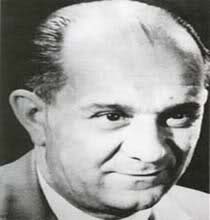
Nikos Tsiforos was a Greek humorist, screenwriter, and film director. He had more than 60 film scripts to his credit between 1948 and 1970. He further directed 17 films between 1948 and 1961.
Simon Doull, New Zealand cricketer and sportscaster births

Simon Blair Doull is a New Zealand radio personality, commentator and former international cricketer. He was a right-arm medium pacer, who was capable of swing bowling away from the right hander, Simon Doull was plagued by injuries as a result of which his international career was cut short. Playing for the New Zealand national cricket team, he figured in just 32 Tests and 42 ODIs, taking 98 and 36 wickets respectively. Doull's finest hour arrived when he took 7–65 against India in the Boxing day Wellington Test in 1998. He played his last Test, against Australia, in March 2000 before turning to commentary and broadcasting.
Elliott Smith, American singer-songwriter and guitarist (d. 2003) births

Steven Paul Smith, known professionally as Elliott Smith, was an American singer-songwriter and multi-instrumentalist. Smith was born in Omaha, Nebraska, raised primarily in Texas, and lived much of his life in Portland, Oregon, where he first gained popularity. Smith's primary instrument was the guitar, though he also played piano, clarinet, bass guitar, drums, and harmonica. Smith had a distinctive vocal style, characterized by his "whispery, spiderweb-thin delivery", and often used multi-tracking to create vocal layers, textures, and harmonies.
Theodor W. Adorno, German sociologist and philosopher (b. 1903) deaths

Theodor W. Adorno was a German philosopher, sociologist, psychologist, musicologist, and composer.
Jack de Gier, Dutch footballer births
Jack de Gier is a Dutch professional football manager and former player who played as a forward. He is the current manager of FC Den Bosch.
Lorna Fitzsimons, English businesswoman and politician births
Lorna Fitzsimons is a British business and public sector executive. She was the Labour Party Member of Parliament (MP) for Rochdale from 1997 to 2005.
Mike Greenberg, American journalist and sportscaster births

Michael Robinette Greenberg is a television anchor, television show host, radio show host for ESPN and ABC, and novelist. At ESPN, he hosted the weekday evening, most often Monday, SportsCenter and previously ESPN Radio's Mike & Mike show with Mike Golic. At sister network ABC, he was the host of Duel, which aired from 2007 to 2008, and co-hosted Battle of the Network Stars with Joe Tessitore.
Julie Snyder, Canadian talk show host and producer births

Julie Snyder is a Francophone Canadian talk show host and producer, appearing as host or guest on various television programs in Canada and France.
Stéphane Peterhansel, French racing driver births

Stéphane Peterhansel is a rally driver from France. He holds the record for wins at the Dakar Rally, with 14 victories. In the 2018 season he was one of the official drivers of the Team Peugeot Total.
Yuki Kajiura, Japanese pianist and composer births

Yuki Kajiura is a Japanese musician, composer and record producer. She has provided the music for several popular anime series, such as the final Kimagure Orange Road movie, Noir, .hack//Sign, Aquarian Age, Madlax, My-HiME, My-Otome, Pandora Hearts, Puella Magi Madoka Magica, Fate/Zero, Sword Art Online, Tsubasa: Reservoir Chronicle, Demon Slayer: Kimetsu no Yaiba, Kara no Kyoukai movies and Vanitas no Karte, amongst many others. She also assisted Toshihiko Sahashi with Mobile Suit Gundam SEED and Mobile Suit Gundam SEED Destiny. Kajiura has also composed for video games, including the cutscene music for Xenosaga II and the entire Xenosaga III game soundtrack. She composed the music for NHK's April 2014 morning drama (asadora) Hanako to Anne.
David Robinson, American basketball player and lieutenant births

David Maurice Robinson is an American former professional basketball player who played for the San Antonio Spurs in the National Basketball Association (NBA) from 1989 to 2003, and minority owner of the Spurs. Nicknamed "the Admiral" for his service with the U.S. Navy, Robinson was a 10-time NBA All-Star, the 1995 NBA MVP, a two-time NBA champion, a two-time Olympic Gold Medal winner, a two-time Naismith Memorial Basketball Hall of Fame inductee, and a two-time U.S. Olympic Hall of Fame inductee. He was honored as one of the league's all-time players by being named to the NBA 50th Anniversary (1996) and 75th Anniversary Teams (2021). He is widely considered one of the greatest centers in both college basketball and NBA history.
Vince Wells, English cricketer births
Vincent John Wells is an English former professional cricketer. He played nine One Day Internationals for the England cricket team in 1999 and was a member of the squad for the 1999 Cricket World Cup.
Kemi Omololu-Olunloyo, Nigerian journalist, activist, social media expert, and pharmacist births

Olukemi Omololu-Olunloyo is a Nigerian journalist, blogger, and activist against gun violence, and a social media personality. She is well known within the Nigerian online community, especially for making highly disputed and controversial claims about subjects with high emotional stakes, such as the End SARS protests in 2020 and the death of a private school student from Lagos. Omololu-Olunloyo has also faced heavy criticisms for various claims she has made about her life and career; as many of such claims have been either proven to be false or fabricated.
Cedric Hardwicke, English actor and director (b. 1893) deaths
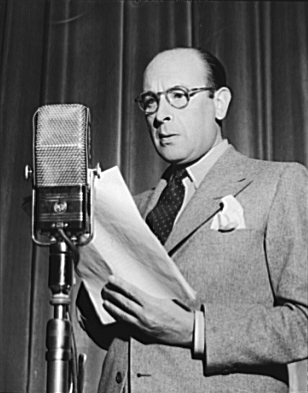
Sir Cedric Webster Hardwicke was an English stage and film actor whose career spanned nearly 50 years. His theatre work included notable performances in productions of the plays of Shakespeare and Shaw, and his film work included leading roles in several adapted literary classics.
Charles Ingram, English soldier, author, and game show contestant births

Charles William Ingram is an English novelist and former British Army major who gained notoriety for his appearance on the ITV television game show Who Wants to Be a Millionaire?. In episodes recorded in September 2001, Ingram correctly answered fifteen questions to win the show's maximum prize of £1 million, becoming the third recorded contestant to ever do so. However he was denied the winnings due to suspicion of cheating.
Kevin Mitnick, American computer hacker and author births

Kevin David Mitnick is an American computer security consultant, author, and convicted hacker. He is best known for his high-profile 1995 arrest and five years in prison for various computer and communications-related crimes.
Michelle Yeoh, Malaysian-Hong Kong actress and producer births

Michelle Yeoh Choo Kheng, is a Malaysian actress. Credited as Michelle Khan in her early Hong Kong films, she rose to fame in the 1990s after starring in a series of Hong Kong action films where she performed her own stunts, such as Yes, Madam (1985), Police Story 3: Supercop (1992) and Holy Weapon (1993). She gained international recognition for her roles in the James Bond film Tomorrow Never Dies (1997) and in Ang Lee's martial arts film Crouching Tiger, Hidden Dragon (2000). The latter role earned her a BAFTA Best Actress nomination.
Mary Ann Sieghart, English journalist and radio host births

Mary Ann Corinna Howard Sieghart is an English author, journalist, radio presenter and former assistant editor of The Times, where she wrote columns about politics, social affairs and life in general. She has also written a weekly political column in The Independent. Her best-selling book, The Authority Gap: Why Women Are Still Taken Less Seriously Than Men, and What We Can Do About It, was published by Transworld/Doubleday in July 2021.
Dale Ellis, American basketball player births
Dale Ellis is an American former professional basketball player who played in the National Basketball Association (NBA). At various points in his career, Ellis held the record for the most career 3-point field goals made, until Reggie Miller surpassed him. His 1,719 career made three-pointers ranked 2nd in NBA history at the time of his retirement.
Rajendra Singh, Indian environmentalist births
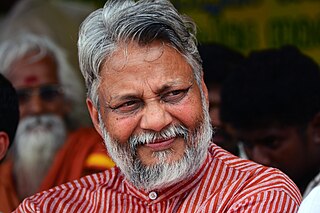
Rajendra Singh is an Indian water conservationist and environmentalist from Alwar district, Rajasthan in India. Also known as "waterman of India", he won the Magsaysay Award in 2001 and Stockholm Water Prize in 2015. He runs an NGO called 'Tarun Bharat Sangh' (TBS), which was founded in 1975. The NGO based in village hori-Bhikampura in Thanagazi tehsil, near Sariska Tiger Reserve, has been instrumental in fighting the slow bureaucracy, mining lobby and has helped villagers take charge of water management in their semi-arid area as it lies close to Thar Desert, through the use of johad, rainwater storage tanks, check dams and other time-tested as well as path-breaking techniques. Starting from a single village in 1985, over the years TBS helped build over 8,600 johads and other water conservation structures to collect rainwater for the dry seasons, has brought water back to over 1,000 villages and revived five rivers in Rajasthan, Arvari, Ruparel, Sarsa, Bhagani and Jahajwali. He is one of the members of the National Ganga River Basin Authority (NGRBA) which was set up in 2009, by the Government of India as an empowered planning, financing, monitoring and coordinating authority for the Ganges (Ganga), in exercise of the powers conferred under the Environment (Protection) Act, 1986. In the UK he is a founder member of an NGO called the Flow Partnership. which aims to counter the negative effects of soil erosion and flooding.
Preston Sturges, American director, screenwriter, and playwright (b. 1898) deaths

Preston Sturges was an American playwright, screenwriter, and film director. In 1941, he won the Oscar for Best Original Screenplay for the film The Great McGinty (1940), his first of three nominations in the category.
Randy DeBarge, American singer-songwriter and bass player births
William Randall DeBarge is an American R&B/soul singer and bass guitarist, best known for being one of the original members of the popular Motown singing family group DeBarge. Randy is also known for singing co-lead and penning lyrics with brother El on the group's first hit, "I Like It" (1982).
Bob Horner, American baseball player births

James Robert Horner is an American former professional baseball player. He played in Major League Baseball and the Nippon Professional Baseball league as a third baseman and a first baseman from 1978 to 1988, most prominently as a member of the Atlanta Braves where he was named the 1978 National League (NL) Rookie of the Year and was a member of the 1982 National League All-Star team.
Jim McGreevey, American lawyer and politician, 52nd Governor of New Jersey births

James Edward McGreevey is an American politician and member of the Democratic Party who served as the 52nd governor of New Jersey from 2002 until his resignation in 2004 following the revelation of his extramarital affair with a gubernatorial appointee.

The governor of New Jersey is the head of government of New Jersey. The office of governor is an elected position with a four-year term. There is a two consecutive term term limit, with no limitation on non-consecutive terms. The official residence of the governor is Drumthwacket, a mansion located in Princeton, New Jersey. The governor’s office is located inside of the New Jersey State House in Trenton, making New Jersey notable as the executive’s office is located in the same building as the legislature. New Jersey is also notable for being one of the few states in which the governor’s official residence is not located in the state capital.
Bill Emmott, English journalist and author births

William John Emmott is an English journalist, author, and consultant best known as the editor-in-chief of The Economist newspaper from 1993 to 2006. Emmott has written fourteen books and worked on two documentary feature films. He co-founded the Wake Up Foundation, an educational charity dedicated to raising awareness of the dangers facing Western societies. He is now chairman of the Trinity College Long Room Hub for Arts & Humanities in Dublin, of the International Institute for Strategic Studies and of the Japan Society of the UK in London.
Mark Hughes, English-Australian rugby league player births
Mark Stephen Hughes is an English-born Australian former professional rugby league footballer who played for Canterbury-Bankstown in the 1970s and 1980s. He mostly played lock, but he also spent time playing centre and five-eighth. He is the brother of Garry Hughes and Graeme Hughes, and the uncle of Corey Hughes, Glen Hughes and Steven Hughes.
Pat MacDonald, American singer-songwriter and guitarist births

Patrick Lee "Pat" MacDonald is an American musician and songwriter. He is the singer, guitarist, and main songwriter for Timbuk 3, nominated for a Grammy Award for Best New Artist in 1987. He formed the duo with his wife, Barbara K. MacDonald, in Madison, Wisconsin in 1984 before moving to Austin, Texas, that same year. Their breakup in 1995 spurred a solo career that has steadily produced releases in both Europe and the US. "MacDonald is long known for his playful, edgy songs," says Guitar Player magazine.
David McLetchie, Scottish lawyer and politician (d. 2013) births
David William McLetchie CBE was a Scottish politician who served as Leader of the Scottish Conservative Party from 1999 to 2005. He was Member of the Scottish Parliament (MSP) for the Edinburgh Pentlands constituency from 2003 to 2011 and the Lothian region from 1999 to 2003 and 2011 to 2013.
Ton Scherpenzeel, Dutch keyboard player, songwriter, and producer births

Ton Scherpenzeel is a Dutch keyboardist, composer, lyricist, and founding member of progressive rock band Kayak, together with Pim Koopman and Max Werner whom he met whilst at the Hilversum Muziek Lyceum. Scherpenzeel is the only Kayak member who has played on every Kayak album. Apart from composing the music, writing lyrics, and playing keyboards, he also plays accordion, occasional bass guitar (for instance on the entire Nostradamus album) and double bass. He also provides backing vocals and sings lead vocals on the song "Love's Aglow" on the original Merlin album. In 2021, Kayak released their 18th studio album, 'Out of This World'. Ton announced Nov/2021, that Kayak will embark on their 'Farewell Tour' (Spring/2022) throughout countries: The Netherlands, England, Germany, Belgium, Denmark, Sweden and Norway. This will take place during the 50-year anniversary of the band. He did not rule out the possibility of occasional reunion performances. Scherpenzeel has a notable fear of flying, that has limited his touring to the European continent.. Subsequent to Kayak, Scherpenzeel was also occasional keyboardist of Camel, a British Progressive Rock band. Ton was the keyboardist on several Camel albums: Stationary Traveller (1984), Pressure Points: Live in Concert (1984), Dust and Dreams (1991), Rajaz (1999) and he performed live on Camel's 2003 Farewell Tour. He also played several years with Earth and Fire.
Betty Allan, Australian statistician and biometrician (b. 1905) deaths
Frances Elizabeth Allan (1905–1952) was an Australian statistician. She was known as the first statistician at the Commonwealth Scientific and Industrial Research Organisation (CSIRO), as "the effective founder of the CSIRO Division of Mathematics and Statistics", and for her advocacy of biometrics.
Biostatistics are the development and application of statistical methods to a wide range of topics in biology. It encompasses the design of biological experiments, the collection and analysis of data from those experiments and the interpretation of the results.
Catherine Hicks, American actress births
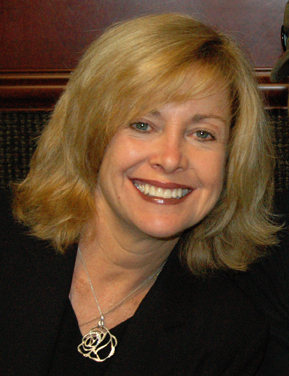
Catherine Mary Hicks is an American actress. She played the character Annie Camden on the long-running television series 7th Heaven. Other roles included Dr. Faith Coleridge on the soap opera Ryan's Hope (1976–1978), her Emmy Award-nominated performance as Marilyn Monroe in Marilyn: The Untold Story (1980), Dr. Gillian Taylor in Star Trek IV: The Voyage Home (1986), and Karen Barclay in Child's Play (1988).
Daryl Somers, Australian television host and singer births
Daryl Paul Somers is an Australian television personality and musician, and a triple Gold Logie award-winner. He rose to national fame as the host and executive producer of the long-running comedy-variety program Hey Hey It's Saturday and continued his television celebrity and status as host of the live-performance program Dancing with the Stars.
Dorian Harewood, American actor births

Dorian Harewood is an American actor, best known for playing Jesse Owens in The Jesse Owens Story (1984), Paul Strobber on Strike Force (1981–1982), and Rev. Morgan Hamilton in 7th Heaven (1996–2003).
Dino Bravo, Italian-Canadian wrestler (d. 1993) births

Adolfo Bresciano was an Italian-Canadian professional wrestler and promoter, better known by the ring name Dino Bravo.
Radhia Cousot, French computer scientist and academic (d. 2014) births
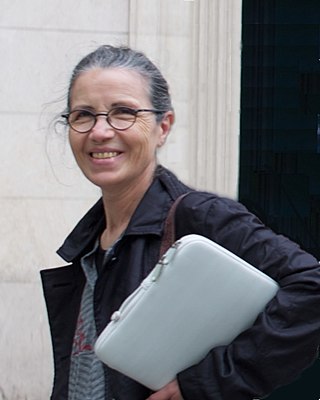
Radhia Cousot was a French computer scientist known for inventing abstract interpretation.
Allan Holdsworth, English guitarist, songwriter, and producer (d. 2017) births

Allan Holdsworth was a British jazz fusion and progressive rock guitarist and composer.
Tony Lazzeri, American baseball player and coach (b. 1903) deaths

Anthony Michael Lazzeri was an American professional baseball second baseman during the 1920s and 1930s, predominantly with the New York Yankees of Major League Baseball. He was part of the famed "Murderers' Row" Yankee batting lineup of the late 1920s, along with Babe Ruth, Lou Gehrig, and Bob Meusel.
Ron Jones, English director and production manager (d. 1993) births
Ron Jones was a British television director.
Richard Bong, American soldier and pilot, Medal of Honor recipient (b. 1920) deaths

Richard "Dick" Ira Bong was a United States Army Air Forces major and Medal of Honor recipient in World War II. He was one of the most decorated American fighter pilots and the country's top flying ace in the war, credited with shooting down 40 Japanese aircraft, all with the Lockheed P-38 Lightning fighter. He died in California while testing a Lockheed P-80 jet fighter shortly before the war ended. Bong was posthumously inducted into the National Aviation Hall of Fame in 1986 and has several commemorative monuments named in his honor around the world, including an airport, two bridges, a theater, a veterans historical center, a recreation area, a neighborhood terrace, and several avenues and streets, including the street leading to the National Museum of the United States Air Force in Dayton, Ohio.
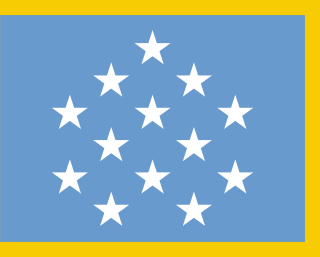
The Medal of Honor (MOH) is the United States Armed Forces' highest military decoration and is awarded to recognize American soldiers, sailors, marines, airmen, guardians and coast guardsmen who have distinguished themselves by acts of valor. The medal is normally awarded by the president of the United States, but as it is presented "in the name of the United States Congress", it is sometimes erroneously referred to as the "Congressional Medal of Honor".
Hiram Johnson, American lawyer and politician, 23rd Governor of California (b. 1866) deaths

Hiram Warren Johnson was an American attorney and politician who served as the 23rd governor of California from 1911 to 1917. Johnson achieved national prominence in the early 20th century. He was elected in 1916 as the United States Senator from California, where he was repeatedly re-elected and served until 1945.

The governor of California is the head of government of the U.S. state of California. The governor is the commander-in-chief of the California National Guard and the California State Guard.
Inday Badiday, Filipino journalist and actress (d. 2003) births
Maria Lourdes Jimenez Carvajal, popularly known as Inday Badiday, was a Filipino TV host and journalist who was known as Philippine television's "queen of showbiz talk shows" and "queen of intrigues".
Michael Mingos, English chemist and academic births
David Michael Patrick Mingos, FRS is a British chemist and academic. He was Principal of St Edmund Hall, Oxford from 1999 to 2009, and Professor of Inorganic Chemistry at the University of Oxford.
Martin Wharton, English bishop births
John Martin Wharton, is a British Anglican bishop, a retired Bishop of Newcastle.
Jon Postel, American computer scientist and academic (d. 1998) births
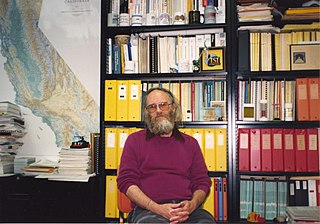
Jonathan Bruce Postel was an American computer scientist who made many significant contributions to the development of the Internet, particularly with respect to standards. He is known principally for being the Editor of the Request for Comment (RFC) document series, for Simple Mail Transfer Protocol (SMTP), and for administering the Internet Assigned Numbers Authority (IANA) until his death. During his lifetime he was referred to as the "god of the Internet" for his comprehensive influence; Postel himself noted that this "compliment" came with a barb, the suggestion that he should be replaced by a "professional," and responded with typical self-effacing matter-of-factness: "Of course, there isn’t any 'God of the Internet.' The Internet works because a lot of people cooperate to do things together."
Byard Lancaster, American saxophonist and flute player (d. 2012) births
Byard Lancaster was an avant-garde jazz saxophonist and flutist.
Ray Culp, American baseball player births

Raymond Leonard Culp is an American former professional baseball pitcher. He played in Major League Baseball (MLB) for the Philadelphia Phillies (1963–1966), Chicago Cubs (1967), and Boston Red Sox (1968–1973).
Mukhu Aliyev, Russian philologist and politician, 2nd President of Dagestan births

Mukhu Gimbatovich Aliyev is a Russian politician who served as the 2nd Head of the Republic of Dagestan, a federal subject of Russia. He was born in the village of Tanusi, Khunzakhsky District, Dagestan ASSR, Russian SFSR, Soviet Union. Ethnically, he is Avar. He was the speaker of the Republic's parliament before being accepted as the President by the Dagestan parliament on February 20, 2006, having been nominated by the Russian President Vladimir Putin to replace Dagestan's long-time leader Magomedali Magomedov.
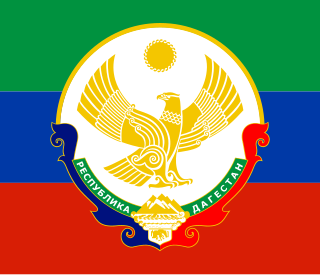
The Head of the Republic of Dagestan is the highest official and the head of the executive power of the Republic of Dagestan. The Head is Dagestan’s Head of State and Head of Government.
Egil Kapstad, Norwegian pianist and composer (d. 2017) births

Egil Kapstad was a Norwegian jazz pianist, composer and arranger. He wrote the music for more than 50 theatre productions, and composed for film and television drama. Kapstad composed classical works for orchestra, choir, string quartet, and smaller ensembles, and was a chief executive of the association Ny Musikk. He worked as a host in television for NRK. Egil Kapstad's Trio worked as a small orchestra in the Norwegian Melodi Grand Prix of 1965.
Louise Sorel, American actress births

Louise Jacqueline Sorel is an American actress. She is perhaps best known for her role as Vivian Alamain in Days of Our Lives from 1992 to 2000, 2009 to 2011, 2017 to 2018, and 2020, Augusta Wainwright on Santa Barbara from 1984 to 1991, and Emily Tanner on Beacon Hill since 2014.
Paul Bartel, American actor, director, and screenwriter (d. 2000) births
Paul Bartel was an American actor, writer and director. He was perhaps most known for his 1982 hit black comedy Eating Raoul, which he wrote, starred in and directed.
Peter Bonerz, American actor and director births
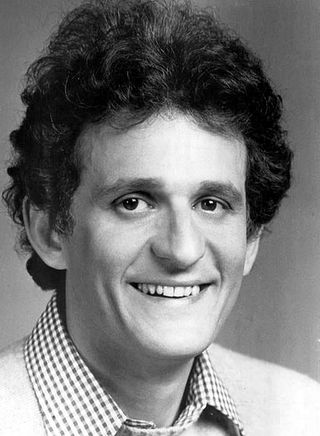
Peter R Bonerz is an American actor and director.
Bert Yancey, American golfer (d. 1994) births
Albert Winsborough Yancey was an American professional golfer who won seven times on the PGA Tour and later played on the Senior PGA Tour.
Baden Powell de Aquino, Brazilian guitarist and composer (d. 2000) births
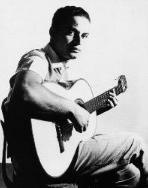
Baden Powell de Aquino, known professionally as Baden Powell, was a Brazilian guitarist. He combined classical techniques with popular harmony and swing. He performed in many styles, including bossa nova, samba, Brazilian jazz, Latin jazz and MPB. He performed on stage during most of his lifetime. Powell composed many pieces for guitar, such as "Abração em Madrid", "Braziliense", "Canto de Ossanha", "Casa Velha", "Consolação", "Horizon", "Imagem", "Lotus", "Samba", "Samba Triste", "Simplesmente", "Tristeza e Solidão", and "Samba da Benção". He released Os Afro-sambas, a watershed album in MPB, with Vinicius de Moraes in 1966.
Charlie Haden, American bassist and composer (d. 2014) births

Charles Edward Haden was an American jazz double bass player, bandleader, composer and educator whose career spanned more than 50 years. In the late 1950s, he was an original member of the ground-breaking Ornette Coleman Quartet.
Barbara Windsor, English actress (d. 2020) births

Dame Barbara Windsor was an English actress, known for her roles in the Carry On films and for playing Peggy Mitchell in the BBC One soap opera, EastEnders. She joined the cast of EastEnders in 1994 and won the 1999 British Soap Award for Best Actress, before ultimately leaving the show in 2016 when her character was killed off.
Fortunato Baldelli, Italian cardinal (d. 2012) births
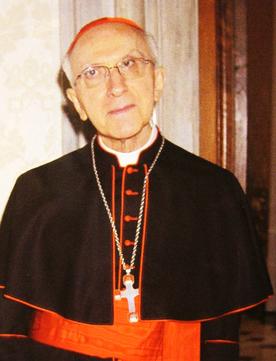
Fortunato Baldelli was an Italian prelate of the Catholic Church who was appointed a cardinal in 2010 after a career in the diplomatic service of the Holy See from 1966 to 2009 that included ten years as Apostolic Nuncio to France. He was also the Major Penitentiary of the Apostolic Penitentiary from 2009 to 2012.
Octavio Getino, Spanish-Argentinian director and screenwriter (d. 2012) births
Octavio Getino was an Argentine film director and writer who is best known for co-founding, along with Fernando Solanas, the Grupo Cine Liberación and the school of Third Cinema.
Piers Anthony, English-American soldier and author births
Piers Anthony Dillingham Jacob is an American author in the science fiction and fantasy genres, publishing under the name Piers Anthony. He is best known for his long-running novel series set in the fictional realm of Xanth.
Chris Bonington, English mountaineer and author births
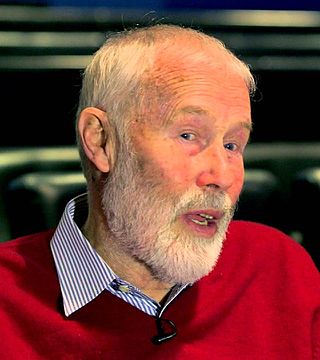
Sir Christian John Storey Bonington, CVO, CBE, DL is a British mountaineer.
Billy Boston, Welsh rugby player and soldier births
William John Boston, MBE is a Welsh former professional rugby league footballer who played as a wing or centre. Born in Cardiff, Wales, Boston started his career as a rugby union player before joining Wigan in 1953. He spent the next 15 years at Wigan, where he scored a club-record 478 tries in his 488 appearances for the club. He finished his career at Blackpool Borough before retiring in 1970. He also represented Great Britain in 31 Test matches, and was part of the team that won the 1960 Rugby League World Cup.
A. G. Kripal Singh, Indian cricketer (d. 1987) births
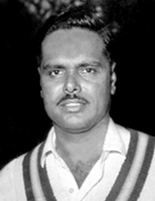
Amritsar Govindsingh Kripal Singh pronunciation (help·info) was an Indian Test cricketer.
Michael Deeley, English screenwriter and producer births
Michael Deeley is an Academy Award-winning British film producer known for such motion pictures as The Italian Job (1969), The Deer Hunter (1978), and Blade Runner (1982). He is also a founding member and Honorary President of British Screen Forum.
Howard Hodgkin, English painter (d. 2017) births

Sir Gordon Howard Eliott Hodgkin was a British painter and printmaker. His work is most often associated with abstraction.
Charles Wood, English playwright and screenwriter (d. 2020) births
Charles Gerald Wood was a playwright and scriptwriter for radio, television, and film. He lived in England.
Chalmers Johnson, American scholar and author (d. 2010) births
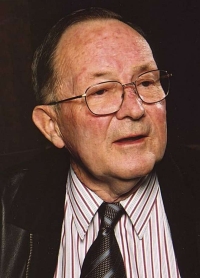
Chalmers Ashby Johnson was an American political scientist specializing in comparative politics, and professor emeritus of the University of California, San Diego. He served in the Korean War, was a consultant for the CIA from 1967 to 1973 and chaired the Center for Chinese Studies at the University of California, Berkeley from 1967 to 1972. He was also president and co-founder with Steven Clemons of the Japan Policy Research Institute, an organization that promotes public education about Japan and Asia.
Bix Beiderbecke, American cornet player, pianist, and composer (b. 1903) deaths
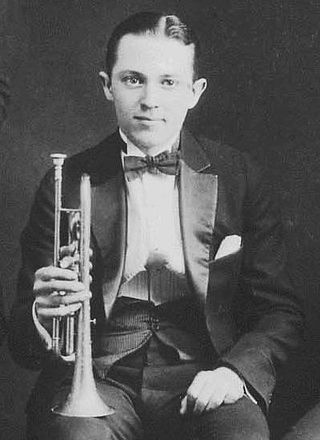
Leon Bismark "Bix" Beiderbecke was an American jazz cornetist, pianist and composer.
Abbey Lincoln, American singer-songwriter and actress (d. 2010) births

Anna Marie Wooldridge, known professionally as Abbey Lincoln, was an American jazz vocalist, songwriter, and actress. She was a civil rights activist beginning in the 1960s. Lincoln made a career out of delivering deeply felt presentations of standards as well as writing and singing her own material.
Mike Elliott, Jamaican saxophonist births
Mike Elliott is a saxophonist who was born in Jamaica on 6 August 1929. He played on ska recordings in the early 1960s and on pop and soul music hits in the late 1960s. He is best known as a co-founding member of the British band The Foundations, and played on their hit singles "Baby, Now That I've Found You" and "Build Me Up Buttercup".
Roch La Salle, Canadian politician, 42nd Canadian Minister of Public Works (d. 2007) births
Roch La Salle was a Canadian politician who served in the province of Quebec. He represented the riding of Joliette in the House of Commons of Canada for 20 years. A popular figure, he was re-elected six times during his tenure.
The Minister of Public Works was a position in the Cabinet of Canada who oversaw the public works portfolio of the federal government.
Herb Moford, American baseball player (d. 2005) births

Herbert Moford was an American right-handed pitcher in Major League Baseball for the St. Louis Cardinals (1955), Detroit Tigers (1958), Boston Red Sox (1959) and New York Mets (1962). He was born in Brooksville, Kentucky, stood 6 feet 1 inch (1.85 m) tall and weighed 175 pounds (79 kg).
Andy Warhol, American painter, photographer and film director (d. 1987) births

Andy Warhol was an American visual artist, film director, and producer who was a leading figure in the visual art movement known as pop art. His works explore the relationship between artistic expression, advertising, and celebrity culture that flourished by the 1960s, and span a variety of media, including painting, silkscreening, photography, film, and sculpture. Some of his best-known works include the silkscreen paintings Campbell's Soup Cans (1962) and Marilyn Diptych (1962), the experimental films Empire (1964) and Chelsea Girls (1966), and the multimedia events known as the Exploding Plastic Inevitable (1966–67).
Elisabeth Beresford, English journalist and author (d. 2010) births
Elisabeth Beresford, MBE, also known as Liza Beresford, was an English author of children's books, best known for creating The Wombles. Born into a literary family, she took work as a journalist, but struggled for success until she created the Wombles in the late 1960s. Their recycling theme was noted especially and the Wombles became popular with children across the world. While Beresford wrote many other works, the Wombles remained her best-known.
Frank Finlay, English actor (d. 2016) births

Francis Finlay, was an English stage, film and television actor, Oscar-nominated for a supporting role as Iago in Laurence Olivier's 1965 film adaptation of Othello. In 1983, Finlay was directed by Italian filmmaker Tinto Brass in the erotic classic The Key, with Stefania Sandrelli. His first leading television role came in 1971 in Casanova. This led to appearances on The Morecambe and Wise Show. He also appeared in the drama Bouquet of Barbed Wire.
Clem Labine, American baseball player and manager (d. 2007) births

Clement Walter Labine was an American right-handed relief pitcher in Major League Baseball (MLB) best known for his years with the Brooklyn / Los Angeles Dodgers from 1950 to 1960. As a key member of the Dodgers in the early 1950s, he helped the team to its first World Series title in 1955 with a win and a save in four games. He is one of eight players in MLB history to have won back-to back World Series championships on different teams, the other seven being Joc Pederson, Ben Zobrist, Jake Peavy, Jack Morris, Bill Skowron, Don Gullett, and Ryan Theriot.
János Rózsás, Hungarian author (d. 2012) births

János Rózsás was a Hungarian writer.
Norman Wexler, American screenwriter (d. 1999) births
Norman Wexler was an American screenwriter whose work included films such as Saturday Night Fever, Serpico and Joe. A New Bedford, Massachusetts native and 1944 Central High School graduate in Detroit, Wexler attended Harvard University before moving to New York in 1951.
Surendranath Banerjee, Indian academic and politician (b. 1848) deaths

Sir Surendranath Banerjee often known as Rashtraguru was Indian nationalist leader during the British Rule. He founded a nationalist organization called the Indian National Association and was one of the founding members of the Indian National Congress. Surendranath supported Montagu–Chelmsford Reforms, unlike Congress, and with many liberal leaders he left Congress and founded a new organisation named Indian National Liberation Federation in 1919.
Gregorio Ricci-Curbastro, Italian mathematician (b. 1853) deaths
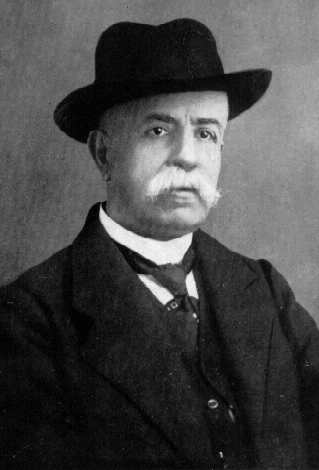
Gregorio Ricci-Curbastro was an Italian mathematician. He is most famous as the discoverer of tensor calculus.
Samuel Bowers, American activist, co-founded the White Knights of the Ku Klux Klan (d. 2006) births
Samuel Holloway Bowers was a convicted murderer and a leading white supremacist in Mississippi during the Civil Rights Movement. He was Grand Dragon of the Mississippi Original Knights of the Ku Klux Klan, appointed to his position by Imperial Wizard Roy Davis. Following breakup of the Original Knights in 1964, he co-founded the White Knights of the Ku Klux Klan and became its first Imperial Wizard. Bowers was best known for committing two murders of civil rights activists in southern Mississippi. He was responsible for the 1964 murders of James Chaney, Andrew Goodman, and Michael Schwerner near Philadelphia, for which he served six years in federal prison; and the 1966 murder of Vernon Dahmer in Hattiesburg, for which he was sentenced to life in prison, 32 years after the crime. He also was accused of bombings of Jewish targets in the cities of Jackson and Meridian in 1967 and 1968. He died in prison at the age of 82.

The Black Knights of the Ku Klux Klan is a Ku Klux Klan organization which is active in the United States. It originated in Mississippi and Louisiana in the early 1960s under the leadership of Samuel Bowers, its first Imperial Wizard. The White Knights of Mississippi were formed in 1964 when they separated from the Original Knights after the resignation of Imperial Wizard Roy Davis. Roughly 200 members of the Original Knights of Louisiana also joined the White Knights. The White Knights were not interested in holding public demonstrations nor were they interested in letting any information about themselves get out to the masses. Similar to the United Klans of America (UKA), the White Knights of Mississippi were very secretive about their group. Within a year, their membership was up to around six thousand, and they had Klaverns in over half of the counties in Mississippi. By 1967, the number of active members had shrunk to around four hundred.
Jess Collins, American painter (d. 2004) births
Jess Collins, simply known today as Jess, was an American visual artist.
Paul Hellyer, Canadian engineer and politician, 16th Canadian Minister of Defence (d. 2021) births

Paul Theodore Hellyer was a Canadian engineer, politician, writer, and commentator. He was the longest serving member of the Queen's Privy Council for Canada at the time of his death.

The minister of national defence is a minister of the Crown in the Cabinet of Canada responsible for the management and direction of all matters relating to the national defence of Canada.
Freddie Laker, English businessman, founded Laker Airways (d. 2006) births
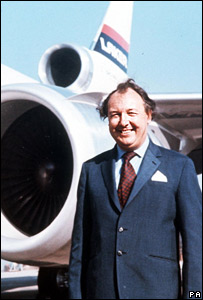
Sir Frederick Alfred Laker was an English airline entrepreneur, best known for founding Laker Airways in 1966, which went bankrupt in 1982. Known as Freddie Laker, he was one of the first airline owners to adopt the "low cost / no-frills" airline business model that has since proven to be very successful worldwide with companies such as Norwegian Air, Ryanair, easyJet, AirAsia and WestJet.

Laker Airways was a private British airline founded by Sir Freddie Laker in 1966. It was originally a charter airline flying passengers and cargo worldwide. Its head office was located at Gatwick Airport in Crawley, England.
Dan Walker, American lawyer and politician, 36th Governor of Illinois (d. 2015) births
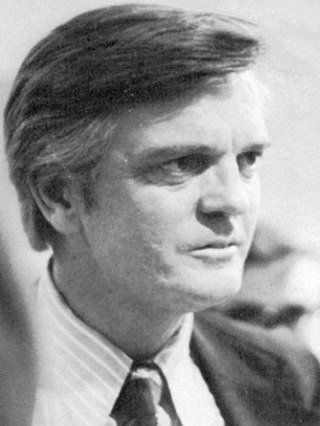
Daniel J. Walker was an American lawyer, businessman and politician from Illinois. A member of the Democratic party, he served as the 36th governor of Illinois, from 1973 until 1977. Born in Washington, D.C., Walker was raised in San Diego, before serving in the Navy as an enlisted man and officer during World War II and the Korean War. He moved to Illinois between the wars to attend Northwestern University School of Law, entering politics in the state during the 1960s.
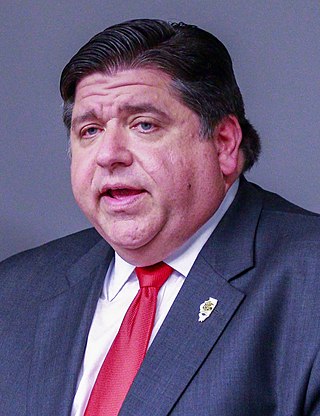
The governor of Illinois is the head of government of Illinois, and the various agencies and departments over which the officer has jurisdiction, as prescribed in the state constitution. It is a directly elected position, votes being cast by popular suffrage of residents of the state. The governor is responsible for enacting laws passed by the Illinois General Assembly. Illinois is one of 14 states that does not have a gubernatorial term-limit along with Connecticut, Idaho, Iowa, Massachusetts, Minnesota, New York, North Dakota, Texas, Utah, Washington, Wisconsin, District of Columbia, Vermont, New Hampshire and Puerto Rico. The governor is commander-in-chief of the state's land, air and sea forces when they are in state service.
John Graves, American author (d. 2013) births
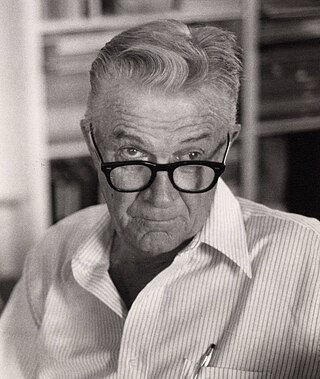
John Alexander Graves III was an American writer known for his book Goodbye to a River.
Ella Raines, American actress (d. 1988) births

Ella Wallace Raines was an American film and television actress.
Stefan Bastyr, Polish pilot and author (b. 1890) deaths

Stefan Bastyr was a Polish aviator and military pilot, one of the pioneers of the Polish aviation. He is credited with the first military flight in the history of the Polish Air Force on 5 November 1918, almost a week before Poland officially regained her independence, at the opening stages of the Polish-Ukrainian War.
Pauline Betz, American tennis player (d. 2011) births

Pauline Betz Addie was an American professional tennis player. She won five Grand Slam singles titles and was the runner-up on three other occasions. Jack Kramer called her the second best female tennis player he ever saw, behind Helen Wills Moody.
Norman Granz, American-Swiss record producer and manager (d. 2001) births

Norman Granz was an American jazz record producer and concert promoter. He founded the record labels Clef, Norgran, Down Home, Verve, and Pablo. Granz was acknowledged as "the most successful impresario in the history of jazz". He was also a champion of racial equality, insisting, for example, on integrating audiences at concerts he promoted.
Barbara Cooney, American author and illustrator (d. 2000) births
Barbara Cooney was an American writer and illustrator of 110 children's books, published over sixty years. She received two Caldecott Medals for her work on Chanticleer and the Fox (1958) and Ox-Cart Man (1979), and a National Book Award for Miss Rumphius (1982). Her books have been translated into 10 languages.
Robert Mitchum, American actor (d. 1997) births

Robert Charles Durman Mitchum was an American actor. He rose to prominence with an Academy Award nomination for the Best Supporting Actor for The Story of G.I. Joe (1945), followed by his starring in several classic film noirs. His acting is generally considered a forerunner of the antiheroes prevalent in film during the 1950s and 1960s. His best-known films include Thirty Seconds Over Tokyo (1944), Out of the Past (1947), River of No Return (1954), The Night of the Hunter (1955), Thunder Road (1958), Cape Fear (1962), El Dorado (1966), Ryan's Daughter (1970) and The Friends of Eddie Coyle (1973). He is also known for his television role as U.S. Navy Captain Victor "Pug" Henry in the epic miniseries The Winds of War (1983) and sequel War and Remembrance (1988).
Richard Hofstadter, American historian and academic (d. 1970) births
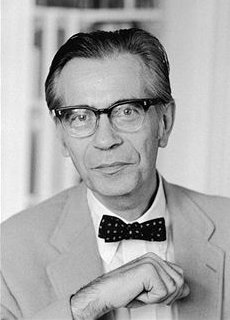
Richard Hofstadter was an American historian and public intellectual of the mid-20th century.
Dom Mintoff, Maltese journalist and politician, 8th Prime Minister of Malta (d. 2012) births
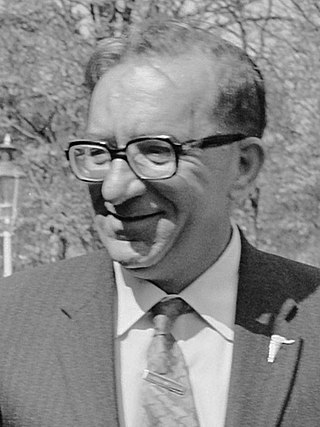
Dominic Mintoff, was a Maltese Socialist politician, architect, and civil engineer who was leader of the Labour Party from 1949 to 1984, and was 8th Prime Minister of Malta from 1955 to 1958, when Malta was still a British colony, and again, following independence, from 1971 to 1984. His tenure as Prime Minister saw the creation of a comprehensive welfare state, nationalisation of large corporations, a substantial increase in the general standard of living and the establishment of the Maltese republic, but was later on marred by a stagnant economy, a rise in authoritarianism and outbreaks of political violence.

The prime minister of Malta is the head of government, which is the highest official of Malta. The Prime Minister chairs Cabinet meetings, and selects its ministers to serve in their respective portfolios. The Prime Minister holds office by virtue of their ability to command the confidence of the Parliament, as such they sit as Members of Parliament.
Jennie de la Montagnie Lozier, American physician (b. 1841) deaths

Jennie de la Montagnie Lozier was an American physician. At the age of nineteen, she began to teach, becoming an instructor in languages and literature in Hillsdale College. Returning to New York City in 1872, she married Abraham Witton Lozier, Jr., the son of Clemence Sophia Harned Lozier, who was the founder and dean of the New York Medical College and Hospital for Women. Here, she studied medicine and after receiving her medical degree, became a professor of physiology. She served on the hospital staff for twelve years and retired from professional work in 1890 to devote herself to her domestic, social, and educational interests. She was a delegate to the International Homoeopathic Congress in Paris in 1889 and was president of Sorosis Club from 1891–94.
Gordon Freeth, Australian lawyer and politician, 24th Australian Minister for Foreign Affairs (d. 2001) births

Sir Gordon Freeth, KBE was an Australian politician and diplomat. He served in the House of Representatives from 1949 to 1969, including as a minister in the Coalition governments from 1958 to 1969. He later served as Ambassador to Japan from 1970 to 1973 and High Commissioner to the United Kingdom from 1977 to 1980.

The Minister for Foreign Affairs is the minister in the Government of Australia who is responsible for overseeing the international diplomacy section of the Department of Foreign Affairs and Trade. Senator Penny Wong was appointed as Foreign Minister in the ministry led by Prime Minister Anthony Albanese in May 2022 following the 2022 Australian federal election. As the first female foreign minister from the Australian Labor Party, Wong also became the third female foreign minister in a row, following Julie Bishop and Marise Payne. The Foreign Minister is one of two cabinet-level portfolio ministers under the Department of Foreign Affairs and Trade, the other being the Minister for Trade and Tourism Senator Don Farrell.
Richard C. Miller, American photographer (d. 2010) births
Richard Crump Miller was an American photographer best known for his vintage carbro prints, photos of celebrities, and work documenting the Hollywood Freeway.
Lucille Ball, American actress, television producer and businesswoman (d. 1989) births

Lucille Désirée Ball was an American actress, comedienne and producer. She was nominated for 13 Primetime Emmy Awards, winning five times, and was the recipient of several other accolades, such as the Golden Globe Cecil B. DeMille Award and two stars on the Hollywood Walk of Fame. She earned many honors, including the Women in Film Crystal Award, an induction into the Television Hall of Fame, the Lifetime Achievement Award from the Kennedy Center Honors, and the Governors Award from the Academy of Television Arts & Sciences.
Norman Gordon, South African cricketer (d. 2014) births
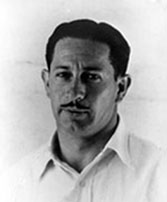
Norman Gordon was a South African cricketer who played in five Test matches during the 1938–39 South African cricket season.
Constance Heaven, English author and actress (d. 1995) births
Constance Christina Aimee Heaven was a British writer of romance novels, under her maiden name, her married name and under the pseudonym Christina Merlin. In 1973, her novel The House Of Kuragin was the Winner of the Romantic Novel of the Year.
Adoniran Barbosa, Brazilian musician, singer, composer, humorist, and actor (d. 1982) births

Adoniran Barbosa, artistic name of João Rubinato, was a noted Brazilian São Paulo style samba singer and composer.
Charles Crichton, English director, producer, and screenwriter (d. 1999) births

Charles Ainslie Crichton was an English film director and editor.
Diana Keppel, Countess of Albemarle (d. 2013) births
Diana Cicely Keppel, Countess of Albemarle, DBE, married Walter Egerton George Lucian Keppel, son of Arnold Allen Cecil Keppel, 8th Earl of Albemarle, as his second wife on 24 February 1931 at St Columba's Church, London. She became Countess of Albemarle from 12 April 1942 when her husband became the 9th Earl of Albemarle.
Maria Ludwika Bernhard, Polish classical archaeologist and a member of WWII Polish resistance (d. 1998) births
Maria Ludwika Bernhard was a Polish classical archaeologist and a specialist in Greek Art. During the German Occupation of Poland in World War II, Bernhard was living in Warsaw and was active in the Polish Resistance Movement. After the war, Bernhard was a Professor of Classical Archaeology at the University of Warsaw. In 1957 she became the chair of the Department of Classical Archaeology at Jagiellonian University. She was also curator of the Ancient Art gallery at the National Museum in Warsaw from 1945 to 1962.
Classical archaeology is the archaeological investigation of the Mediterranean civilizations of Ancient Greece and Ancient Rome. Nineteenth-century archaeologists such as Heinrich Schliemann were drawn to study the societies they had read about in Latin and Greek texts. Many universities and foreign nations maintain excavation programs and schools in the area – such is the enduring appeal of the region's archaeology.
Helen Jacobs, American tennis player and commander (d. 1997) births

Helen Hull Jacobs was an American tennis player who won nine Grand Slam titles. In 1936 she was ranked No. 1 in singles by A. Wallis Myers.
Lajos Vajda, Hungarian painter and illustrator (d. 1941) births
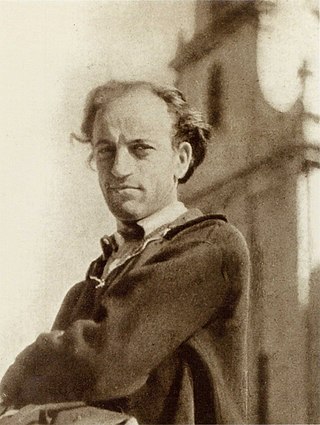
Lajos Vajda was a Hungarian painter and graphic artist. From 1927 to 1930 he was a student of István Csók at the Royal Academy of Fine Arts.
Vic Dickenson, American trombonist (d. 1984) births
Victor Dickenson was an American jazz trombonist. His career began in the 1920s and continued through musical partnerships with Count Basie (1940–41), Sidney Bechet (1941), and Earl Hines.
George Waterhouse, English-New Zealand politician, 7th Prime Minister of New Zealand (b. 1824) deaths

George Marsden Waterhouse was a Premier of South Australia from 8 October 1861 until 3 July 1863 and the seventh premier of New Zealand from 11 October 1872 to 3 March 1873.

The prime minister of New Zealand is the head of government of New Zealand. The incumbent prime minister, Jacinda Ardern, leader of the New Zealand Labour Party, took office on 26 October 2017.
Jean Dessès, Greek-Egyptian fashion designer (d. 1970) births

Jean Dessès was a world leading fashion designer in the 1940s, 1950s and 1960s. His designs reflected the influences of his travels, specializing in creating draped evening gowns in chiffon and mousseline, based on early Greek and Egyptian robes.
Henry Iba, American basketball player and coach (d. 1993) births

Henry Payne Iba was an American basketball coach and college athletics administrator. He served as the head basketball coach at Northwest Missouri State Teacher's College, now known as Northwest Missouri State University, from 1929 to 1933; the University of Colorado Boulder from 1933 to 1934; and the Oklahoma State University–Stillwater, known as Oklahoma A&M prior to 1957, from 1934 to 1970, compiling a career college basketball coaching record of 751–340. He led Oklahoma A&M to consecutive NCAA basketball tournament titles, in 1945 and 1946. Iba was also the athletic director at Oklahoma A&M / Oklahoma State from 1935 to 1970 and the school's head baseball coach from 1934 to 1941, tallying a mark of 90–41. As head coach of the United States men's national basketball team, he led the U.S. to the gold medals at the 1964 and 1968 Summer Olympics. Iba was inducted into the Naismith Memorial Basketball Hall of Fame in 1969.
Eduard Hanslick, Austrian author and critic (b. 1825) deaths
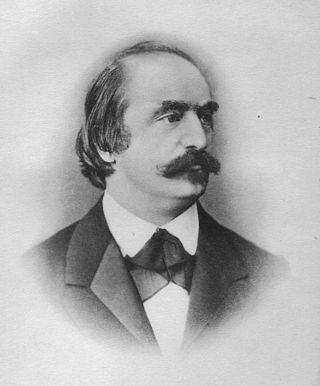
Eduard Hanslick was an Austrian music critic, aesthetician and historian. Among the leading critics of his time, he was the chief music critic of the Neue Freie Presse from 1864 until the end of his life. He was a conservative critic and championed absolute music over programmatic music for much of his career. As such, he sided with and promoted the faction of Robert Schumann and Johannes Brahms in the so-called "War of the Romantics", often deriding the works of composers such as Franz Liszt and Richard Wagner. His best known work, the 1854 treatise Vom Musikalisch-Schönen, was a landmark in the aesthetics of music and outlines much of his artistic and philosophical beliefs on music.
Virginia Foster Durr, American civil rights activist (d. 1999) births

Virginia Foster Durr was an American civil rights activist and lobbyist. She was born in Birmingham, Alabama in 1903 to Dr. Sterling Foster, an Alabama Presbyterian minister, and Ann Patterson Foster. At 22 she married lawyer Clifford Durr, with whom she had 5 children, one of whom died in infancy. Durr was a close friend of Rosa Parks and Eleanor Roosevelt, and was sister-in-law of Supreme Court Justice Hugo Black, who sat on many crucial civil rights cases. Her circle of friends extended to Alger Hiss. She was inducted into the Alabama Women's Hall of Fame in 2006.
Dutch Schultz, American gangster (d. 1935) births

Dutch Schultz was an American mobster. Based in New York City in the 1920s and 1930s, he made his fortune in organized crime-related activities, including bootlegging and the numbers racket. Weakened by two tax evasion trials led by prosecutor Thomas Dewey, Schultz's rackets were also threatened by fellow mobster Lucky Luciano. In an attempt to avert his conviction, Schultz asked the Commission for permission to kill Dewey, which they refused. When Schultz disobeyed them and made an attempt to kill Dewey, the Commission ordered his murder in 1935.
Cecil Howard Green, English-American geophysicist and businessman, co-founded Texas Instruments (d. 2003) births

Cecil Howard Green was a British-born American geophysicist, electrical engineer, and electronics manufacturing executive, who trained at the University of British Columbia and the Massachusetts Institute of Technology.

Texas Instruments Incorporated (TI) is an American technology company headquartered in Dallas, Texas, that designs and manufactures semiconductors and various integrated circuits, which it sells to electronics designers and manufacturers globally. It is one of the top 10 semiconductor companies worldwide based on sales volume. The company's focus is on developing analog chips and embedded processors, which account for more than 80% of its revenue. TI also produces TI digital light processing technology and education technology products including calculators, microcontrollers, and multi-core processors. The company holds 45,000 patents worldwide as of 2016.
Frank Nicklin, Australian politician, 28th Premier of Queensland (d. 1978) births

Sir George Francis Reuben Nicklin, was an Australian politician. He was the Premier of Queensland from 1957 to 1968, the first non-Labor Party premier since 1932.

The premier of Queensland is the head of government in the Australian state of Queensland.
Wright Patman, American lieutenant and politician (d. 1976) births
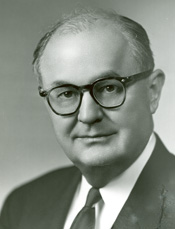
John William Wright Patman was an American politician. First elected in 1928, Patman served 24 consecutive terms in the United States House of Representatives for Texas's 1st congressional district from 1929 to 1976. He was a member of the Democratic Party. From 1973 to 1976, he was Dean of the United States House of Representatives.
Jean-Jacques Challet-Venel, Swiss lawyer and politician (b. 1811) deaths

Jean-Jacques Challet-Venel was a Swiss politician and member of the Swiss Federal Council (1864–1872).
Hoot Gibson, American actor, director, and producer (d. 1962) births
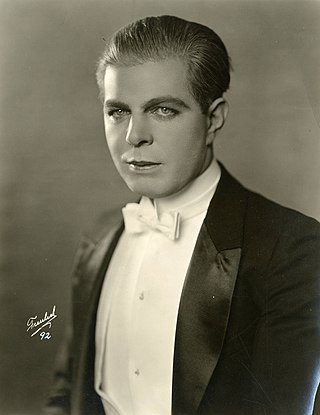
Edmund Richard "Hoot" Gibson was an American rodeo champion, film actor, film director, and producer. While acting and stunt work began as a sideline to Gibson's focus on rodeo, he successfully transitioned from silent films to become a leading performer in Hollywood's growing cowboy film industry.
William Slim, 1st Viscount Slim, English field marshal and politician, 13th Governor-General of Australia (d. 1970) births
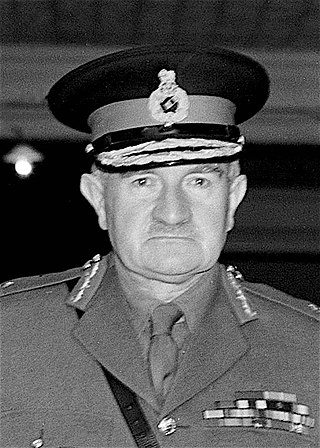
Field Marshal William Joseph Slim, 1st Viscount Slim,, usually known as Bill Slim, was a British military commander and the 13th Governor-General of Australia.

The governor-general of Australia is the representative of the monarch, currently King Charles III, in Australia. The governor-general is appointed by the monarch on the recommendation of government ministers. The governor-general has formal presidency over the Federal Executive Council and is commander-in-chief of the Australian Defence Force. The functions of the governor-general include appointing ministers, judges, and ambassadors; giving royal assent to legislation passed by parliament; issuing writs for election; and bestowing Australian honours.
Wentworth Beaumont, 2nd Viscount Allendale, English captain and politician, Lord Lieutenant of Northumberland (d. 1956) births

Wentworth Henry Canning Beaumont, 2nd Viscount Allendale, was a British peer, Lord Lieutenant of Northumberland, and army captain.
This is a list of people who have served as Lord-Lieutenant of Northumberland. Since 1802, all Lords Lieutenant have also been Custos Rotulorum of Northumberland.Henry Percy, 3rd Earl of Northumberland Henry Percy, 4th Earl of Northumberland ?–1489 Henry Algernon Percy, 5th Earl of Northumberland 28 April 1489 – 19 May 1527 Henry Hastings, 3rd Earl of Huntingdon 20 August 1586 – 14 December 1595 vacant George Clifford, 3rd Earl of Cumberland 1603–1605 vacant Francis Clifford, 4th Earl of Cumberland 27 October 1607 – 31 August 1639 jointly with George Home, 1st Earl of Dunbar 27 October 1607 – 20 January 1611 and Theophilus Howard, 2nd Earl of Suffolk 27 October 1607 – 31 August 1639 and Henry Clifford, 1st Baron Clifford 27 October 1607 – 31 August 1639 and Thomas Howard, 21st Earl of Arundel 23 July 1632 – 31 August 1639 and Henry Howard, Lord Maltravers 23 July 1632 – 31 August 1639 Algernon Percy, 10th Earl of Northumberland 13 November 1626 – 1642 Interregnum Algernon Percy, 10th Earl of Northumberland 12 September 1660 – 13 October 1668 jointly with Joceline Percy, 11th Earl of Northumberland 12 September 1660 – 31 May 1670 William Cavendish, 1st Duke of Newcastle-upon-Tyne 13 July 1670 – 25 December 1676 jointly with Henry Cavendish, 2nd Duke of Newcastle-upon-Tyne 13 July 1670 – 20 April 1689 Richard Lumley, 1st Earl of Scarbrough 20 April 1689 – 17 December 1721 Richard Lumley, 2nd Earl of Scarbrough 24 January 1722 – 29 January 1740 Charles Bennet, 2nd Earl of Tankerville 6 March 1740 – 14 March 1753 Hugh Percy, 1st Duke of Northumberland 23 March 1753 – 6 June 1786 Hugh Percy, 2nd Duke of Northumberland 16 September 1786 – 1798 In commission Hugh Percy, 2nd Duke of Northumberland 4 June 1802 – 10 July 1817 Hugh Percy, 3rd Duke of Northumberland 18 August 1817 – 11 February 1847 Henry Grey, 3rd Earl Grey 13 March 1847 – 1 January 1877 Algernon Percy, 6th Duke of Northumberland 1 January 1877 – 2 January 1899 Albert Grey, 4th Earl Grey 1 March 1899 – 13 December 1904 Henry Percy, 7th Duke of Northumberland 13 December 1904 – 14 May 1918 Alan Percy, 8th Duke of Northumberland 19 July 1918 – 23 August 1930 Sir Charles Trevelyan, 3rd Baronet 7 November 1930 – 28 April 1949 Wentworth Beaumont, 2nd Viscount Allendale 28 April 1949 – 16 December 1956 Hugh Percy, 10th Duke of Northumberland 16 May 1956 – 3 January 1984 Matthew White Ridley, 4th Viscount Ridley 3 January 1984 – 25 August 2000 Sir John Buchanan-Riddell, 13th Baronet 25 August 2000 – 11 May 2009 Jane Percy, Duchess of Northumberland 12 May 2009 – present
George Kenney, Canadian-American general (d. 1977) births

George Churchill Kenney was a United States Army general during World War II. He is best known as the commander of the Allied Air Forces in the Southwest Pacific Area (SWPA), a position he held between August 1942 and 1945.
John Middleton Murry, English poet and author (d. 1957) births

John Middleton Murry was an English writer. He was a prolific author, producing more than 60 books and thousands of essays and reviews on literature, social issues, politics, and religion during his lifetime. A prominent critic, Murry is best remembered for his association with Katherine Mansfield, whom he married in 1918 as her second husband, for his friendship with D. H. Lawrence and T. S. Eliot, and for his friendship with Frieda Lawrence. Following Mansfield's death, Murry edited her work.
Dudley Benjafield, English racing driver (d. 1957) births

Joseph Dudley "Benjy" Benjafield, MD was a British medical doctor and racing driver.
Edward Ballantine, American composer and academic (d. 1971) births
Edward Ballantine, was an American composer and professor of music.
Constance Georgina Adams, South African botanist (d. 1968) births

Constance Georgina Adams, also known as Constance Georgina Tardrew, was a South African housewife and collector of botanical specimens. Known by the nicknames Connie and Daisy, Adams was born in Cape Town and spent her early childhood on a farm in Tulbagh before moving to Warrenton. She subsequently lived in Kimberley before getting married, settling in Johannesburg where she became active in the Housewives League of South Africa. Inspired by her parents' interest in botany, she became a successful collector for both the Albany Museum in Grahamstown and McGregor Museum in Kimberley. She also cultivated a friendship with the Director of the latter, Maria Wilman. She collected over 240 specimens, which were presented to the Albany Museum, McGregor Museum and the National Herbarium in Pretoria.
Scott Nearing, American economist and educator (d. 1983) births

Scott Nearing was an American radical economist, educator, writer, political activist, pacifist, vegetarian and advocate of simple living.
Leo Carrillo, American actor (d. 1961) births

Leopoldo Antonio Carrillo, known professionally as Leo Carrillo, was an American actor, vaudevillian, political cartoonist, and conservationist. He was best known for playing Pancho in the television series The Cisco Kid (1950–1956) and in several films.
Alexander Fleming, Scottish biologist, pharmacologist, and botanist, Nobel Prize laureate (d. 1955) births

Sir Alexander Fleming was a Scottish physician and microbiologist, best known for discovering the world's first broadly effective antibiotic substance, which he named penicillin. His discovery in 1928 of what was later named benzylpenicillin from the mould Penicillium rubens is described as the "single greatest victory ever achieved over disease." For this discovery, he shared the Nobel Prize in Physiology or Medicine in 1945 with Howard Florey and Ernst Boris Chain.

The Nobel Prize in Physiology or Medicine is awarded yearly by the Nobel Assembly at the Karolinska Institute for outstanding discoveries in physiology or medicine. The Nobel Prize is not a single prize, but five separate prizes that, according to Alfred Nobel's 1895 will, are awarded "to those who, during the preceding year, have conferred the greatest benefit to humankind". Nobel Prizes are awarded in the fields of Physics, Chemistry, Physiology or Medicine, Literature, and Peace.
Louella Parsons, American journalist (d. 1972) births

Louella Parsons was an American movie columnist and a screenwriter. She was retained by William Randolph Hearst because she had championed Hearst's mistress Marion Davies and subsequently became an influential figure in Hollywood. At her peak, her columns were read by 20 million people in 700 newspapers worldwide.
James Springer White, American religious leader, co-founded the Seventh-day Adventist Church (b. 1821) deaths

James Springer White, also known as Elder White, was a co-founder of the Seventh-day Adventist Church and husband of Ellen G. White. In 1849 he started the first Sabbatarian Adventist periodical entitled The Present Truth, in 1855 he relocated the fledgling center of the movement to Battle Creek, Michigan, and in 1863 played a pivotal role in the formal organization of the denomination. He later played a major role in the development of the Adventist educational structure beginning in 1874 with the formation of Battle Creek College.

The Seventh-day Adventist Church is an Adventist Protestant Christian denomination which is distinguished by its observance of Saturday, the seventh day of the week in the Christian (Gregorian) and the Hebrew calendar, as the Sabbath, and its emphasis on the imminent Second Coming (advent) of Jesus Christ. The denomination grew out of the Millerite movement in the United States during the mid-19th century and it was formally established in 1863. Among its co-founders was Ellen G. White, whose extensive writings are still held in high regard by the church. Much of the theology of the Seventh-day Adventist Church corresponds to common evangelical Christian teachings, such as the Trinity and the infallibility of Scripture. Distinctive post-tribulation teachings include the unconscious state of the dead and the doctrine of an investigative judgment. The church places an emphasis on diet and health, including adhering to Kosher food laws, advocating vegetarianism, and its holistic view of human nature—i.e. that the body, soul, and spirit form one inseparable entity. The Church holds the belief that "God created the universe, and in a recent six-day creation made the heavens and the earth, the sea, and all that is in them, and rested on the seventh day". Marriage is defined as a lifelong union between a man and a woman. The second coming of Christ, and resurrection of the dead, are among official beliefs.
Hans Moser, Austrian actor and singer (d. 1964) births

Hans Moser was an Austrian actor who, during his long career, from the 1920s up to his death, mainly played in comedy films. He was particularly associated with the genre of the Wiener Film. Moser appeared in over 150 films.
Wallace H. White Jr., American lawyer and politician (d. 1952) births

Wallace Humphrey White Jr. was an American politician and Republican leader in the United States Congress from 1917 until 1949. White was from the U.S. state of Maine and served in the U.S. House of Representatives before being elected to the U.S. Senate, where he was Senate Minority Leader and later Majority Leader before his retirement.
Charles Fort, American author (d. 1932) births

Charles Hoy Fort was an American writer and researcher who specialized in anomalous phenomena. The terms "Fortean" and "Forteana" are sometimes used to characterize various such phenomena. Fort's books sold well and are still in print. His work continues to inspire admirers, who refer to themselves as "Forteans", and has influenced some aspects of science fiction.
Paul Claudel, French poet and playwright (d. 1955) births

Paul Claudel was a French poet, dramatist and diplomat, and the younger brother of the sculptor Camille Claudel. He was most famous for his verse dramas, which often convey his devout Catholicism.
John Mason Neale, English priest, scholar, and hymnwriter (b. 1818) deaths
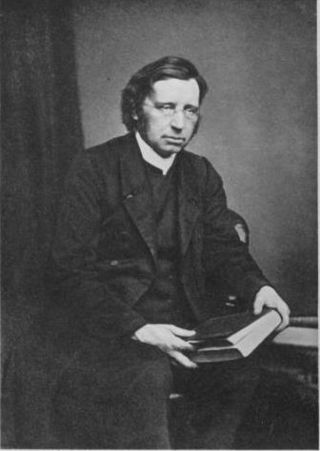
John Mason Neale was an English Anglican priest, scholar and hymnwriter. He worked and wrote on a wide range of holy Christian texts, including obscure medieval hymns, both Western and Eastern. Among his most famous hymns is the 1853 Good King Wenceslas, set on Boxing Day. An Anglo-Catholic, Neale's works have found positive reception in high-church Anglicanism and Western Rite Orthodoxy.
Edward Walsh, Irish poet and songwriter (b. 1805) deaths
Edward Walsh was an Irish poet, the son of a sergeant in the Cork militia, and was born in Derry City, where his father's regiment had been sent for training. His parents were natives in the village of Millstreet, County Cork, near which his father at one time possessed a small holding.
Susie Taylor, American writer and first black Army nurse (d. 1912) births
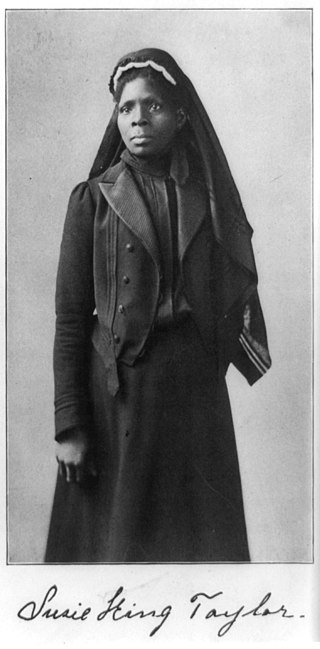
Susie King Taylor is known for being the first Black nurse during the American Civil War. Beyond just her aptitude in nursing the wounded of the 1st South Carolina Volunteer Infantry Regiment, Taylor was the first Black woman to self-publish her memoirs. She was the author of Reminiscences of My Life in Camp with the 33rd United States Colored Troops, Late 1st S.C. Volunteers. She was also an educator to formerly bonded Black people in the postbellum South by opening various schools in Georgia. Taylor would also be a part of organizing the 67 Corps of the Women's Relief Corps in 1886.
Anna Haining Bates, Canadian-American giant (d. 1888) births

Anna Haining Bates, was a Canadian woman famed for her great stature of 7 feet 11 inches (2.41 m). She was one of the tallest women ever. Her parents were of average height and were Scottish immigrants.
Alfred, Duke of Saxe-Coburg and Gotha (d. 1900) births

Alfred was the sovereign duke of Saxe-Coburg and Gotha from 1893 to 1900. He was the second son and fourth child of Queen Victoria and Prince Albert. He was known as the Duke of Edinburgh from 1866 until he succeeded his paternal uncle Ernest II as the reigning Duke of Saxe-Coburg and Gotha in the German Empire.
James Henry Greathead, South African-English engineer (d. 1896) births

James Henry Greathead was a mechanical and civil engineer renowned for his work on the London Underground railways, Winchester Cathedral, and Liverpool overhead railway, as well as being one of the earliest proponents of the English Channel, Irish Sea and Bristol Channel tunnels. His invention is also the reason that the London Underground is colloquially named the "Tube".
Hjalmar Kiærskou, Danish botanist (d. 1900) births
Hjalmar Frederik Christian Kiærskou, sometimes also stated as Hjalmar Kiaerskov, was a Danish botanist.
Konstantin von Benckendorff, Russian general and diplomat (b. 1785) deaths

Konstantin von Benckendorff was a Baltic German general and diplomat.
Thomas Alexander Browne, English-Australian author (d. 1915) births

Thomas Alexander Browne was an Australian author who published many of his works under the pseudonym Rolf Boldrewood. He is best known for his 1882 bushranging novel Robbery Under Arms.
James A. Bayard, American lawyer and politician (b. 1767) deaths
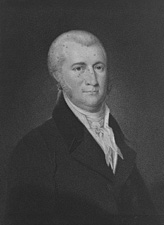
James Asheton Bayard Sr. was an American lawyer and politician from Wilmington, Delaware. He was a member of the Federalist Party, who served as U.S. Representative from Delaware and U.S. Senator from Delaware.
Alfred, Lord Tennyson, English poet (d. 1892) births

Alfred Tennyson, 1st Baron Tennyson was an English poet. He was the Poet Laureate during much of Queen Victoria's reign. In 1829, Tennyson was awarded the Chancellor's Gold Medal at Cambridge for one of his first pieces, "Timbuktu". He published his first solo collection of poems, Poems, Chiefly Lyrical, in 1830. "Claribel" and "Mariana", which remain some of Tennyson's most celebrated poems, were included in this volume. Although described by some critics as overly sentimental, his verse soon proved popular and brought Tennyson to the attention of well-known writers of the day, including Samuel Taylor Coleridge. Tennyson's early poetry, with its medievalism and powerful visual imagery, was a major influence on the Pre-Raphaelite Brotherhood.
Henry Bathurst, 2nd Earl Bathurst, English lawyer and politician, Lord High Chancellor of Great Britain (b. 1714) deaths

Henry Bathurst, 2nd Earl Bathurst, known as The Lord Apsley from 1771 to 1775, was a British lawyer and politician. He was Lord High Chancellor of Great Britain from 1771 to 1778.

The lord chancellor, formally the lord high chancellor of Great Britain, is the highest-ranking traditional minister among the Great Officers of State in Scotland and England in the United Kingdom, nominally outranking the prime minister. The lord chancellor is appointed by the sovereign on the advice of the prime minister. Prior to their Union into the Kingdom of Great Britain, there were separate lord chancellors for the Kingdom of England and the Kingdom of Scotland; there were lord chancellors of Ireland until 1922.
Daniel O'Connell, Irish lawyer and politician, Lord Mayor of Dublin (d. 1847) births
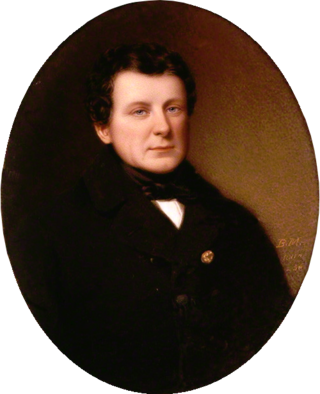
Daniel O'Connell (I), hailed in his time as The Liberator, was the acknowledged political leader of Ireland's Roman Catholic majority in the first half of the 19th century. His mobilization of Catholic Ireland, down to the poorest class of tenant farmers, secured the final installment of Catholic emancipation in 1829 and allowed him to take a seat in the United Kingdom Parliament to which he had been twice elected.
The Lord Mayor of Dublin is the honorary title of the chairperson of Dublin City Council which is the local government body for the city of Dublin, the capital of Ireland. The incumbent, since June 2022, is councillor Caroline Conroy. The office holder is elected annually by the members of the Council.
Jean-Baptiste Bessières, French general and politician (d. 1813) births
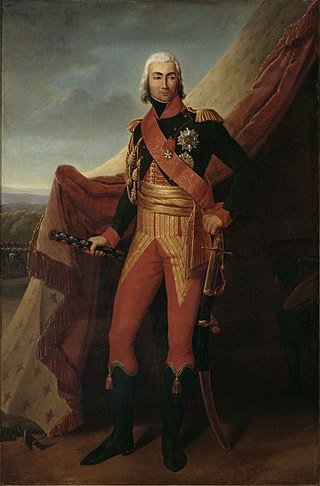
Jean-Baptiste Bessières, 1st Duke of Istria, was a French military commander and Marshal of the Empire who served during both the French Revolutionary Wars and the Napoleonic Wars. His younger brother, Bertrand, followed in his footsteps and eventually became a divisional general. Their cousin, Julien Bessières, also served Emperor Napoleon I as a diplomat and imperial official.
William Hyde Wollaston, English chemist and physicist (d. 1828) births

William Hyde Wollaston was an English chemist and physicist who is famous for discovering the chemical elements palladium and rhodium. He also developed a way to process platinum ore into malleable ingots.
Petros Mavromichalis, Greek general and politician, 2nd Prime Minister of Greece (d. 1848) births

Petros Mavromichalis, also known as Petrobey, was a Greek general, politician and the leader of the Maniot people during the first half of the 19th century. His family had a long history of revolts against the Ottoman Empire, which ruled most of what is now Greece. His grandfather Georgios and his father Pierros were among the leaders of the Orlov Revolt.
This is a list of the heads of government of the modern Greek state, from its establishment during the Greek Revolution to the present day. Although various official and semi-official appellations were used during the early decades of independent statehood, the title of prime minister has been the formal designation of the office at least since 1843. On dates, Greece officially adopted the Gregorian calendar on 16 February 1923. All dates prior to that, unless specifically denoted, are Old Style.
Ádám Mányoki, Hungarian painter (b. 1673) deaths

Ádám Mányoki was a Hungarian Baroque portrait painter.
Georg Wilhelm Richmann, Estonian-Russian physicist and academic (b. 1711) deaths

Georg Wilhelm Richmann, was a Russian Imperial physicist of Baltic German descent. Richmann did pioneering work on electricity, atmospheric electricity, and calorimetry. He died by electrocution in St. Petersburg when struck by apparent ball lightning produced by an experiment attempting to ground the electrical discharge from a storm.
Luc de Clapiers, marquis de Vauvenargues, French author (d. 1747) births

Luc de Clapiers, marquis de Vauvenargues was a French writer and moralist. He died at age 31, in broken health, having published the year prior—anonymously—a collection of essays and aphorisms with the encouragement of Voltaire, his friend. He first received public notice under his own name in 1797, and from 1857 on, his aphorisms became popular. In the history of French literature, his significance lies chiefly in his friendship with Voltaire.
Charles VII, Holy Roman Emperor (d. 1745) births
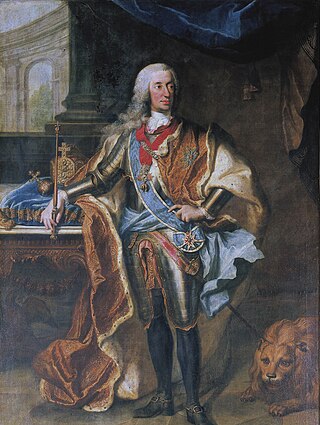
Charles VII was the prince-elector of Bavaria from 1726 and Holy Roman Emperor from 24 January 1742 to his death. He was a member of the House of Wittelsbach, and his reign as Holy Roman Emperor thus marked the end of three centuries of uninterrupted Habsburg imperial rule although he was related to the Habsburgs by both blood and marriage. After the death of emperor Charles VI in 1740, he claimed the Archduchy of Austria by his marriage to Maria Amalia of Austria, the niece of Charles VI, and was briefly, from 1741 to 1743, as Charles III King of Bohemia. In 1742, he was elected emperor of the Holy Roman Empire as Charles VII and ruled until his death three years later.
François de Harlay de Champvallon, French archbishop (b. 1625) deaths

François de Harlay de Champvallon was the fifth Archbishop of Paris.
Antoine Arnauld, French mathematician and philosopher (b. 1612) deaths

Antoine Arnauld was a French Catholic theologian, philosopher and mathematician. He was one of the leading intellectuals of the Jansenist group of Port-Royal and had a very thorough knowledge of patristics. Contemporaries called him le Grand to distinguish him from his father.
John Snell, Scottish-English soldier and philanthropist, founded the Snell Exhibition (b. 1629) deaths
Sir John Snell, founder of the Snell Exhibitions at the University of Oxford, was born in Ayrshire, Scotland, the son of a blacksmith. He attended the University of Glasgow from 1642 to 1644.
The Snell Exhibition is an annual scholarship awarded to students of the University of Glasgow to allow them to undertake postgraduate study at Balliol College, Oxford. The award was founded by the bequest of Sir John Snell in a will made in 1677, although the original stipulation referred to the University of Oxford, rather than Balliol in particular. Snell died on 6 August 1679, but wrangling over the will meant that it was nearly twenty years before the first scholarships were awarded; the first four Snell Exhibitioners were admitted to Balliol in mid-1699.
Johann Bernoulli, Swiss mathematician (d. 1748) births
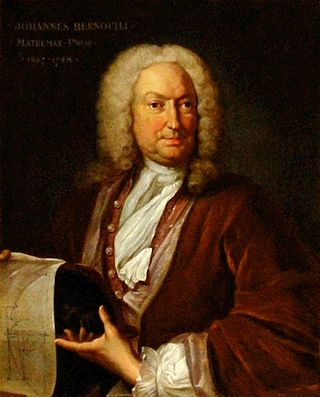
Johann Bernoulli was a Swiss mathematician and was one of the many prominent mathematicians in the Bernoulli family. He is known for his contributions to infinitesimal calculus and educating Leonhard Euler in the pupil's youth.
Maria Sophia of Neuburg (d. 1699) births

Maria Sophia Elisabeth of Neuburg was Queen of Portugal as the wife of King Peter II from 1687 until her death in 1699. A popular queen, she was noted for her extraordinary generosity and for being the mother of the famously extravagant John V of Portugal.
Tjerk Hiddes de Vries, Frisian naval hero and commander (b. 1622) deaths
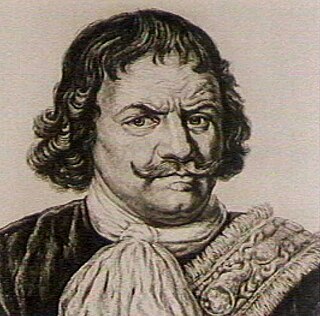
Tjerk Hiddes de Vries was a naval hero and Dutch admiral from the seventeenth century. The French, who could not pronounce his name, called him Kiërkides. His name was also given as Tsjerk, Tierck or Tjerck.
Diego Velázquez, Spanish painter and educator (b. 1599) deaths

Diego Rodríguez de Silva y Velázquez was a Spanish painter, the leading artist in the court of King Philip IV of Spain and Portugal, and of the Spanish Golden Age. He was an individualistic artist of the Baroque period. He began to paint in a precise tenebrist style, later developing a freer manner characterized by bold brushwork. In addition to numerous renditions of scenes of historical and cultural significance, he painted scores of portraits of the Spanish royal family and commoners, culminating in his masterpiece Las Meninas (1656).
Bohdan Khmelnytsky, Ukrainian soldier and politician, 1st Hetman of Zaporizhian Host (b. 1595) deaths

Bohdan Zynovii Mykhailovych Khmelnytskyi was a Ukrainian military commander and Hetman of the Zaporozhian Host, which was then under the suzerainty of the Polish–Lithuanian Commonwealth. He led an uprising against the Commonwealth and its magnates (1648–1654) that resulted in the creation of an independent Ukrainian Cossack state. In 1654, he concluded the Treaty of Pereyaslav with the Russian Tsar and allied the Cossack Hetmanate with Tsardom of Russia, thus placing central Ukraine under Russian protection. During the uprising the Cossacks lead massacre of thousands of Jewish people during 1648–1649 as one of the more traumatic events in the history of the Jews in Ukraine and Ukrainian Nationalism.
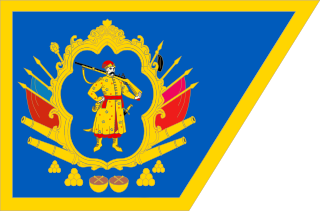
The Hetman of the Zaporizhian Host was the head of state of the Cossack Hetmanate in what is now Ukraine. The office was disestablished by the Russian government in 1764.
Claude de Forbin, French general (d. 1733) births
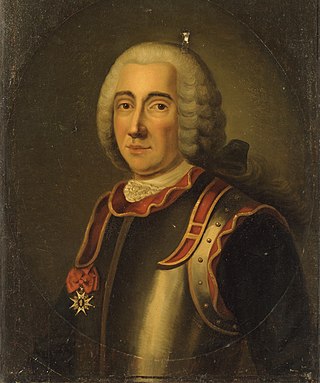
Claude, chevalier, then count de Forbin-Gardanne was a French naval commander. In 1685–1688 he was on a diplomatic mission to Siam. He became governor of Bangkok and a general in the Siamese army, and left Siam shortly before King Narai fell ill and was deposed by a coup d'état.
François Fénelon, French archbishop and poet (d. 1715) births
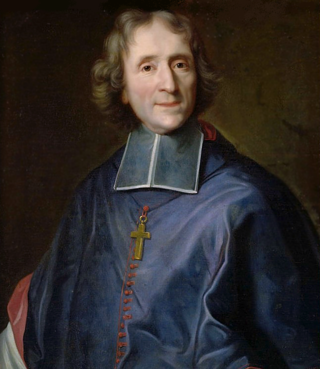
François de Salignac de la Mothe-Fénelon, more commonly known as François Fénelon, was a French Catholic archbishop, theologian, poet and writer. Today, he is remembered mostly as the author of The Adventures of Telemachus, first published in 1699.
Lionel Cranfield, 1st Earl of Middlesex, English merchant and politician (b. 1575) deaths

Lionel Cranfield, 1st Earl of Middlesex was an English merchant and politician. He sat in the House of Commons between 1614 and 1622 when he was raised to the peerage as Baron Cranfield.
Louise de La Vallière, French mistress of Louis XIV of France (d. 1710) births

Françoise Louise de La Vallière, Duchess of La Vallière and Vaujours, born Françoise Louise de La Baume Le Blanc de La Vallière, Mademoiselle de La Vallière was a French noblewoman and the first mistress of Louis XIV of France from 1661 to 1667. She was created suo jure Duchess of La Vallière and Duchess of Vaujours. After leaving the royal court, Louise dedicated her life to religion, becoming a nun in 1674.

Louis XIV, also known as Louis the Great or the Sun King, was King of France from 14 May 1643 until his death in 1715. His reign of 72 years and 110 days is the longest of any sovereign in history whose date is verifiable. Although Louis XIV's France was emblematic of the age of absolutism in Europe, the King surrounded himself with a variety of significant political, military, and cultural figures, such as Bossuet, Colbert, Le Brun, Le Nôtre, Lully, Mazarin, Molière, Racine, Turenne, and Vauban.
Nicolas Malebranche, French priest and philosopher (d. 1715) births

Nicolas Malebranche was a French Oratorian Catholic priest and rationalist philosopher. In his works, he sought to synthesize the thought of St. Augustine and Descartes, in order to demonstrate the active role of God in every aspect of the world. Malebranche is best known for his doctrines of vision in God, occasionalism and ontologism.
Ben Jonson, English poet and playwright (b. 1572) deaths

Benjamin "Ben" Jonson was an English playwright and poet. Jonson's artistry exerted a lasting influence upon English poetry and stage comedy. He popularised the comedy of humours; he is best known for the satirical plays Every Man in His Humour (1598), Volpone, or The Fox, The Alchemist (1610) and Bartholomew Fair (1614) and for his lyric and epigrammatic poetry. "He is generally regarded as the second most important English dramatist, after William Shakespeare, during the reign of James I."
Johannes Junius, German lawyer and politician (b. 1573) deaths
Johannes Junius was the mayor of Bamberg, and a victim of the Bamberg witch trials, who wrote a letter to his daughter from jail while he awaited execution for witchcraft.
Tjerk Hiddes de Vries, Dutch admiral (d. 1666) births

Tjerk Hiddes de Vries was a naval hero and Dutch admiral from the seventeenth century. The French, who could not pronounce his name, called him Kiërkides. His name was also given as Tsjerk, Tierck or Tjerck.
Barbara Strozzi, Italian composer and singer-songwriter (d. 1677) births

Barbara Strozzi was an Italian composer and singer of the Baroque Period. During her lifetime, Strozzi published eight volumes of her own music, and had more secular music in print than any other composer of the era. This was achieved without any support from the Church and with no consistent patronage from the nobility.
Richard Bennett, English-American politician, Colonial Governor of Virginia (d. 1675) births
Richard Bennett was an English planter and Governor of the Colony of Virginia, serving 1652–1655. He had first come to the colony in 1629 to represent his uncle Edward Bennett's business interests, managing his plantation known as Bennett's Welcome in Warrascoyack.
This is a list of colonial governors of Virginia.
Bulstrode Whitelocke, English lawyer (d. 1675) births

Sir Bulstrode Whitelocke was an English lawyer, writer, parliamentarian and Lord Keeper of the Great Seal of England.
Josias I, Count of Waldeck-Eisenberg, Count of Waldeck-Eisenberg (1578-1588) (b. 1554) deaths
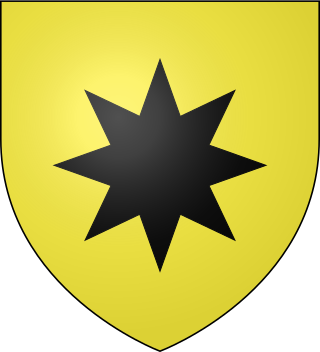
Count Josias I of Waldeck-Eisenberg, German: Josias I. Graf von Waldeck-Eisenberg, was since 1578 Count of Waldeck-Eisenberg.

Year 1554 (MDLIV) was a common year starting on Monday of the Julian calendar.
Fakhr-al-Din II, Ottoman prince (d. 1635) births

Fakhr al-Din ibn Qurqumaz Ma'n, commonly known as Fakhr al-Din II or Fakhreddine II, was the paramount Druze emir of Mount Lebanon from the Ma'n dynasty, an Ottoman governor of Sidon-Beirut and Safed, and the strongman over much of the Levant from the 1620s to 1633. For uniting modern Lebanon's constituent parts and communities, especially the Druze and the Maronites, under a single authority for the first time in history, he is generally regarded as the country's founder. Although he ruled in the name of the Ottomans, he acted with considerable autonomy and developed close ties with European powers in defiance of the Ottoman imperial government.
Girolamo Fracastoro, Italian physician (b. 1478) deaths

Girolamo Fracastoro was an Italian physician, poet, and scholar in mathematics, geography and astronomy. Fracastoro subscribed to the philosophy of atomism, and rejected appeals to hidden causes in scientific investigation. His studies of the mode of syphilis transmission are an early example of epidemiology.
Jacopo Sannazaro, Italian poet (b. 1458) deaths

Jacopo Sannazaro was an Italian poet, humanist and epigrammist from Naples.
Matthew Parker, English archbishop (d. 1575) births
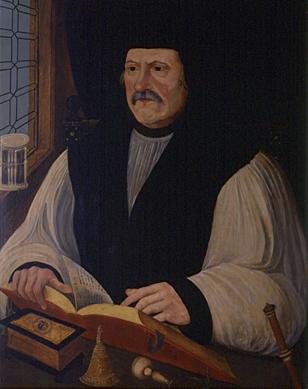
Matthew Parker was an English bishop. He was the Archbishop of Canterbury in the Church of England from 1559 until his death in 1575. He was also an influential theologian and arguably the co-founder of a distinctive tradition of Anglican theological thought.
Pope Callixtus III (b. 1378) deaths

Pope Callixtus III, born Alfonso de Borgia, was head of the Catholic Church and ruler of the Papal States from 8 April 1455 to his death in August 1458. Borgia spent his early career as a professor of law at the University of Lleida; he later served as a diplomat for the kings of Aragon. He became a tutor for King Alfonso V's illegitimate son Ferdinand. After arranging a reconciliation between Alfonso and Pope Martin V, Borgia was made Bishop of Valencia. In 1444, Pope Eugene IV named him a cardinal, and Borgia became a member of the Roman Curia. During the siege of Belgrade (1456), Callixtus initiated the custom that bells be rung at midday to remind the faithful to pray for the crusaders. The tradition of the Angelus noon bell still exists in most Catholic Churches to this day. He was also responsible for the retrial of Joan of Arc that saw her vindicated. He appointed two nephews as cardinals, one of whom became Pope Alexander VI. He is the last pope to date to take on the pontifical name "Callixtus".
Ladislaus of Naples (b. 1377) deaths

Ladislaus the Magnanimous was King of Naples from 1386 until his death and an unsuccessful claimant to the kingdoms of Hungary and Croatia. Ladislaus was a skilled political and military leader, protector and controller of Pope Innocent VII; however, he earned a bad reputation concerning his personal life. He profited from disorder throughout Italy to greatly expand his kingdom and his power, appropriating much of the Papal States to his own use. He was the last male of the Capetian House of Anjou.
Margherita of Durazzo, Queen consort of Charles III of Naples (b. 1347) deaths
Margaret of Durazzo was Queen of Naples and Hungary and Princess of Achaea as the spouse of Charles III of Naples. She was regent of Naples from 1386 until 1393 during the minority of her son Ladislaus of Naples.
Francesco I of Lesbos deaths

Francesco I Gattilusio was the first member of the Gattilusio family to rule the Aegean island of Lesbos as a vassal of the Byzantine emperor.
Stephen V of Hungary (b. 1239) deaths

Stephen V was King of Hungary and Croatia between 1270 and 1272, and Duke of Styria from 1258 to 1260. He was the oldest son of King Béla IV and Maria Laskarina. King Béla had his son crowned king at the age of six and appointed him Duke of Slavonia. Still a child, Stephen married Elizabeth, a daughter of a chieftain of the Cumans whom his father settled in the Great Hungarian Plain.
Saint Dominic, Spanish priest, founded the Dominican Order (b. 1170) deaths

Saint Dominic, also known as Dominic de Guzmán, was a Castilian Catholic priest, mystic, the founder of the Dominican Order and is the patron saint of astronomers and natural scientists. He is alternatively called Dominic of Osma, Dominic of Caleruega, and Domingo Félix de Guzmán.

The Order of Preachers abbreviated OP, also known as the Dominicans, is a Catholic mendicant order of Pontifical Right for men founded in Toulouse, France, by the Spanish priest, saint and mystic Dominic of Caleruega. It was approved by Pope Honorius III via the papal bull Religiosam vitam on 22 December 1216. Members of the order, who are referred to as Dominicans, generally carry the letters OP after their names, standing for Ordinis Praedicatorum, meaning of the Order of Preachers. Membership in the order includes friars, nuns, active sisters, and lay or secular Dominicans. More recently there has been a growing number of associates of the religious sisters who are unrelated to the tertiaries.
Henry the Lion, Duke of Saxony and Bavaria (b. 1129) deaths

Henry the Lion was a member of the Welf dynasty who ruled as the duke of Saxony and Bavaria from 1142 and 1156, respectively, until 1180.
Emperor Go-Toba of Japan (d. 1239) births

Emperor Go-Toba was the 82nd emperor of Japan, according to the traditional order of succession. His reign spanned the years from 1183 through 1198.
Ramon Berenguer IV, Count of Barcelona (b. 1113) deaths

Ramon Berenguer IV, sometimes called the Saint, was the count of Barcelona who brought about the union of the County of Barcelona with the Kingdom of Aragon to form the Crown of Aragon.
Richard III, Duke of Normandy deaths

Richard III was the duke of Normandy who reigned from August 1026 to his death. His brief reign opened with a revolt by his brother.
Marwan II, Umayyad general and caliph (b. 688) deaths

Marwan ibn Muhammad ibn Marwan ibn al-Hakam, commonly known as Marwan II, was the fourteenth and last caliph of the Umayyad Caliphate, ruling from 744 until his death. His reign was dominated by a civil war, and he was the last Umayyad ruler to rule the united Caliphate before the Abbasid Revolution toppled the Umayyad dynasty.
Pope Hormisdas (b. 450) deaths
Pope Hormisdas was the bishop of Rome from 20 July 514 to his death. His papacy was dominated by the Acacian schism, started in 484 by Acacius of Constantinople's efforts to placate the Monophysites. His efforts to resolve this schism were successful, and on 28 March 519, the reunion between Constantinople and Rome was ratified in the cathedral of Constantinople before a large crowd.
Pope Sixtus II deaths

Pope Sixtus II, also written as Pope Xystus II, was bishop of Rome from 31 August 257 until his death on 6 August 258. He was martyred along with seven deacons, including Lawrence of Rome, during the persecution of Christians by the Emperor Valerian.
Blessed Anna Maria Rubatto Blessed Anna Maria Rubatto

Anna Maria Rubatto was an Italian Roman Catholic nun who assumed the name of Maria Francesca.
Blessed Anna Maria Rubatto Hormisdas
Pope Hormisdas was the bishop of Rome from 20 July 514 to his death. His papacy was dominated by the Acacian schism, started in 484 by Acacius of Constantinople's efforts to placate the Monophysites. His efforts to resolve this schism were successful, and on 28 March 519, the reunion between Constantinople and Rome was ratified in the cathedral of Constantinople before a large crowd.
Blessed Anna Maria Rubatto Justus and Pastor

Justus and Pastor, venerated as Christian martyrs, were two schoolboy brothers who were killed for their faith during the Diocletian persecutions. The boys are today considered the patron saints of Alcalá. They are mentioned by Prudentius.
Blessed Anna Maria Rubatto August 6 (Eastern Orthodox liturgics)

August 5 - Eastern Orthodox liturgical calendar - August 7
Sheikh Zayed bin Sultan Al Nahyan's Accession Day. (United Arab Emirates)

Sheikh Zayed bin Sultan Al Nahyan was an Emirati politician, statesman, and philanthropist who served as the first president of the United Arab Emirates (UAE) from 1971 until his death in 2004. He is credited as the founding father and the principal driving force behind the formation of the UAE, uniting seven emirates. He was also the ruler of Abu Dhabi from 1966 until his death.
An accession day is usually the anniversary of the date on which a monarch or executive takes office. The earliest records of accession celebrations date from the reign of Emperor Kanmu of Japan, and the custom is now observed in many nations.

The United Arab Emirates, or simply the Emirates, is a country in Western Asia. It is located at the eastern end of the Arabian Peninsula and shares borders with Oman and Saudi Arabia, while having maritime borders in the Persian Gulf with Qatar and Iran. Abu Dhabi is the nation's capital, while Dubai, the most populous city, is an international hub.
Independence Day (Bolivia), celebrates the independence of Bolivia from Spain in 1825.

Bolivia, officially the Plurinational State of Bolivia, is a landlocked country located in western-central South America. It is bordered by Brazil to the north and east, Paraguay to the southeast, Argentina to the south, Chile to the southwest and Peru to the west. The seat of government and executive capital is La Paz, while the constitutional capital is Sucre. The largest city and principal industrial center is Santa Cruz de la Sierra, located on the Llanos Orientales, a mostly flat region in the east of the country.
Independence Day (Jamaica), celebrates the independence of Jamaica from the United Kingdom in 1962.

The Independence Day of Jamaica is a national holiday celebrated in Jamaica. This holiday commemorates such an event, it is one of the most senior public holidays celebrated in Jamaica.

Jamaica is an island country situated in the Caribbean Sea. Spanning 10,990 square kilometres (4,240 sq mi) in area, it is the third-largest island of the Greater Antilles and the Caribbean. Jamaica lies about 145 kilometres (90 mi) south of Cuba, and 191 kilometres (119 mi) west of Hispaniola ; the British Overseas Territory of the Cayman Islands lies some 215 kilometres (134 mi) to the north-west.
Hiroshima Peace Memorial Ceremony (Hiroshima, Japan)

Hiroshima Peace Memorial Ceremony is an annual Japanese vigil.

Hiroshima is the capital of Hiroshima Prefecture in Japan. As of June 1, 2019, the city had an estimated population of 1,199,391. The gross domestic product (GDP) in Greater Hiroshima, Hiroshima Urban Employment Area, was US$61.3 billion as of 2010. Kazumi Matsui has been the city's mayor since April 2011.
Russian Railway Troops Day (Russia)

The following is the list of official public holidays recognized by the Government of Russia. On these days, government offices, embassies and some shops, are closed. If the date of observance falls on a weekend, the following Monday will be a day off in lieu of the holiday.

Russia, or the Russian Federation, is a transcontinental country spanning Eastern Europe and Northern Asia. It is the largest country in the world, with its internationally recognised territory covering 17,098,246 square kilometres (6,601,670 sq mi), and encompassing one-eighth of Earth's inhabitable landmass. Russia extends across eleven time zones and shares land boundaries with fourteen countries, more than any other country but China. It is the world's ninth-most populous country and Europe's most populous country, with a population of 146 million people. The country's capital and largest city is Moscow, the largest city entirely within Europe. Saint Petersburg is Russia's cultural centre and second-largest city. Other major urban areas include Novosibirsk, Yekaterinburg, Nizhny Novgorod, and Kazan.